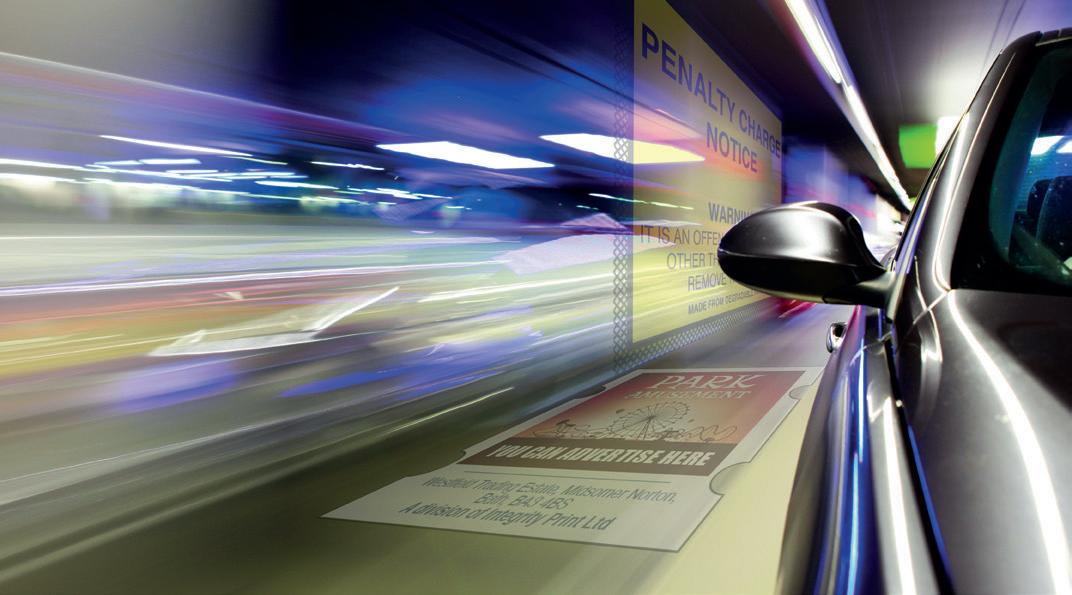

CIVEA’s Russell Hamblin-Boone says the enforcement sector plays a key role in delivering a civil society



Transport is an engine of change, but fuelling it requires money that is in short supply



CIVEA’s Russell Hamblin-Boone says the enforcement sector plays a key role in delivering a civil society



Transport is an engine of change, but fuelling it requires money that is in short supply
New government paints on a large canvas, but details are sketchy
Labour won a mandate to govern with an overwhelming majority in the general election. In theory, a landslide should give Sir Kier Starmer’s new government enormous room to manoeuvre and exercise its will in terms of making and implementing policy. However, given Labour’s adherence to restrictive fiscal rules, delivering ‘change’ may be harder than putting the word on the cover of a manifesto. The Treasury has been tasked with encouraging growth, with new chancellor Rachel Reeves championing looser planning restrictions and boosting housebuilding. But while making a case for investing in infrastructure, the chancellor has also made it clear there is a need to restrain spending. That is one of many dilemmas that Labour faces.
There is much talk of reforming the energy market, making it easier to build onshore windfarms and creating a more resilient grid, but there has been less emphasis on the ‘green’ benefits of decarbonisation. And Labour’s desire to centralise control on major planning decisions could lead to tensions as many communities seek to challenge energy and housing infrastructure projects.
On the plus side, there appears to be a recognition the electorate were motivated to vote for Labour in large part due to a disappointment in the Conservatives’ failure to ‘Level Up’ across the regions. This will see an emphasis on working with elected mayors, for whom transport is a major area of responsibility. Transport is an engine of change, driver of growth and key to decarbonising the economy, but transport also requires significant investment.
In truth, there are many questions to be answered. It is not yet clear what is Labour’s position on transport issues such as:
• New roads: These can be depicted as promoting growth, but even if this reasoning is followed, can Labour afford to finance major projects?
• Electric vehicles: Will Labour continue existing chargepoint grant funding?
• Air quality and emissions: What will be the new national position on lowemission zones (LEZs) and other clean air schemes?
• Active travel: Will Labour invest in walking and cycling, and where does it stand on contentious measures such as Low Traffic Neighbourhoods (LTNs)?
• Road safety: Will Labour support 20mph and other projects?
• Road pricing: Will Labour address the need for a post-fuel duty tax stream?
• Parking: Will Labour act on pavement parking, complete the regulation of parking on private land and tackle the problem of nuisance vehicles?
Labour’s manifesto was quite silent on these issues. We will be listening for what the new government has to say over the coming months.
Mark Moran Editor

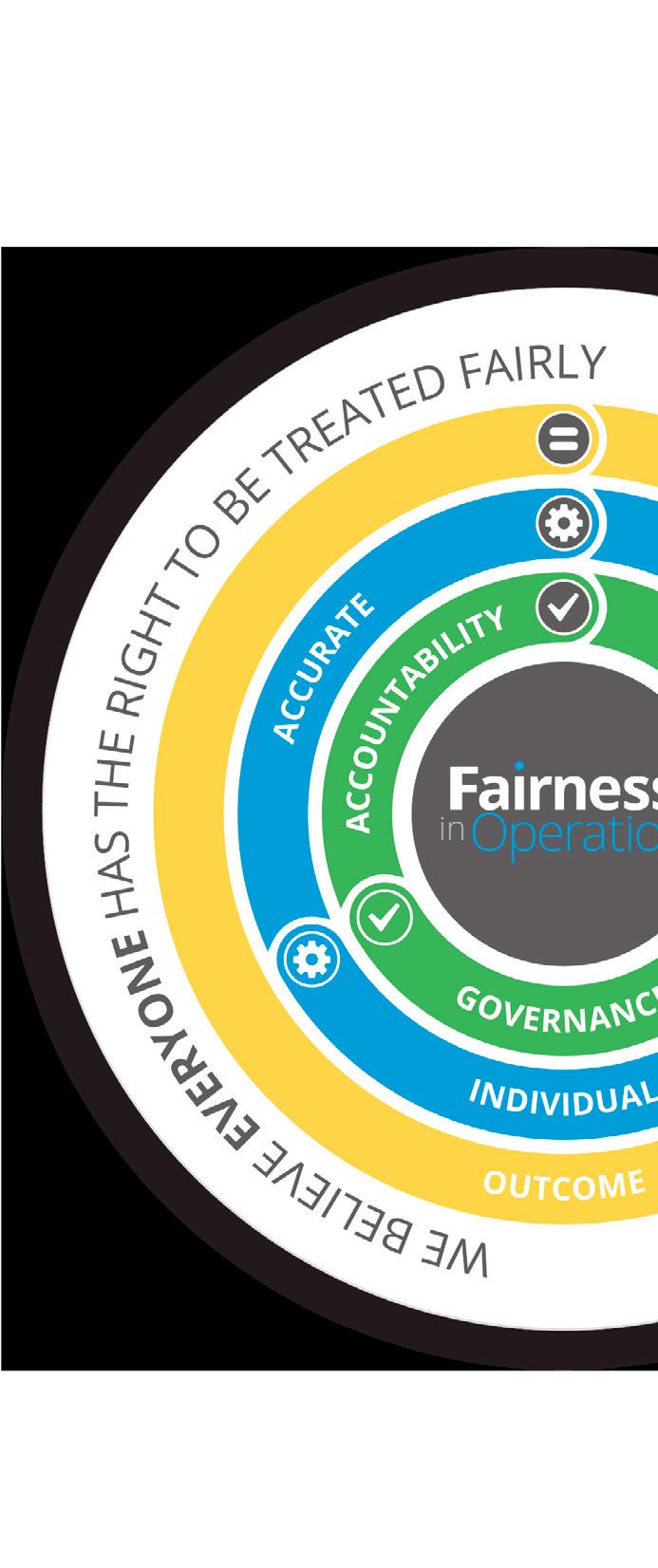
Our award-winning AI: Expertly handles your PCN calls and webchats. Increases payments. Reduces challenges.
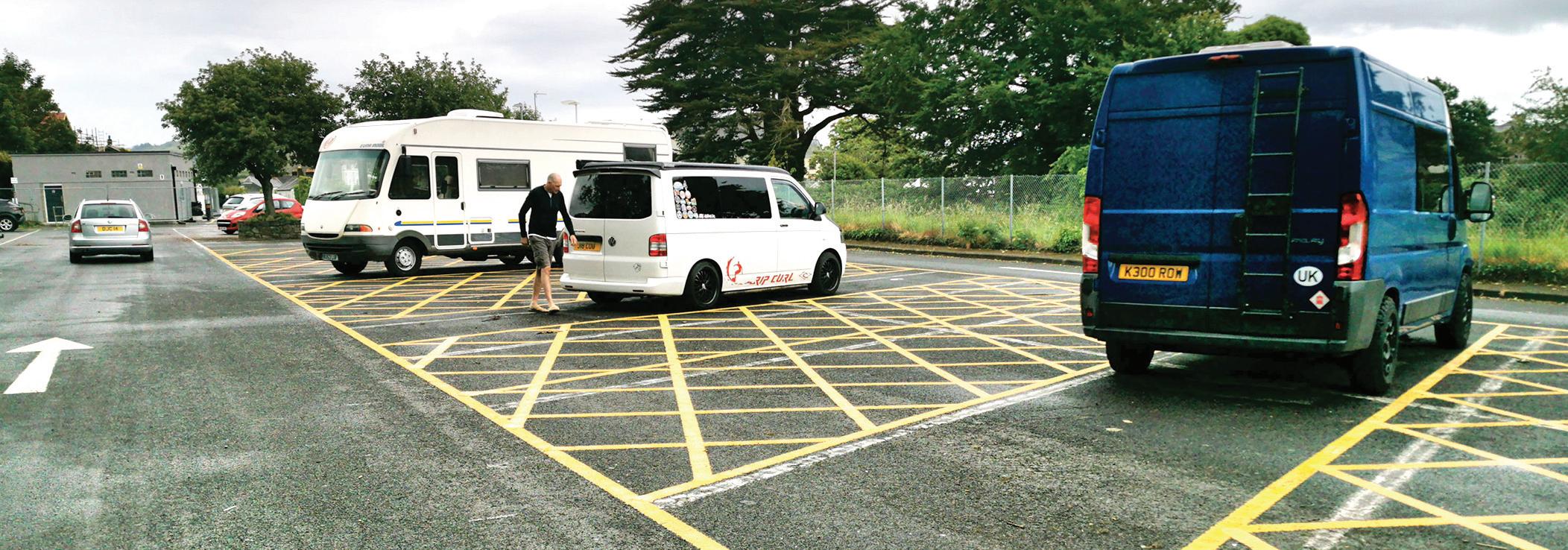

We celebrate the life of the late Penny Winder, founder of Alpha Parking and a pioneering advocate of skills development
Councils in England, Scotland and Wales are seeking ways to accommodate visiting motorhomes, reports Rhodri Clark
Traffic, parking and debt recovery specialists gathered to discuss the latest trends in policy, operations and technology
CIVEA’s Russell Hamblin-Boone says the enforcement sector is working to become more transparent and accountable
Lambeth Council’s Tom Gallagher reports on the positive impact of this year’s nationwide Blue Badge Day of Action
How Brighton & Hove City Council and the North Essex Parking Partnership won PATROL’s Driving Improvement Awards
News from the world of car park design and construction, including a focus on fighting fires and plans for new structures
New developments in electric vehicles, AI and robotics
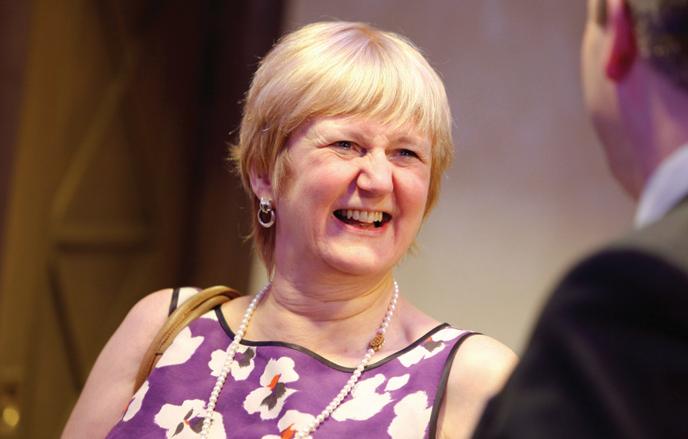



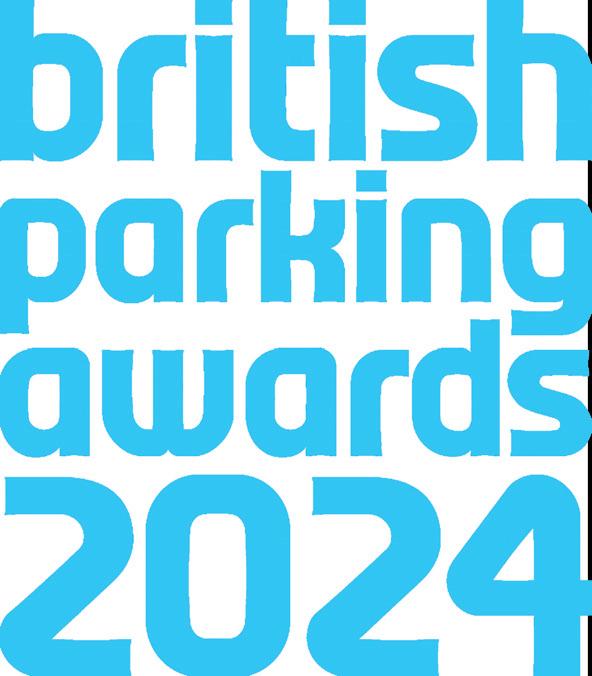



Improving public transport, liberalising the planning regime and devolving powers to regional leaders are key elements of the new Labour government’s strategy to improve living standards through economic growth.
Labour swept to power with a landslide on 4 July and set out a legislative programme in the King’s Speech delivered on 17 July. The speech set out almost 40 pieces of legislation that focus on growing the economy through improving transport, creating jobs, building houses, generating cleaner energy and delivering infrastructure without prolonged delays.
Prime minister Keir Starmer said: “Now is the time to take the brakes off Britain. For too long people have been held back, their paths determined by where they came from – not their talents and hard work. I am determined to create wealth for people up and down the country. It is the only way our country can progress, and my government is focussed on supporting that aspiration.”
The Department for Transport is now led by Louise Haigh, who will be steering bringing rail services into public ownership once their contracts expire or if operators fail to deliver on their commitments. The new government believes this approach will avoid taxpayers picking up the burden of paying compensation to train operators for taking services into public ownership.
Labour argues that transferring operations to the public sector will save the taxpayer millions of pounds currently paid out in fees to private operators each year. It will also end the fragmentation of the railways, establishing a more reliable rail service.
The government will also introduce legislation to establish a new public body, Great British Railways (GBR) which will be tasked with delivering simplified fares, discounts, and ticket types. Once established, the new body will work to ensure that
innovations such as automatic compensation, digital pay-as-yougo and digital season ticketing are rolled out across the network.
The King’s Speech also featured a Better Buses Bill that gives metro mayors powers to franchise local bus services and which lifts the restriction on new publicly owned bus operators. While transport has been identified as a way of boosting the economy, chancellor Rachel Reeves has set about cutting spending on some major infrastructure projects. The £1.7bn A303 Stonehenge tunnel and two other road and rail schemes have already been scrapped, and other transport projects will be reviewed.
Building more housing and infrastructure is central to the government’s mission to strengthen economic growth, which will be overseen by deputy prime minister Angela Rayner. A Planning Reform Bill will seek to speed up and streamline the planning process to build more homes of all tenures and accelerate the delivery of major infrastructure projects. The government will also introduce a bill to ensure a new National Wealth Fund worth £7.3bn will make “transformational investments’ across the UK.
As part of the government’s plans to empower local leaders to deliver change for their communities, the King’s Speech unveiled the English Devolution Bill. This will transfer power into local communities and recognising the role of local leaders by establishing local growth plans that bring economic benefit to communities and households across the country.
Energy secretary Ed Milliband will be overseeing a new bill will help set up Great British Energy, a publicly owned clean-power company. The government will introduce legislation that unlocks investment in energy infrastructure, supports sustainable aviation fuel production and strengthens the water regulator’s powers.
‘Move
get things done’
Chancellor Rachel Reeves sets out economic vision

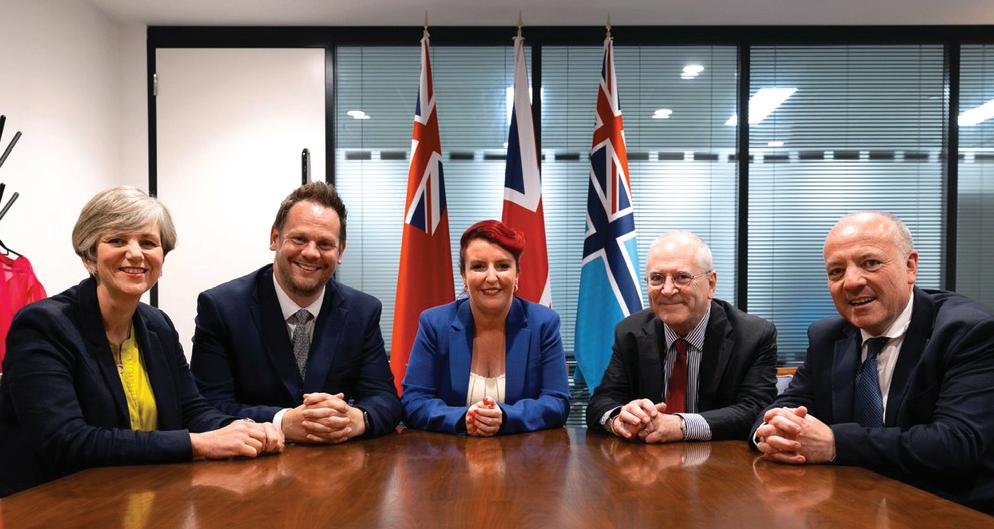
New transport secretary Louise Haigh’s team will focus on rail
Labour’s election landslide has seen it take power for the first time in 14 years. The new government has pledged to grow the economy, with improving the quality of transport across the UK identified as a priority. Louise Haigh has stepped up from holding the transport folio in the shadow cabinet to become transport secretary.
In her first day at work Haigh promised to overhaul transport. The new secretary of state convened officials to begin work at pace across the Department for Transport (DfT) on rail reform, devolution of bus powers, ensuring infrastructure works for the whole country and supporting local authorities to fix roads.
In her address to DfT staff on 8 July, Haigh said: “It will take all our effort but the new motto of our department – our purpose – is simple: move fast and fix things. Our department is so clearly central to achieving the missions for government that the prime minister has committed us to. Growth, net zero, opportunity, women and girls’ safety, health – none of these can be realised without transport as a key enabler.”
Haigh set out her five strategic priorities:
• improving performance on the railways and driving forward rail reform
• improving bus services and growing usage across the country
• transforming infrastructure to work for the whole country, promoting social mobility and tackling regional inequality
• delivering greener transport
• better integrating transport networks.
Labour’s new transport top bench features rail minister Lord Hendy of Richmond Hill CBE, who will bring decades of experience to help realise the government’s ambition of transforming infrastructure and improving public transport. The department’s other ministers include Lilian Greenwood (future roads minister), Simon Lightwood (local transport minister) and Mike Kane (aviation, maritime and security minister).
The former Conservative transport secretary Mark Harper is no longer in Parliament, having lost his seat in the Forest of Dean to Labour by a small margin. He had held the seat since 2005. Harper was appointed transport secretary in 2022 and oversaw the government’s Plan for Motorists, which sought to crackdown on Low Traffic Neighbourhoods, 20mph speed limits and bus lanes.
Another former transport secretary, Grant Shapps, also lost his seat to Labour in Welwyn Hatfield. He had been MP in the constituency since 2005, and led the DfT from 2019 until 2022. During his tenure, Shapps introduced a range of active travel strategies in response to the COVID-19 pandemic.
Also gone is the phrase “levelling up”, which has been erased from the new government’s vocabulary. The Department for Levelling Up, Housing & Communities, created by Boris Johnson in 2021, is reverting to being the Ministry of Housing, Communities & Local Government, which is now led by Labour’s deputy prime minister Angela Rayner.
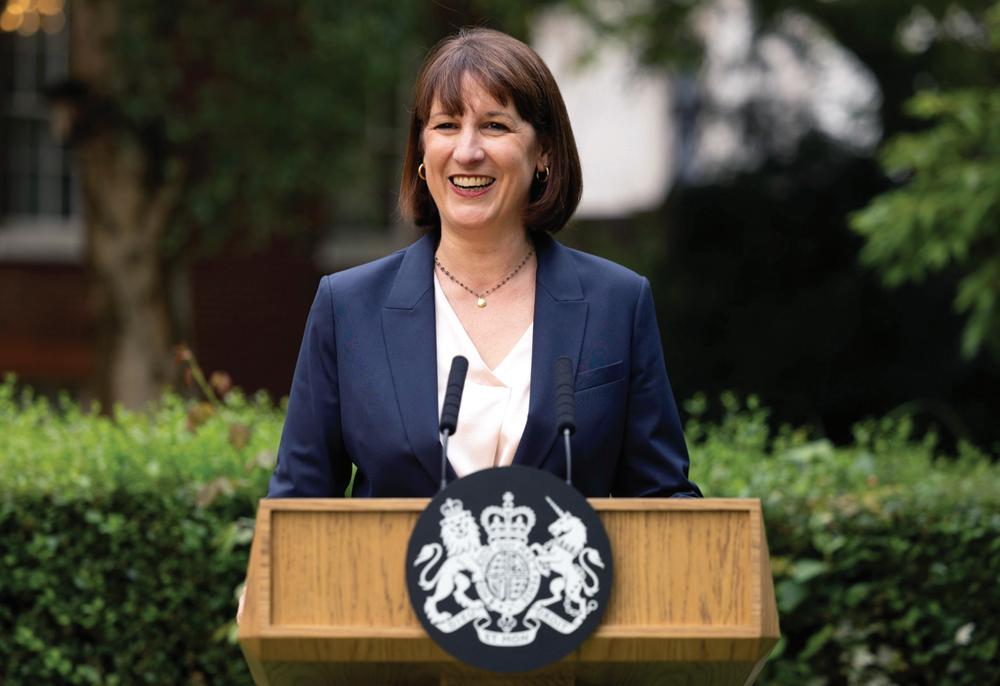

New chancellor Rachel Reeves has set out Labour’s plans for achieving sustained economic growth by making decisions on stalled infrastructure projects and introducing major planning reforms. In her first speech at the Treasury, delivered in front of business leaders, she set our her plans alongside deputy prime minister Angela Rayner and secretary for energy Ed Miliband. The chancellor envisages a new era of partnership working with the private sector and promised to grow the economy with low taxes, inflation and mortgages and growing tax revenues to sustain public services.
The current planning regime acts as a major brake on economic growth. Reeves said: “Our antiquated planning system leaves too many important projects getting tied up in years and years of red tape before shovels ever get into the ground.”
The government will set out new policy intentions for critical infrastructure ahead of updating relevant National Policy Statements within the next 12 months to provide certainty to industry. It will also legislate to ensure these statements are updated at least every five years.
Reeves said the transport and energy secretaries will be asked to prioritise decisions on infrastructure projects that have been sitting unresolved. The government will also build on the Strategic Spatial Energy Plan being developed by the National Energy System Operator to speed up the roll-out of clean power and will seek to expand the use of spatial planning to other infrastructure sectors.
Reeves said the government would review how it can unlock critical infrastructure without weakening environment protections.
The chancellor welcomed the deputy prime minister’s commitment to make the economic benefit of development a central consideration when intervening in the planning system.
Angela Rayner will write to local mayors and the Office for Investment to ensure that any investment opportunity with important planning considerations that comes across their desks was brought to both the deputy prime minister’s and the chancellor’s attention.
Confirming plans to build 1.5 million homes over the next five years, Rayner said: “The chancellor and I will work in lockstep to kickstart the economy, unleashing housebuilding and powering local growth. We will unblock the bottlenecks and drive forward a transformational package to build the homes people need.”


The use of loading bays for shops and other commercial outlets to load and unload goods has always been fraught with misuse, overstays and duplicated demand, but a new solution being trialled in London spells a more efficient future, as Toby Hiles explains
Almost every high street in the country has them, but there’s always a nagging sense that they don’t work as well as they could do. We’re talking about Loading Bays, the places for businesses to receive deliveries and for goods from their premises to be collected.
Because these tend to also be places where people ignore the rules. They’re where drivers are seen to stop to quickly nip into a shop, or people use as a place to unload the children, as some sort of drop-off zone, despite there usually being ample parking for them nearby. And, when too many delivery vehicles turn up at the same time, there’s a Wild West-style free-for-all for spaces with vehicles causing congestion as they wait in the main carriageway to get their turn, or circle around the neighbourhood until a space becomes available.
A new digital solution from British software solutions company Grid Smarter Cities is changing this. The company’s Kerb® solution is being trialled for 18 months on Walworth Road in the London Borough of Southwark. The technology enables kerbside loading bay restrictions to be easily understood and recreated on an app, and for the first time, allows freight drivers to book their kerbside loading slots in advance. This allows them to deliver goods and services to the right place
“We’re proud to have introduced London’s first kerbside management scheme. This practical solution will help ensure smoother operations for delivery drivers and shoppers while supporting local businesses.”
Cllr James McAsh, Cabinet Member for the Climate Emergency, Clean Air and Streets, London Borough of Southwark
at the right time – improving delivery certainty and reducing the risk of PCN penalties. Southwark has embraced the idea as part of its Streets for People strategy – a commitment to improve residents’ quality of life and take action on climate change, by changing how people travel and use streets in the borough. Among other things, the strategy commits to deliver cleaner air and safer and quieter streets with less traffic and fewer accidents, while supporting healthier travel options like walking, cycling or wheeling. By better managing the kerbside and reducing congestions caused by freight deliveries, Southwark can go a long way to delivering these aims, reducing congestion and improving safety by providing dedicated areas and timeslots where and when operators need them.
The Kerb® platform works by letting delivery drivers book a slot in a loading bay.
They simply go on the app, register their vehicle and book. When they arrive, the space is waiting and they can pull straight in –no more loitering in the carriageway or circling the roads. Grid Smarter Cities has even developed a two-sided e-ink digital sign to go on the kerbside which integrates with the platform to display the booked vehicle’s details – its number plate and time slot.
“We’ve had some great successes so far,” comments Mark Palmer, Parking Quality and Policy Manager at Southwark Council. He points to Tesco embracing the idea and using it for their multiple deliveries every week.
“Tesco HGV drivers need to access a specific bay at particular times of the day,” he explained. “Previously, if the bay was in use, Tesco drivers had to stack their trucks further away, preventing them from fulfilling deliveries. Now, drivers can pre-book bays up to a year in advance, ensuring they have a designated parking spot whenever they need”.
That model then replicates itself across all the other users on Walworth Road with companies encouraged to sign up to the Kerb® platform through leafletting, signage and one-to-one visits from Grid Smarter Cities staff. A pharmacy on the road, used to couriers delivering several times a day, is now getting its vital medication delivered efficiently, while other companies along the Walworth Road are seeing the benefits of deliveries
pulling straight into a bay at a pre-arranged time and want to get involved as well.
“The scheme is starting to build its own momentum. We are now receiving inquiries from shops in the immediate vicinity who did not initially sign up to the app” comments Mark.
In the early days of the scheme, vehicles who used the bay without pre-booking were not fined but simply got a letter informing them of the scheme and why they needed to use it. “We sent warning notices before issuing PCNs” Mark comments. “The next step has been in adapting the existing ‘rogue vehicle’ button on the app. This already directs a driver to an alternative location if somebody is in their booked space. Now Civil Enforcement Officers receive real time alerts of contravening vehicles and locations on their handhelds, providing data to enable greater targeted enforcement and network management efficiency.”
Despite being a brand new solution, the success is already being felt. Utilisation of the bays’ booking slots is running at at 60% on weekdays, which is ahead of what was expected by Grid Smarter Cities or the council. They both expect this to increase as word spreads and other businesses on Walworth Road see the convenience and efficiency of booking a loading slot.
“What we’re really doing is changing people’s whole mindset here,” comments Grid Smarter Cities’ Commercial Development Manager Laura Jacklin. “It’s not just us asking delivery companies to please comply with parking, or threatening them with a fine if they don’t use our system – it’s about the efficient use of a very, very busy high street and offering an effective solution that works for them. In turn improving the lives of all users of the area. Positive behaviour change then becomes an ingrained habit benefitting everybody.”
The Kerb® platform can be used to flex between different uses of the kerbside by times of day. Because the platform is bookable, deliveries could be limited to just the daytime, so that in the evenings the loading bay can be repurposed as a space for tables and chairs to let restaurants and cafes have al fresco dining.
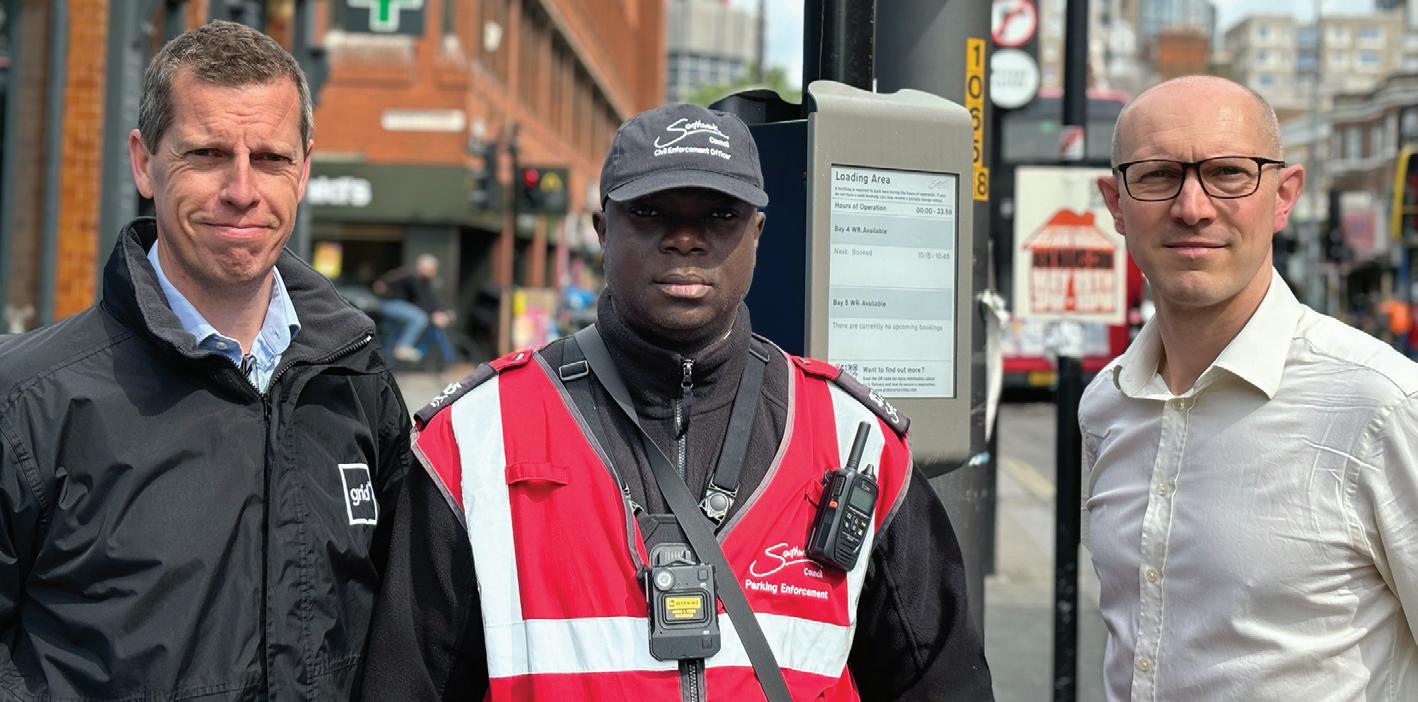
“The council’s view is that pavements should be for pedestrians,” Mark explains. “Ideally, I’d love to see a system where bookable loading bays were managed by lights embedded in the pavement. When the lights are off, the bay markings would be invisible, allowing pedestrians to safely use the full width of the pavement. When the lights are on, pedestrians would be automatically redirected and warned about vehicles loading in the bay. I imagine these lights being linked to the Kerb® app and the geo-coordinates of the loading vehicle”.
“We embrace and support the pioneering position of Southwark and other forwardthinking councils in embracing digital innovation to transform the high streets and cities of the future,” added Grid Smarter Cities CEO Neil Herron. “The freight servicing and delivery sector is going to enable this delivery at scale and the digital revolution set to transform cities taking the kerb from a ‘first come first served’ piece of city infrastructure into a flexible, dynamic bookable, optimisable and monetisable city asset delivering significant impacts for last mile logistics and beneficial environmental and societal outcomes for cities.”
Elected members of the Council are also backing the solution, with Mark explaining that: “The scheme is supported by all corners of the council. The cabinet member for environment sees the value of the bookable bays as it aligns with the council’s ambition to create cleaner, greener and safer streets.”
Councillor James McAsh, Cabinet Member
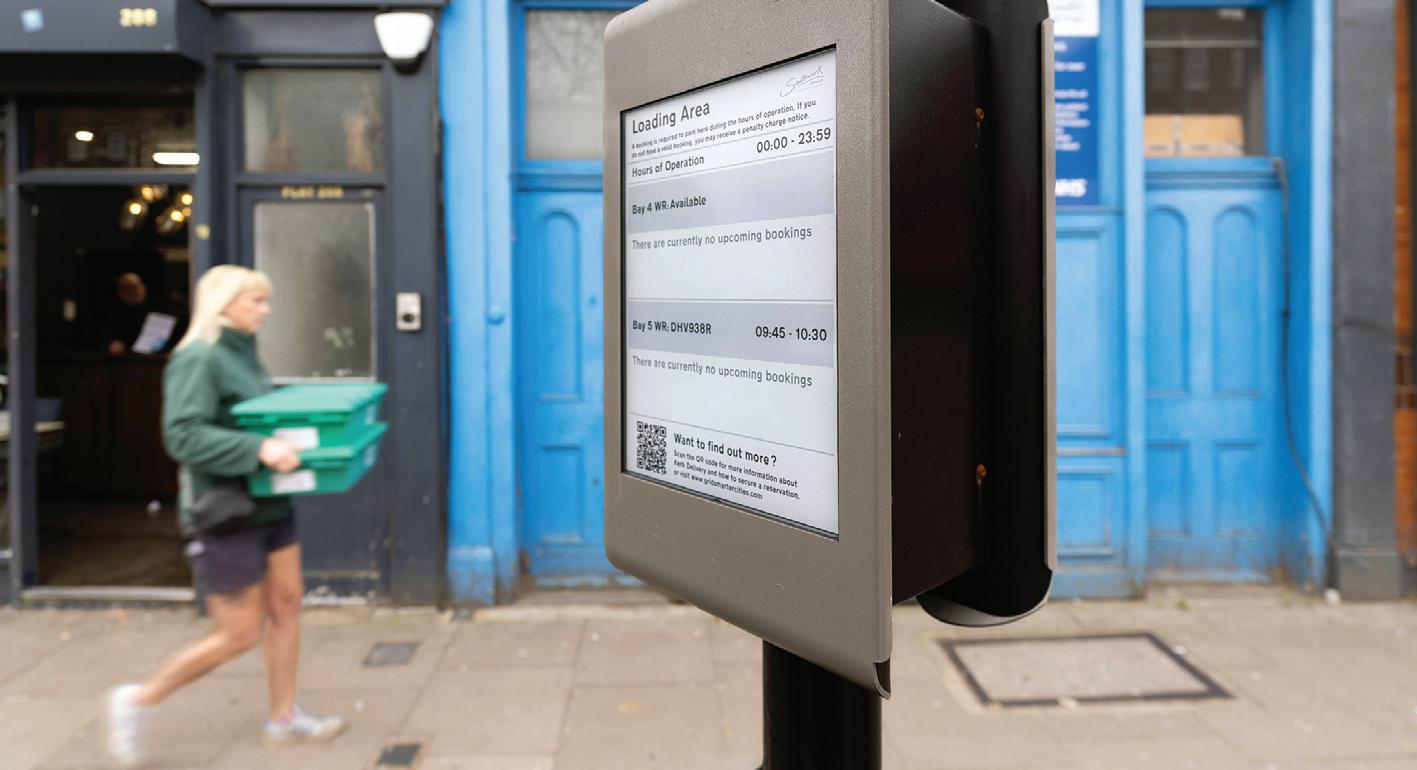
for the Climate Emergency, Clean Air and Streets, said: “We’re proud to have introduced London’s first kerbside management scheme. The bookable loading bays on Walworth Road help tackle congestion and improve traffic management, a key tenet of our Streets for People strategy. This practical solution will help ensure smoother operations for delivery drivers and shoppers while supporting local businesses. This is an important step towards a greener borough.”
And Mark Palmer has advice for other councils who wonder if the solution is for them or not. He explains, “If you have a location with high levels of non-compliance, just give it a go. It’s still early days, but we are seeing bookings increase week-on-week and the number of PCNs issued is reducing. This indicates that motorists and shop keepers are slowly embracing the innovation and in terms of kerbside management, that’s a huge success.”
Toby Hiles is Strategic Partnerships Director at Grid Smarter Cities toby.hiles@gridsmartercities.com
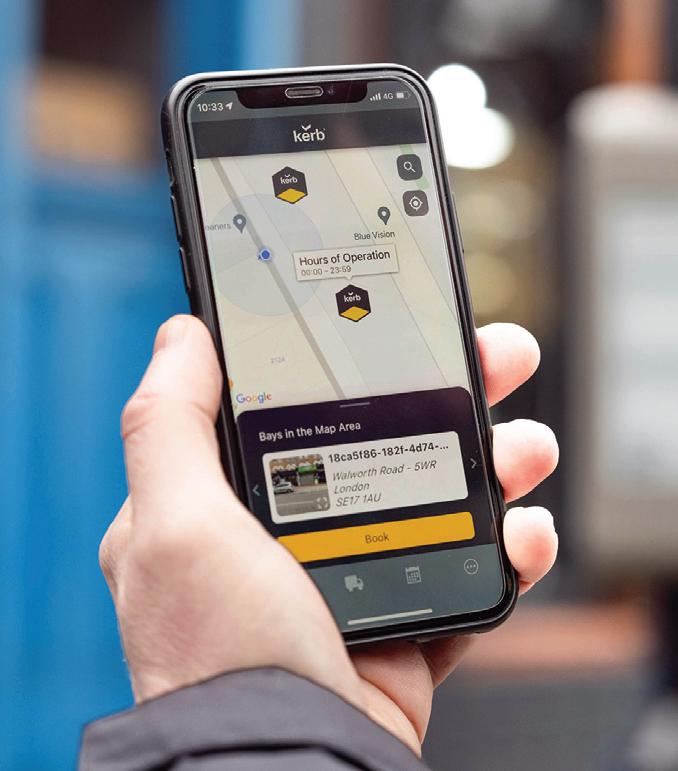
Anew code of practice has been published for providers of parking on private land by the two trade associations serving the sector. The British Parking Association (BPA) and the International Parking Community (IPC) have agreed a single code of practice to be used across the entire private parking sector.
The trade bodies say the new single code, which supersedes their previously separate codes, will raise standards and deliver greater transparency and consistency for the benefit of motorists.
The new sector single code:
• introduces an Appeals Charter, creating clear parameters for motorists to appeal against a parking charge
• mandates a 10-minute grace period for motorists
• provides consistent rules for private parking operators
• requires clear signage to help motorists navigate parking on private land
• ensures the protection of the most vulnerable in society, with no decrease to the deterrent for abuse of Blue Badge bays or those who choose to park selfishly, putting their own convenience above the needs or rights of others
• maintains a cap on the parking charge at £100 reduced to £60 if paid within 14 days.
Private parking operators will have to implement the new single code by 1 October 2024 with all existing sites needing to be updated by December 2026.
Andrew Pester, BPA chief executive said: “We are delighted to release a single sector code across our private parking sector. This is a key milestone as we work closely with government, consumer bodies and others to deliver fairer and more consistent parking standards for motorists. We will continue to push for a positive outcome for all.”
Will Hurley, IPC chief executive officer said: “This new code will create positive change across the UK, enhancing the protection of the most vulnerable in society, whilst creating consistency and clarity for motorists and continuing to elevate standards across the sector.”
Both the BPA and IPC are trade associations accredited by the DVLA to run schemes that enable member companies to obtain vehicle keeper data in order to collect unpaid parking charge notices issued on private land. This procedure was set up when the use of wheel clamping on private land was banned under the Protection of Freedoms Act 2012.
Until now the BPA and IPC’s approved operator schemes have had separate codes of conduct. Their new code sees a greater degree of harmonisation in areas such as the sanctions that each association will impose on member operators for breaches of the code, up to the loss of access to
June 2024 The Code is published
1st October 2024
1st October 2024
01 October 2024
01 October 2024
31 December 2026
All new sites must be compliant with the Code requirements relating to controlled land
All aspects of the Code must be complied with except signage or other related clauses applicable to existing sites
All new self-ticketers must be registered with their ATA
All reporting obligations in clause 17 must be complied with
All aspects of the Code must be complied with for all sites
British Parking Association and International Parking Community publish a unified approach to regulating private land
DVLA data.
The trade associations currently provide separate adjudication services for drivers who want to lodge an appeal against a parking charge. These services will remain separate under the sector code.
A Private Members Bill, proposed by Sir Greg Knight MP, that enabled the introduction of a legislation-backed code of conduct gained cross-party and support and received Royal Assent in March 2019.





The government drew up a code that included halving the cap on tickets for most parking offences to £50 and created a single appeals system. However, this code was withdrawn by in June 2022 following a legal challenge by parking companies.
The revised government code was set to be put out for consultation at the end of May. However, former Conservative prime minister Rishi Sunak’s decision to call a general election means consultation on the new code has been postponed. A footnote: helping the Parking (Code of Practice) Bill progress through Parliament was a process overseen by Sunak when he was a local government minister.
The parking associations say their unified code has been drafted to reflect the positive aspects of the government code, so that the sector will be prepared for the re-emergence of the government version at a future. However, motoring organisations argue the parking sector should not be left to self-regulate as this does not deliver the controls envisaged.
AA head of roads policy Jack Cousens said: “It’s somewhat ironic that after pushing so hard against adopting a code,
the two bodies have decided to implement their own. This watered down code of practice falls far short of the standards the AA, government and consumer groups have called for across many years. This selfauthored code doesn’t acknowledge the need to cap charges and remove debt recovery fees. These elements are desperately needed from a governmentbacked code to protect innocent drivers from the sharks running private car parks.”
RAC head of policy Simon Williams was equally critical of the sector code, stating: “Drivers shouldn’t be fooled into thinking this so-called code developed by the private parking industry itself is the same as the long-delayed official private parking code of practice that is backed by legislation. This, and only this, will bring an end to the worst practices of some private parking operators and mean drivers – especially those who are vulnerable – are protected from unreasonable fines and debt collectors chasing down payments.”
The parking sector and motorists are now awaiting what the new Labour government will do in terms of progressing the government’s code.
Kim Leadbeater MP, Labour MP for Spa Valley, asked whether the secretary of state for housing, communities and local government would be publishing a statutory code under the Parking (Code of Practice) Act 2018.
Local government minister Alex Norris replied: “We will set out policies on the Parking Code of Practice in due course.”
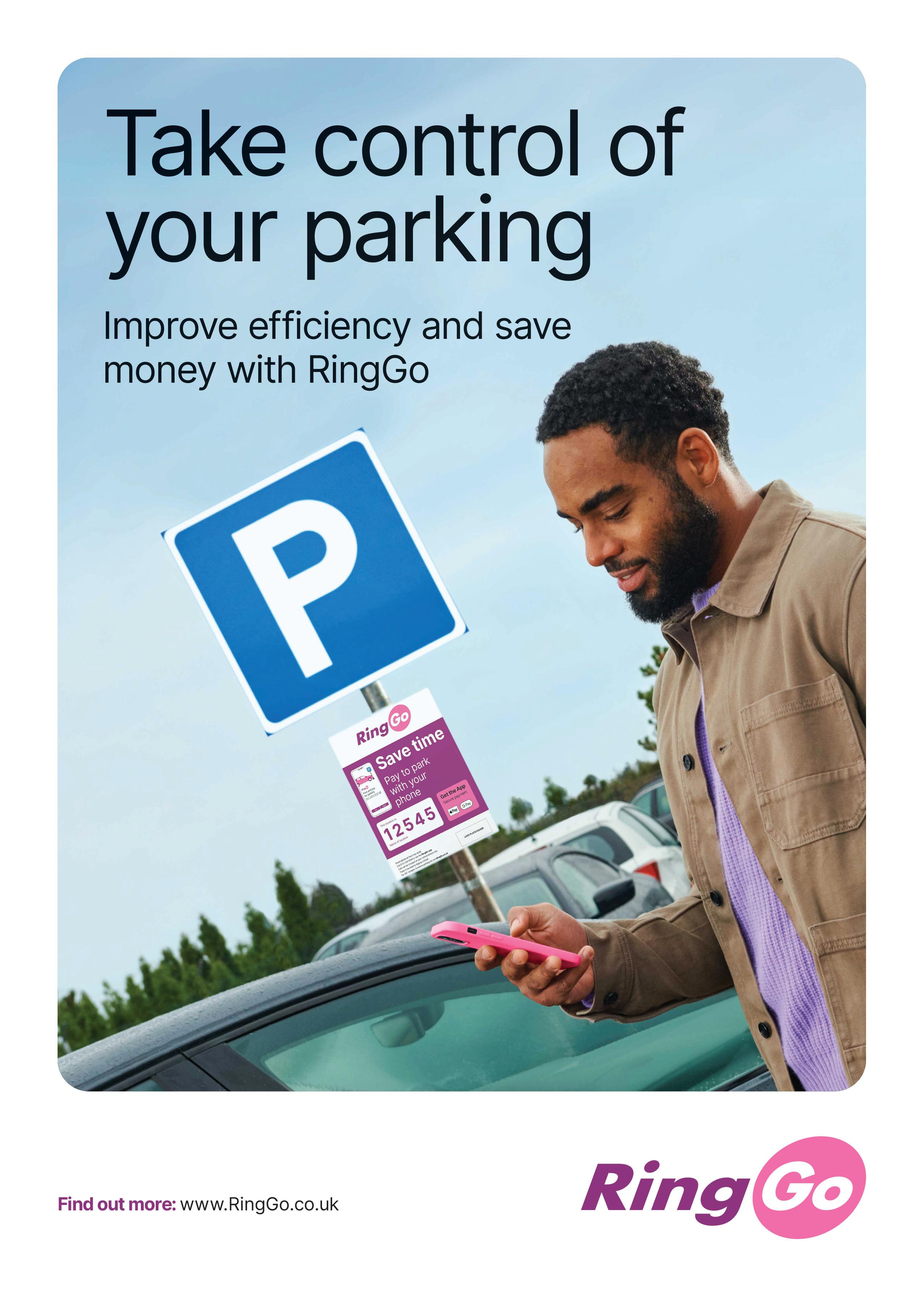
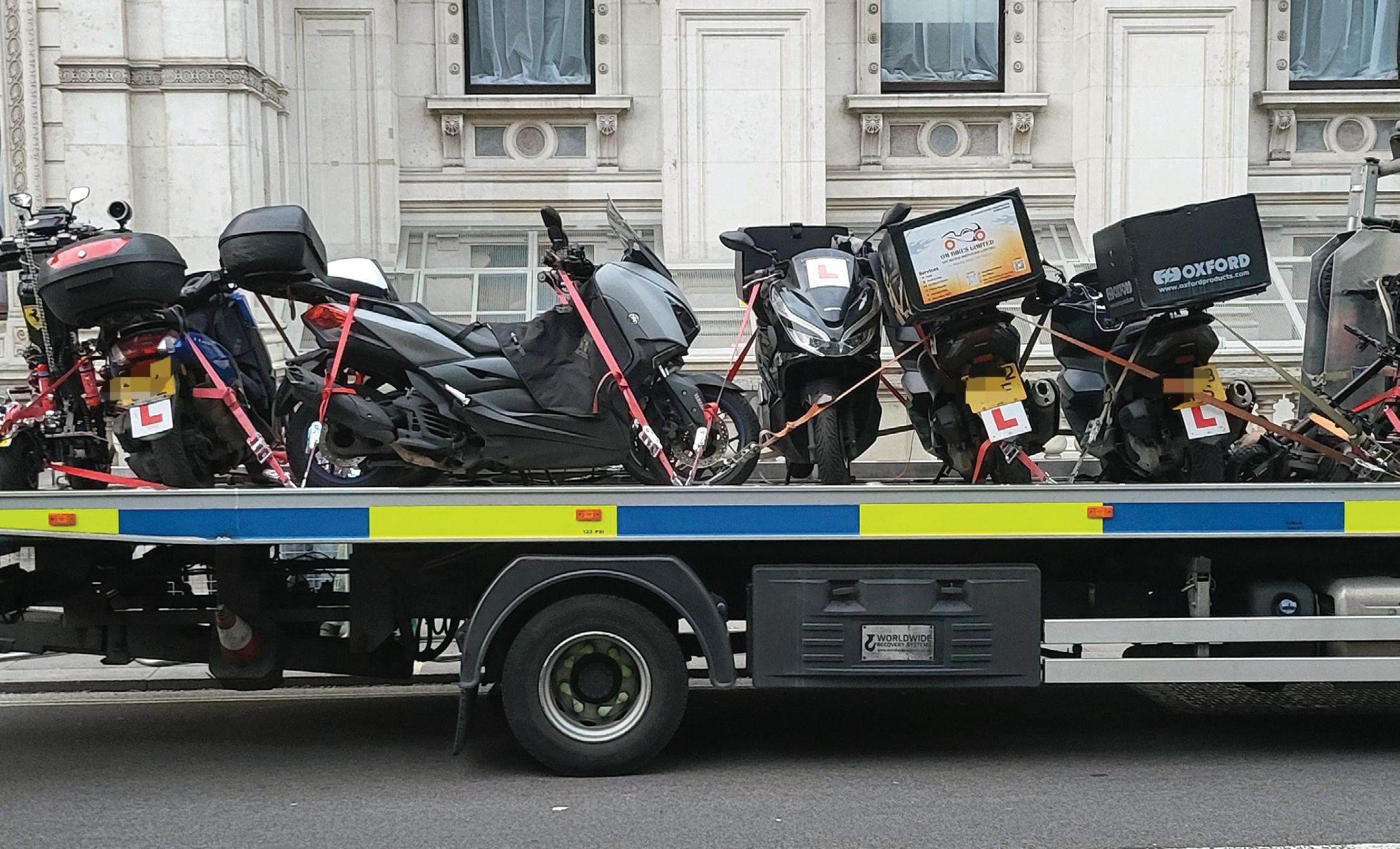

Metropolitan Police supports city council’s crackdown on anti-social activity on its streets
Asupercar was seized for anti-social driving in Parliament Square during a crack down on antisocial activities. In July Westminster City Council and the Metropolitan Police Special Constabulary conducted a day of action targeting unlicensed and uninsured vehicles, street hawkers and cyclists jumping red lights.
The £250,000 supercar – a Mosler Trenne model with 190pm top speed –was spotted revving its engine while being filmed by a member of the public. When questioned the driver could not provide a foreign driving licence at the roadside, so the vehicle was seized.
Another vehicle confiscated by the police was an e-scooter with custom paint job and skull decorations which the driver claimed cost him £15,000 to make. This was being ridden without insurance and illegally on a public road.
The scooter and supercar were part of 47 vehicles seized for having no insurance. They came to light as the joint operation stopped more than 500 vehicles, including e-scooters and bikes. Officers also made 11 arrests for various offences and issued 17 fixed penalty notices to cyclists going through red traffic lights.
The combined team of council and
police officers spent 24 hours in the West End tackling offences ranging from antisocial behaviour to illegal peddling of goods, as well as providing high visibility reassurance and community safety advice in relation to phone thefts.
City council officers used powers under unlicensed street trading to disrupt unlicensed sales on Westminster Bridge. Actions taken included:
• seizing a camera and iPad from two photographers selling photos to the public
• equipment taken from three hot dog sellers and two peanut vendors for selling without a licence
• requiring unlicensed ice cream sellers to move on.
The operation also issued written warnings to unlicensed buskers in Wardour Street and Leicester Square and stopped a pedicab for playing amplified music at Cambridge Circus. Details of four pedicab riders were taken at Hyde Park Lane and Park Lane for playing music excessively loud.
While officers targeted unlicensed and

illegal activity, they also helped one school trip to London – with police officers looking after four lost children who had become separated from their guide on a visit. Police contacted the school and the children remained safely at New Scotland Yard until their guide arrived to collect them.
Cllr Paul Dimoldenberg, cabinet member for city management and air quality, said: “People who live in Westminster and who visit every day have a right to walk our streets in safety –knowing they are not likely to be hit by a vehicle with no insurance or buy an unsafe or an illegal product from street traders. Carelessly ridden and parked escooters are a particular source of complaint to us, and the summer syndrome of supercars thrashing their engines is also a tradition we can do without. Working with our police partners, this operation sends a strong signal that Westminster’s streets are not a free-for-all unlicensed and anti-social activity.”
Metropolitan Police Special Inspector Geoff Tatman added: “This hugely successful operation is testament to the hard work and dedication of the Met Special constables that play a vital role in our mission to make London safer and kindly give up their free time help serve the community. The Met has positively and effectively partnered with Westminster Council and other local partners, to deal with offenders and crackdown on illegal activities that concern Londoners the most.”

Phone and in-store payments become the norm as pay & display option withdrawn
Croydon Council has withdrawn on-street pay & display machines because they operate on the 3G mobile phone network. 3G is being shut down across the country, meaning the machines are becoming increasingly expensive to maintain and replace.
Residents and visitors of the south London borough are being encouraged to use the RingGo phone system. Where free parking periods apply these will still be available through the app.
The council said it understands that change can be difficult. In an effort to make the transition to phone parking as smooth as possible it has introduced a five-minute grace period to allow people time for organising parking sessions.
While the council does not charge for using RingGo, some default settings may mean that people will pay a fee to RingGo for reminders. However, these notifications can be disabled in the app’s settings.
For residents or visitors who do not have a smartphone, parking sessions can also be booked by phone. Residents who prefer to make cash or card payments in person can pay at any shop that offers PayPoint. When using PayPoint, there is no need to return to the vehicle as the ses-

sion will automatically start.
Cllr Jason Perry, executive mayor for Croydon, said: “With the pay & display parking machines being switched off, we are making every effort to ensure that the transition to mobile payment parking is as smooth as possible.
“We have listened to the issues raised through pilot schemes and are looking to reduce the impact of change wherever possible. As a result, a PayPoint option for those who prefer to make cash or card payments, may be available at any shop that offers PayPoint.
“Mobile payment for parking should make the system easier and more convenient to use for residents and visitors.”
In parallel, charges for parking permits and on-street parking

have been revised with the aim of making them simpler and more consistent.
The updated parking charges have been designed to encourage lower emission vehicles and to help address air quality and public health objectives. They are also intended to improve access to amenities to serve local shoppers and the economies of the district and local centres.
The new charging policy will see shoppers benefit from one hour’s free parking at district and local centres. The maximum stay has increased to two hours, with reduced fees for the second hour, encouraging residents to enjoy more time at their local shops. The ‘no return’ period at all on-street parking spaces will be standardised to two hours.
Other changes include reduc-
Blue Badge fraud in the West Midlands is being targeted by a special unit set up by Sandwell Council and its enforcement contractor APCOA.
Sandwell’s Blue Badge Misuse Initiative Team is a joint initiative between the councils’ counter fraud unit, APCOA’s parking enforcement team and legal services. It has implemented a scheme to target Blue Badge misuse that has resulted in increased prosecutions and community awareness, protecting vulnerable residents.
In the last 12 months the unit has undertaken 10 successful prosecutions, alongside issuing 18 warning letters and cancelling a suspected false application.
The work done by Sandwell Council and APCOA to counter Blue Badge fraud have been recognised at a national awards ceremony.
Sandwell and APCOA were winners of the Partnership Award at the ALARM Risk Awards 2024, which celebrate

ing parking charges in West Croydon Station car park and reducing the charges for longer stays in areas with 12-hour maximum on-street bays.
The new charges recognise the environmental impacts of vehicles, and retain the emission-based parking charges for on-street parking. With the changing vehicle fleet since 2019, the uptake of electric vehicles has increased and as such the council has reviewed the discount offer for this vehicle type.
The council says the revised discount offer now more fairly reflects the vehicles parking on the borough’s streets, while not penalising less efficient vehicles that are often used by those that are less likely to be able to upgrade their vehicle.
Mayor Perry said: “We have updated our parking charges policy to make it fairer, simpler and more consistent across Croydon, while helping our high streets to thrive. Residents will benefit from one-hour free parking at all district centres, which we hope will encourage more visits to our local shops.
“Changes to our emissionsbased parking charges aim to bring Croydon more in line with the rest of London. The disproportionate 90% discount we were providing to some motorists, was not fair or sustainable. We are still offering an incentive for choosing less polluting vehicles whilst making it a more equitable system for all.”
implementing a scheme to target and address Blue Badge misuse in Sandwell”.
Sandwell Council’s deputy leader Cllr Paul Moore said: “Blue Badge fraud impacts the most vulnerable members of the public with disabilities or mobility issues. When a badge is misused this can result in disabled people being unable to find suitable parking, leading to missed appointments, an unwillingness to go out and ultimately, isolation from our community.”
The trophy win coincides with Sandwell Council awarding APCOA a further 5-plus year contract to APCOA for the provision of parking management services.
achievements by organisations in managing risk. The council and contractor were recognised “for effectively
Kim Challis, APCOA’s regional managing director, UK & Ireland, said: “This award reflects the innovative approach and excellent work done by the group and all our front line colleagues – it is a great example of partnership in action. A fantastic achievement by all involved to tackle an important issue. The win is very well deserved!”
East London council wins workforce award for empowering enforcement staff
The London Borough of Hackney won the Workforce Optimisation Award at the MJ Awards, whuich recognise achievements in local government.
The east London council brought its parking enforcement service in-house after 23 years of outsourcing.
A strategic shift, centring on customer service and public safety, is credited with a dramatically transformed team culture towards positive customer interactions, helpful behaviours and service efficiency.
Offering customer advice, issuing fair warnings and equitable enforcement have characterised Hackney’s new approach.
Civil enforcement officers were rebranded as ‘road and traffic enforcement officers’ and received new uniforms. This has helped improve community engagement and altered public perception, which has been seen in abuse and attacks on officers reducing by 92%.

The council also introduced a four-day week, saving £500,000 annually and a reported doubling productivity. Colleague satisfaction has reached unprecedented high levels and staff turnover has decreased significantly.
Speaking at the Landor LINKS Enforcement Excellence conference in June, Hackney’s senior service area manager Michael Wiktorko, explained: “The new team structure has been designed to provide the agility to deliver
demand-led enforcement services.
“The team no longer focusses on a fixed number of visits to streets every day, but instead empowers and trusts enforcement team managers to determine how best to deploy officer resources in order to better meet resident and customer demand and ultimately make parking easier and fairer for Hackney’s residents and businesses.
“In terms of results, productivity has jumped from three

penalty charge notices (PCNs) per day to 11, and morale has transformed.
“In the absence of targets the team is managed on activity with team leaders spending 80% of their time out with officers, coaching, observing, providing feedback and role-modelling helpful customer behaviours.
“The team are now proud to be an integral part of Hackney Council and feel truly appreciated, valued and supported.









Penalty revenue to be reinvested in running clean air scheme
The City of Edinburgh Council has released the first penalty charge notice figures since the Low Emission Zone (LEZ) came into force in the capital.
A LEZ was introduced in Edinburgh on 31 May 2022, along with LEZs in Glasgow, Aberdeen, and Dundee, restricting the most polluting vehicles and benefiting everyone’s health.
In Edinburgh, a two-year grace period was put in place, meaning no penalty charges were issued until enforcement began on 1 June 2024.
The figures show 6,030 PCN fines have been issued during June. This is broken down as:
• 5,756 level 1 penalties (first contravention)
• 274 level 2 penalties (second contravention).
There were no penalties issued for further levels.
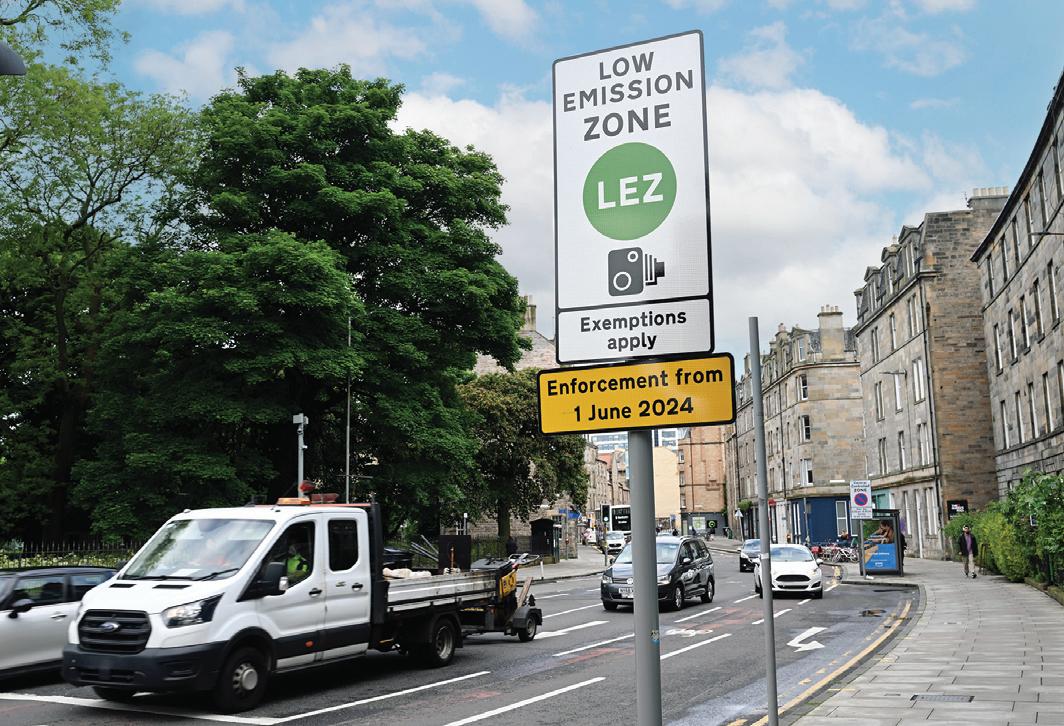
Transport and environment convener Cllr Scott Arthur said:
“Whilst our objective is to ultimately see zero non-compliant vehicles enter our LEZ, I’m conscious that this is a process which will take time to fully materialise.
“I was encouraged to see the relatively low level of second contraventions in the figures alongside none for further levels. This shows clearly that people are getting used to the LEZ and
LEZ signage in Edinburgh
modifying their transport habits accordingly.
“We’ve already seen that public attitudes towards LEZs are improving across Scotland, with a national poll earlier this year indicating that 60% of respondents were in favour of the zones, with just 21% opposed. This is clear evidence that people are seeing the many benefits of LEZs, and how they link in with our wider aims to make our city cleaner, greener and healthier
for everyone.
“These ambitious goals include achieving net zero, accommodating sustainable growth, cutting congestion, and improving air quality, amongst other commitments to create a safer and more people-friendly city.
Edinburgh is a city with big ideas for the future and the LEZ forms a key part of these.”
All revenue generated from PCNs contribute towards running the LEZ. Any surplus revenue may only be used to support LEZ objectives, which are primarily to reduce harmful emissions from transport and encourage sustainable travel.
The LEZ forms part of the city’s wider ambitions under its 2030 Climate Strategy and other initiatives such as the City Mobility Plan and the 2050 Edinburgh City Vision.
It is anticipated that the LEZ will improve public health by significantly reducing harmful emissions of nitrogen dioxide from vehicles and improve public health.
Cheshire East Council has invited residents to share their views on vehicle engine idling and their awareness of measures it is already taking to reduce the practice.
Idling is the term used to describe when motorists continue to run an engine when a vehicle is not moving. Typically, this happens when drivers stop at a red light, level crossing or simply park outside a residence or business.
An online survey aims to review people’s general understanding of vehicle idling, as well as highlighting any idling issues in the borough.
When the council first consulted residents on the subject two years ago, 73% of respondents stated that they ‘always’ or ‘usually’ switch off their engine when parked up or pulled over for a minute or more. Respondents also put forward that they would like to see more signage, especially in the vicinity of schools and for the council to run a campaign.
The ‘Show the air you care’


campaign has seen the council create a myth-busting vehicle idling webpage.
The council has also erected no idling signs around the borough, produced an awareness leaflet and a no idling toolkit for schools.
Cllr Mick Warren, chair of Cheshire East Council’s environment and communities committee, said: “We already know that Cheshire East residents are very well informed on this subject and this survey will continue to help us to target effective ways to change behaviour where it is needed and improve air quality in the borough.
“We are fortunate to have very clean air in the borough but there are always further actions that can be taken. Turning off idling engines is of course one, as is walking and cycling and using public transport.”
A Welsh man who refused to pay a parking notice because it was issued in English has lost a long-running legal case against a parking company.
Toni Schiavone appeared in court for a fourth time in May after declining to pay a parking charge notice by private company One Parking Solution (OPS). The company paid more than £14,000 in legal costs to bring the case to court over three years.
Schiavone, who is a member of Cymdeithas yr Iaith, the Welsh Language Society, said he would have paid the PCN if it had either been in Welsh or bilingually. He said it would have cost about £60 to get the notice translated.
However, District Judge Lowri Williams said there was no legal requirement for the parking operator to issue the notice in Welsh, as the legislation on the Welsh language does not apply to private companies.
After a bilingual hearing held in the Aberystwyth Justice Centre, Judge Williams said Schiavone had presented an
honest and moral case, and agreed it would have been easier if OPS had translated the notice at the start.
Schiavone was refused the right to appeal and ordered to pay £267 costs and interest. However, he said would not make any payments despite the court’s order.
After the hearing Schiavone said: “The issue was I wanted to receive a service through the medium of Welsh, I wanted correspondence sent to me in Welsh. I think I should have had that. Unfortunately, more and more car parks and other services are being transferred to private hands and many of them show little respect for the Welsh language and for the rights of us as Welsh language speakers.
“The legislation is too weak. Why should I have to come to court to justify my right to receive a service in the medium of Welsh in Wales? Particularly in this part of Wales where most people speak Welsh. We need to have legislation which covers the private sector, as well as the public sector.”

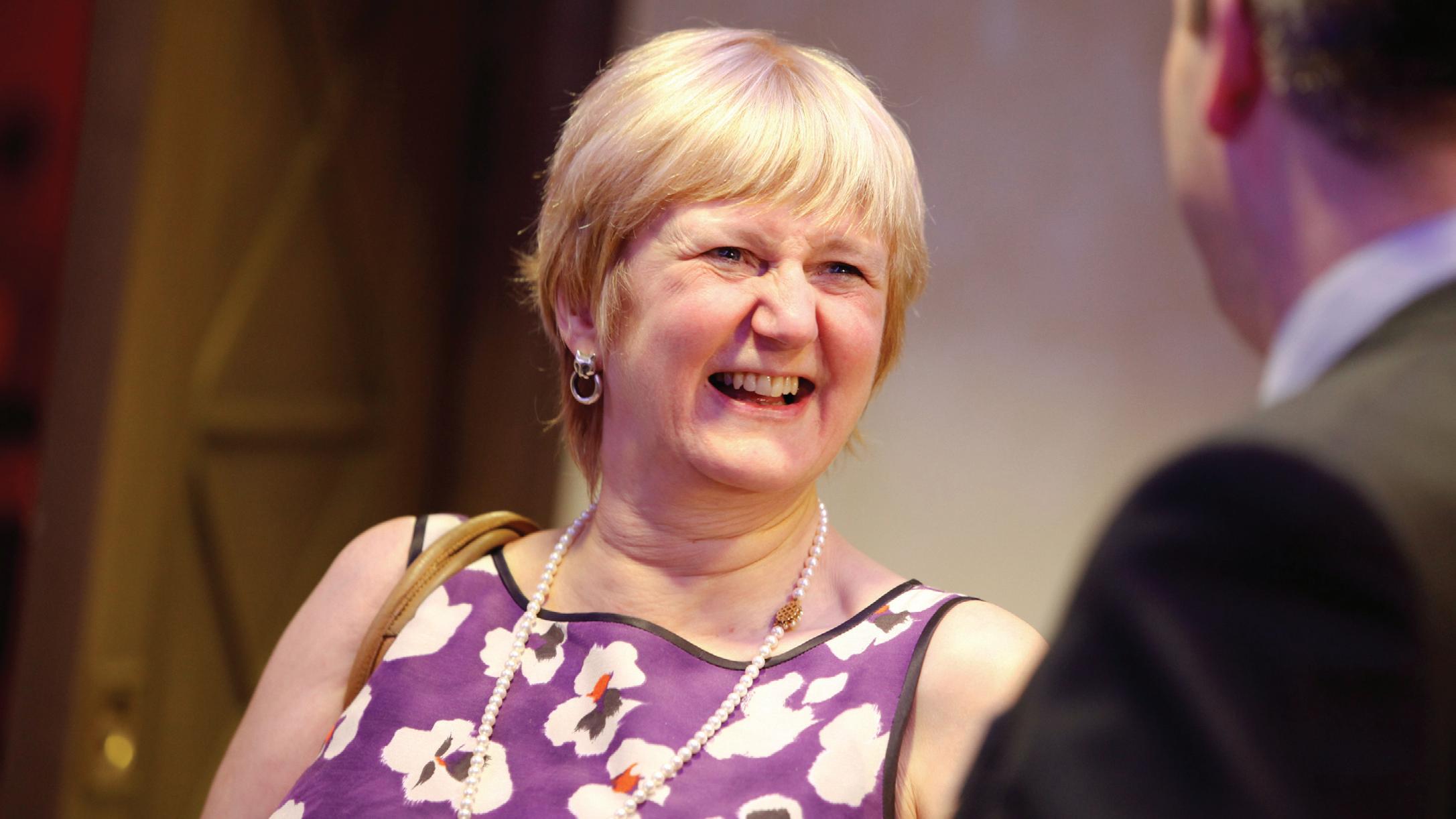
Penny Winder, the founder of Alpha Parking, has passed away. She launched Alpha Parking in 2004 and over the next 20 years the company established itself as a key provider of traffic surveys and Traffic Order making services. She was an advocate of skills development, leading to Alpha becoming a leading provider of training for people working in parking. She also launched the annual Spotlight on Parking seminar, which acts as a forum for discussing current trends in the sector.
Rukshar Asghar, operations manager at Alpha Parking, said: “Penny was cherished and respected by everyone, both as a colleague and as a friend. Her kindness, generosity and nurturing spirit touched us all, and we are immensely grateful for the privilege of having known and worked for her.”
Among those paying tribute to her are:
Angela O’Shea: “Penny was a forerunner of professionalising parking and working with her to produce the first parking specific training for the back office was a highlight of my career that I will always cherish.”
Nicola Keyworth-Wright: “I first met Penny when I was new to the parking industry and attended a three-day training course approximately 20 years ago. She was very supportive throughout my career and will be greatly missed.”
Kam Hothi: “Penny was such an amazing woman and achieved so much, especially in the early days when parking was such a male dominated service. She really did break down barriers.”
Rubena Hafiza: “This is devastating news. I always loved Penny. She was a shining light wherever she went.”
We are paying tribute to our dear director, Penny, whose passing has left us all deeply shocked and saddened. But Penny was more than a director to us. She was a leader. A mentor. A friend.
For those who don’t know, when Penny came into the parking industry over 20 years ago, there were very few women.
Her strength and determination to push through with Alpha Parking broke the mould and, as many found out, she was a force to be reckoned with. Her vision and dedication were instrumental in shaping the company into what it is today – a company which she was proud of and loved so dearly.
Anyone who worked for Penny knew her for her kindness, wit and supportive nature. She celebrated our successes and supported us through our struggles. She made herself available whether we needed advice or a friendly chat.
Some of our clients became “Friends of Alpha” and we are sure some of you, like us, enjoyed a little tipple with her.
Penny always threw a great Christmas party at the Beaujolais Restaurant in London, and we would often celebrate in the wine bar under our office after winning a contract.
We all know Penny loved her travels and was ever the adventurer. We loved to hear her exciting stories about what she saw in the art world, her history tours and her more out of the ordinary experiences, including having Christmas Dinner at a zoo
in Australia!
Whilst she was away we always “held the fort” back in the office, ensuring we followed her clear instructions on how to care for her precious orchids.
To Penny’s family, we want you to know that she spoke of you often and with great pride. We share in your grief and are here to support you too.
Penny, you are gone too soon and will be deeply missed by us all. Your impact on our lives will never be forgotten. Thank you for the opportunities you gave us and for your wisdom and advice which we will carry forward. We will continue to honour your memory and legacy by striving for the excellence you always set us to achieve. Rest in peace, Penny.
Your A-Team
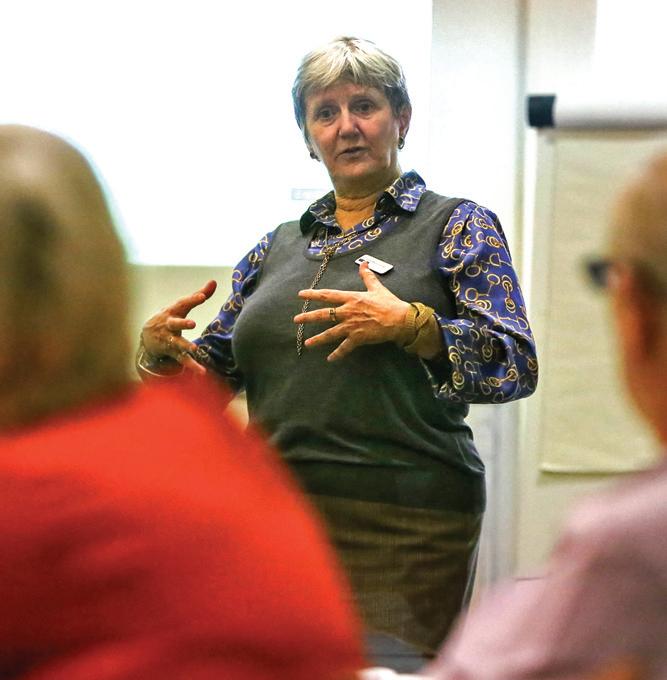

Business development specialist tasked with building relationships
Imperial Civil Enforcement Solutions has appointed Jason Critchley as business development manager.
In this role, Critchley will be responsible for spearheading strategic initiatives, fostering client relationships and driving business growth.
Imperial is a provider of parking, environment and traffic management solutions. It is owned by Modaxo, a group of companies working in the public transport and parking sector.
“We are thrilled to welcome Jason to our team,” said Ashley Bijster, Imperial’s chief executive officer. “His extensive experience and proven track record in business development will be invaluable as we continue to grow and expand our services.”
Critchley has a lot of experience in the enforcement sector. He joins Imperial from Newlyn and Omexus Group (formerly


known as Equita), where he held the position of senior client manager. During his tenure, he successfully managed 45% of the Equita brand client base plus the managed growth of their High Court Department.
“I am excited to join Imperial and work with such a talented and dynamic team,” he said. “I
Indigo Group has signed an agreement with APCOA Holdings to acquire the latter’s Belgian subsidiary. The deal includes a 50% stake in ParcBrux BV, the remaining 50% being already owned by Indigo, and a 50% stake in Maatschap Parkeren Leuven.
APCOA Belgium operates 36 contracts across four regions in Belgium – Antwerp, Flemish Brabant, Limburg and East Flanders – and generated over €18m of revenues in 2023.
APCOA Belgium car parks are mostly located in areas where Indigo Group is already present, facilitating the integration of APCOA Belgium’s operations within Indigo Group organisation.
In Belgium, Indigo Group operates 240 contracts across 75 cities and generated more than €64m of revenues in 2023.
Sébastien Fraisse, president of the Indigo executive board, said: “This operation fits perfectly into the group’s strategy of strengthening its position wherever it is deployed, both off-street and on-street. The
complementarity of the portfolio of contracts provided by APCOA Belgium with that already held by Indigo Belgium, and the cultural proximity between the two structures will allow an accelerated and valuecreating integration. It is also in line with our commitment to work alongside cities to support urban transformation, ensuring that they can respond effectively to the changing mobility needs.”
Bert Pijls, executive chair of APCOA, said: “The acquisition is beneficial for both sides, allowing Indigo to leverage synergies and APCOA to refocus the allocation of resources and investments in markets with a better market position and stronger commercial connections.
“We sincerely thank the entire team of APCOA Belgium for their longstanding commitment to our business and are confident that this transition will enable the business to continue to thrive under new leadership and collaboration.”
look forward to contributing to the company’s success and helping to drive its strategic goals forward.”
In his personal life, Critchley took part in a charity swim in 2023 of the English Channel seen in the Sky Sports TV documentary Rugby Concussion: Turning The Tide.

Cashless parking company Hozah was named PayTech Company of the Year at the Fintech Awards London. The company has developed a barrierless payment system based on the use of automatic number plate recognition (ANPR).
Hozah said: “This award is a testament to our unwavering commitment to driving innovation in payment technology. We are redefining the parking experience, making the journey effortless through cutting-edge technology. We are excited about the future and committed to driving even more groundbreaking advancements in the PayTech space within parking and mobility.”
Hozah was the winner in a field that comprised:
• Freemarket
• Hozah
• Mondu
• Form3
• Nium
• Wallester
We currently supply and have vacancies around the UK for Permanent and Temporary positions:
• Civil Enforcement Officers
• Environmental Enforcement Officers
• Parking Back Office (Appeals/Notice Processing/Correspondence)
• Parking Change Management
• Interim Parking Managers
• Car Park Attendants/Marshalls/Stewarding
• Parking Supervisors (Both Enforcement and Back Office)
• Parking Management (Both Enforcement and Back Office)
• Heads of Parking/Directors
• Parking Technologies (Business Development and Project Managers/ Field Service Engineers/General Managers)
• Off Street Parking (Business Development, Contract Managers and Regional Managers)
• CCTV Operators – SIA and BTEC qualified
Looking for staff or need employment? Please contact our experienced team on:
Tel: 0203 668 5680
Email: parking@unity-recruitment.co.uk
Web: www.unity-recruitment.co.uk

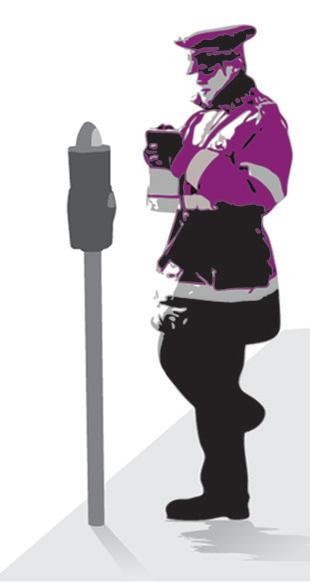




The growth in motorhomes and campervans is forcing many UK councils into a difficult balancing act.
Some residents complain about the visual intrusion of the vehicles – some as large as buses – parking in streets and on promenades. The inevitable bad apples don’t help the motor-campers’ cause, leaving locals fuming about littering, inappropriate disposal of liquid waste, or motorhome steps and chairs cluttering pavements or cycle paths.
On the other hand, this increasingly popular form of tourism brings additional custom for attractions and hospitality businesses, even if guesthouses miss out. Motorhome users don’t fuel depopulation of rural villages where holiday lets replace housing for young people.
The nub of the problem is that people who own or rent motorhomes and campervans have different expectations from traditional caravanners, who wouldn’t entertain overnight stays on streets and promenades.
Motorhome users have no legal right to park on streets but there is no specific law against it. In Scotland, Highland Council says there’s a legal distinction between parking in laybys or car parks and camping at those locations – which is not permitted. It says the Road Traffic Act allows people to use a designated formal layby for rest, including overnight stays in motorhomes, provided all activity is within the vehicle. However, Gwynedd Council in North Wales says overnight stays are not permitted on any part of the highway, including laybys.
Enforcing local rules depends on officers being available, adequately trained and able to identify campervans, including goods vans which have been converted using kits.
Prohibition of motorhome parking is a common response to pressure from residents. For example, last autumn England’s North East Lincolnshire Council introduced a ban on overnight
parking and camping at a Cleethorpes beach car park to ensure other visitors had space to park during the day.
In May, Lancashire County Council banned promenade motorhome parking in St Annes and Lytham. “Councillors in wards where the promenade runs through have reported for many years complaints from residents about the cumulative visual impact of motor caravans, the impact on parking provision for residents and other visitors and the anti-social behaviour of a minority of motor caravan users including setting out on footpaths, disposal of liquid waste down drains and emptying of liquid waste in park areas along the promenade,” said a report by council officers.
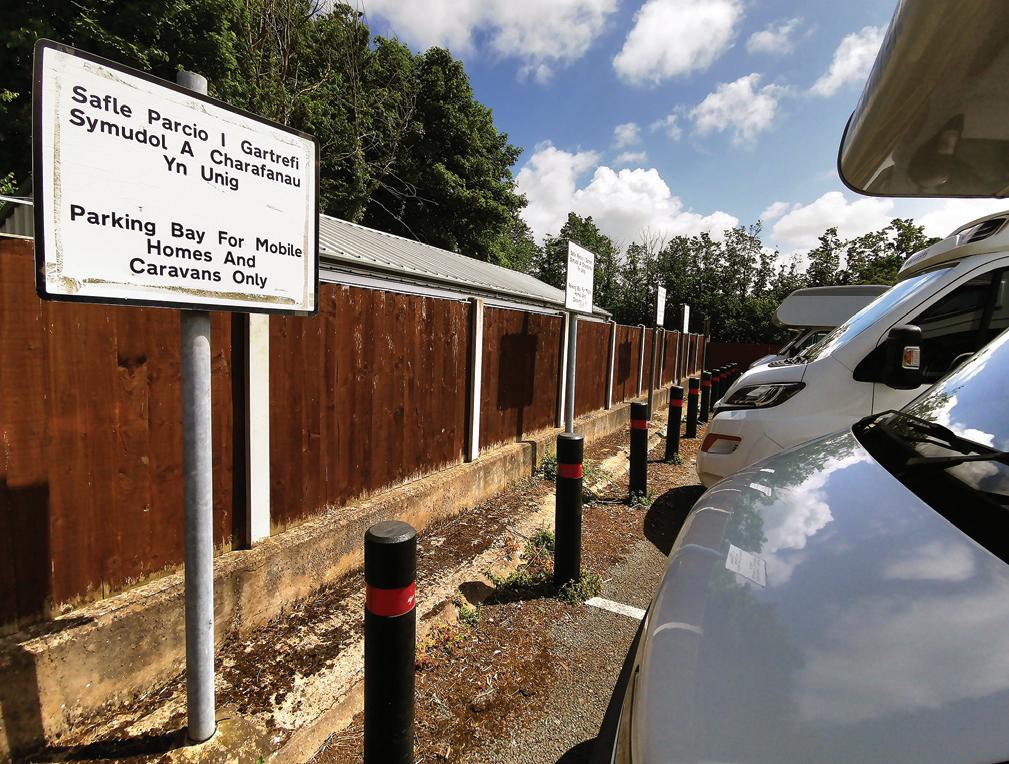

Dedicated overnight parking for motorhomes, such as Criccieth’s Arosfan, need a lot of room. There is wide separation between parking spaces, despite the rule that chairs and other objects must not be placed outside the vehicle
Some residents objected to the ban because they feared displacement to their streets. Officers said there was no evidence this would happen but Fylde Borough Council would monitor to assess whether further restrictions are needed. Fylde has increased its off-street motorhome parking provision.
Some authorities have created larger car park spaces for daytime parking of motorhomes. Two tickets may be required where the vehicle takes up two spaces in an ordinary car park.
Some councils are going further by creating overnight motorhome parking areas, based on the well-established “aires” in France and other countries. Highland Council introduced this at 12 car parks in 2022 and this summer is offering a season ticket (see the case study).
In 2022, Gwynedd Council was allocated Welsh Government funding to create aires which have the title ‘Arosfan’, a play on words which will be lost on most of the clientele. ‘Aros’ is Welsh for ‘stay’. ‘Man’, mutated to ‘fan’ after ‘aros’, means ‘place’, but ‘fan’ is also Welsh for ‘van’.
The first Arosfan, at a long-stay car park in Criccieth, opened in March, featuring nine parking spaces separated by hatched areas six metres wide. The overnight charge is £16.50 per night. Maximum stay is 48 hours, with separate daytime charges. By late June, 138 users had paid the overnight charge.
Gwynedd was about to open aires at Llanberis and Pwllheli as Parking Review closed for press. All sites are in or beside towns, with shops and other facilities in easy reach on foot. An Arosfan in Caernarfon is due this year, and the council is assessing potential sites for one in southern Gwynedd.
“As this is a trial, we are monitoring the arrangements and will consider all feedback to ensure that the Arosfan sites meet the needs of users and respect those communities in which they are located,” Gwynedd Council told Parking Review.
“To support the effort with the Arosfan sites, the council has also introduced orders preventing motorhomes from overnight parking in bays on the A496 on the way into Barmouth, on the A497 near Criccieth and the Foryd area near Caernarfon. This follows instances of irresponsible parking and camping in recent years.”
Gwynedd and Highland require activities to be contained within vehicles. Awnings, chairs, tables, barbecues and other items should not be placed outside. Despite this restriction, aires take up land which could otherwise provide dozens of car parking spaces or be put to other uses, so again councils have to balance pros and cons.
Aires de service also require some additional infrastructure, including a facility for emptying waste water tanks. A drinkingwater supply is also expected – Gwynedd charges £3 for 10 minutes’ supply.
While aires may never become as widespread in Britain as in France, councils which introduce them will earn plaudits and could benefit from additional visits and local spending as word spreads on social media and apps such as park4night.
Meet Rowena and Chris, a pair of very happy campervanners
Criccieth’s new Arosfan get a thumbs up


Rowena and Chris, from Staffordshire, paused to chat with Parking Review as they set off on a morning dog walk from the Arosfan in the coastal town of Criccieth, North Wales. “It’s a great facility,” said Rowena. “If they advertise it to the motorhome community, it will stop any illegal parking [of motorhomes] in the area.”
Chris said: “The locals would rather have this than people illegally parking. It’s not overlooked by any houses.”
Rowena thought a shortage of signs pointing to the Arosfan could leave potential customers unaware of the facility, even when they drive past the entrance to the nearby seafront.
The couple found the Arosfan pricier (£16.50 per overnight stay) than aires in France and Spain. Comparable aires in France charge €2 or €3, while €5 to €10 bags a parking space on a site with extra amenities such as showers, they said.
The Arosfan gave Rowena and Chris security of tenure, allowing them to drink alcohol with last night’s restaurant meal. “You know you’re not going to have a knock on the door in the night and be moved on,” said Chris.
Disposal facilities for grey water and chemical waste were temporarily out of use while the toilet block was being refurbished, but none of the Arosfan customers we spoke to that morning complained. All said the Arosfan needed a large rubbish bin, to avoid customers having to carry litter to off-site bins.
As tourism in Scotland bounced back from the period of pandemic restrictions, Highland Council embarked on a trial of overnight parking by motorhome users in summer and autumn 2022. Designated car parks in Inverness, Nairn, Caithness, Wick, Sutherland and Wester Ross are included in the trial scheme, which charges users for a self-contained overnight stay in their vehicle in allocated parking bays. The council selected 12 car parks for the trial, including several in the Far North. The same provision continues this year.
An overnight stay costs £10 and the ticket covers up to 24 hours, with no return within 72 hours.
This summer the council is improving its offer by introducing a weekly pass, giving access to overnight parking in specified car parks throughout the Highlands. A council spokeswoman told Parking Review: “Further information will follow in the coming months which will be promoted on our website and social media accounts.”






Showcasing excellence, celebrating success

Supported by Friday 13 September, Royal Lancaster London

Organised by



T h e r u n n e r s a n d r i d e r s

The British Parking Awards celebrate the best the sector has to offer… let’s meet the entrants
The British Parking Awards is a competition launched by Parking Review in 2002 to recognise excellence and achievement in a sector that provides what is an essential public service. This year we received over 140 entries from across the public and private sectors, often working together. The classic competitive categories recognise inspiring individuals, dedicated teams and partnerships, ground breaking technologies, effective communication, community engagement, and excellent car park structures.
This year the Parking Rosettes strand will focus on two themes that showcase the positive and progressive aspects of parking in the form of a Connected Vehicles Award and the Accessible Parking Award.
The competition also continues to reflect the way in which the sector is evolving, as seen in the EVolution Award dedicated to electric vehicle infrastructure.
Over the next month, our jury of independent-minded experts will assess, compare and debate the entries to select the shortlisted finalists.
The winners will be revealed by our special guest compere Paul Sinha at a gala lunch at the Royal Lancaster London on 13 September.
Mark Moran is editor of Parking Review magazine and co-founder of the annual British Parking Awards

‘The Sinnerman’ will reveal the winners…
The British Parking Awards 2024 will be presented at the Royal Lancaster London by the renowned comedian and quizzer Paul Sinha. A trained medical doctor Paul is perhaps best known as the ‘Sinnerman’ on the hugely popular ITV quiz show The Chase. As a comedian Paul has played every major comedy club in the UK, performed in 18 countries across the globe, taken eight solo shows to the Edinburgh Fringe, and won Best Club Comedian at the Chortle Awards in 2014.




One of the most well-known and trusted voices on British television, Roger Tilling is now firmly established as the voice of the British Parking Awards.
With over 25 years of television and radio experience, the UK's television networks have made Roger their first port of call when a Voice of God delivery is needed for major events and primetime shows, from The Royal Variety Performance to The British Soap Awards, and Never Mind The Buzzcocks to Top Gear
A trio of trophies presented to people and projects that have made a real difference and positive contribution to the world of parking.
Presented by: MiPermit
The MiPermit Inspiration Award recognises individuals and organisations that have made a significant contribution to improving parking. Inspiration Award recipients are exemplars of excellent practice that have inspired colleagues, clients and the wider parking community.
Sponsored by: The British Parking Association
The Lifetime Achievement Award will be presented to a parking professional who has made an outstanding contribution to the sector over the course of their career. Parking organisations and professionals are invited to nominate an individual who has consistently made an outstanding contribution to the industry and represents a 'model of excellence' across their entire career.
Presented by: Parking Review
The Special Jury Award is presented to a scheme, project or person that has particularly impressed the British Parking Awards jury, which is a panel of experts drawn from across the parking, automotive, transport and related sectors.
Special awards reflecting topical themes in the world of parking.
Sponsored by: Trellint
Satnav systems, digital mapping, mobile phone apps and ever smarter incar systems are enhancing the ability of drivers to search for, book and pay for parking while on the move. The Connected Vehicles Award recognises the work being done to harness the potential of data and communications technology to enhance the parking experience of car, van and truck drivers.
Grid Smarter Cities
Parkopedia
RingGo
The Accessible Parking Award recognises work done to provide accessible parking and to ensure such spaces are not misused.
Hackney Council – Accessible parking and beyond
London Borough of Haringey – Our badge, our spot
Parkingeye – Putting an end to selfish parking with Bay Management Transport Scotland and Imperial – Blue Badge exemptions scheme for Low Emission Zones across Scotland
Sponsored by: RingGo
The Parking Person of the Year Award is open to all local authorities and private operators that may nominate an individual parking employee who has consistently made an outstanding contribution to the industry and represents a ‘model of excellence’.
Ann Cunningham, Head of Highways & Parking, London Borough of Haringey
Kerry Griffiths, Digital Commercialisation, Enforcement, Governance and Innovation Manager, Derby City Council
Fazal Kirwan, Road and Traffic District Manager, Hackney Council
Gary Osner, Chief Executive Officer, ZZPS
Charmaine Sweeney, Operations Manager, Meet & Greet Team, London Stansted Airport
James Tark, Chief Executive Officer, Euro Parking Services
Vaso Vaina, Managing Director, Architect, Stripe Consulting
Michael Wiktorko, Senior Service Area Manager, Parking Services, Hackney Council
Sponsored by: Flowcrete
Recipients may be young employees or recent joiners of any age. Local authorities and private operators can nominate an individual parking employee, consultant or contractor who has consistently made an outstanding contribution to their team and the wider parking sector.
Newaj Ahmed, Civil Enforcement Officer, Hackney Council
Muka Anyado, Suspensions Officer, Hackney Council
Laura Benjamin, Road and Traffic Enforcement Apprentice, Hackney Council
Nisha Damhar, Associate Director, WSP Liveable Places
Elena Golita, Senior Parking Consultant, Project Centre
Emma Homewood, Administrator, ZZPS
David Majewski, Contract Monitoring Officer, NSL
Jess McGregor, Architect, Stripe Consulting
Sam Medhurst, Consultant, Project Centre
Aimee Millin, Service Delivery Manager, NSL Manchester
Tom Narborough, Senior Consultant, Project Centre
Habiba Nessa, Policy and Project Officer, Hackney Council
Andrzej Paszek, Junior IT Project Manager, Agena Group
Kayleigh Salter, Administrator, ZZPS
Ashna Sharma, Compliance Officer, Euro Parking Services
Maciej Sobkowiak, Nuisance Vehicle Officer, Hackney Council
Radoslaw Sztejna, Road and Traffic Enforcement Officer, Hackney Council
Lee Ward, Parking Operations Manager, Greener Ealing
Rebecca Westmacott, Parking Appeals Team Leader, South Gloucestershire Council
Sponsored by: CDER Group
The Parking Team of the Year Award recognises the excellent work of both on-street and off-street parking operations. It is open to teams working in both the public and private sectors.
Brent Parking Team – London Borough of Brent and Marston Holdings
Cornwall Council
Durham County Council and NSL
Euro Parking Services
Hackney Council Parking Operations Team
Hackney Council Parking Policy Team
Havering Council
London Stansted Airport Meet & Greet
RingGo Customer Care Team
Stripe Consulting
ZZPS
Sponsored by: Orbility
Dedicated to parking personnel who engage with drivers and the general public as a part of their day-to-day activities, this award will recognise excellent customer service, communication and community engagement.
Newaj Ahmed, Civil Enforcement Officer, Hackney Council
Tufual Ahmed, Parking Warden Supervisor, Euro Parking Services
Faran Mahmood, Road & Traffic Enforcement Officer, Hackney Council
London Gatwick Airport Valet Team
London Stansted Airport Meet & Greet Team
Maciej Sobkowiak, Nuisance Vehicle Officer, Hackney Council
Ellen Tooley, Civil Enforcement Officer, APCOA
Mohsin Zafer, Warden Team Leader, Agena Group
Sponsored by: Stripe Consulting
This category is open to new and established car parks owned by either the public or private sectors. The award recognises car parks that are managed, designed and maintained in a way that makes the start and end of each driver’s journey a pleasant experience.
Apex Parking and St John's Car Park, Liverpool
B4 Parking
Euro Parking Services
London Gatwick Airport Valet Team
London Stansted Airport Meet & Greet Team
Q-Park
Sponsored by: Zatpark
Recognising imaginative, engaging and informative approaches to communicating with the public and other organisations through advertising campaigns, websites, social media and publications.
APCOA – Major incident response
APN Group – APN forging an identity
Croydon Council and WSP – Croydon’s new parking strategy
Ethos – Parking strategy consultation for Basildon Council
Euro Parking Services
Hackney Council – Motorcycle communications campaign
International Parking Community (IPC) – Request for data and call for evidence
JustPark – London Commuter Campaign
North Essex Parking Partnership (NEPP) – Communications strategy
YourParkingSpace – New user journey
Sponsored by: The International Parking Community
Parking is an essential service and can be a positive contributor to local communities. The Parking in the Community Award recognises people working within the parking sector who have engaged with and supported their local communities.
Euro Parking Services
Hackney Council – Parking Policy Team in the community
Lambeth Council – Lambeth’s Cycle Hangar programme and Cycle Hangar Manifesto
London Borough of Waltham Forest – Empowering the community through virtual parking solutions
Marston Holdings – NSL Brighton & Hove parking enforcement team
Marston Holdings – NSL Edinburgh and Social Bite
Marston Holdings – NSL Manchester
National Persistent Evader Database (NPED) – Revolutionising vehicle compliance and enforcement
PayByPhone – Donate Your Device scheme

The parking sector is playing a key role in the transition to electric vehicles (EVs).
Sponsored by: Go2Sim
3ti – Papilio3 Solar Car Park
Believ – Collaboration with Waltham Forest Council
Cambridge City Council – EV success
Evyve – Charging ahead
Hikvision and Zatpark – EV bay parking violation detection solution
Ohme
Parkingeye – Evology Charging
Parkopedia – EV Charging service
PoGo Charge


Celebrating the work of back office teams working for local authorities, private parking operators, consultancies and civil enforcement agencies.
APCOA – Customer Service Centre
Durham County Council and NSL
Euro Parking Services – PCN Correspondence Team
Hackney Council – Parking Enforcement Support Team
Hackney Council – Parking Operations Team
Hackney Council – Parking Policy Team
London Gatwick Airport – Valet Parking Operation
London Stansted Airport – The Meet & Greet Team
Project Centre – Medway Parking Design Support Team
ZZPS – Back Office Team
Sponsored by: Tap2Park
This award recognises advances in the systems used to manage parking, whether a piece of hardware, a device or a wider system that makes the management of parking more efficient and/or customer-friendly.
Anpriot
CitiPark – CitiBrain PMS
CSL Satellite
Euro Parking Services
Go2Sim – KAMi real-time ANPR monitoring
Grid Smarter Cities – Kerb
Hikvision – TandemVu ANPR Bullet Camera
Lambeth Council – Continuous payment authority for emissions-based charging
Luton Borough Council and Imperial – Streamlining PCN appeals
National Persistent Evader Database (NPED)
Newlyn – Utilising Artificial Intelligence and automation to enhance effective communication
Parkingeye – ANPR Bay Management
Parkopedia – In-Car Payments service
Peterborough City Council and Imperial – A frictionless approach to moving traffic enforcement and exemptions
RingGo – Scan & Pay
Unity5 – Bay Monitoring
Sponsored by: APT Skidata
This award recognises the importance of partnership working. This may involve pairings or groups of local authorities, companies, professional bodies, campaign groups and other stakeholders.
Aberdeen and technology providers – Imperial, Metric, PayByPhone, RingGo, TES and the National Parking Platform
Cornwall Council and IPS Group UK
Durham County Council and NSL
Ealing Council, Greener Ealing and Taranto Systems
City of Edinburgh Council, Project Centre and NSL – A collaborative approach to tackling pavement parking
Hackney Council – Joint venture to tackle stolen vehicles, cloned vehicles, abandoned vehicles, untaxed vehicles and Blue Badge fraud
Hampshire County Council and NSL
Hikvision and Zatpark – EV bay parking violation detection solution
JustPark and Creative Car Parks – The innovative partnership
London Borough of Brent and Marston Holdings
London Borough of Harrow and Taranto Systems – A digital initiative to enhance Harrow’s parking service
Marston Holdings, City of Westminster and the Metropolitan Police
Medway Council and Marston Holdings – Safer Healthier Streets
National Persistent Evaders Database (NPED) – Hiding in plain sight
Peterborough City Council and IPS Group
The Project Centre, NSL and City of Edinburgh
RingGo and WPS Parking Solutions
Smart Transport Hub and the London Borough of Redbridge
The new Traffic Team category recognises the skills and achievements of organisations responsible for implementing traffic and parking schemes such as CPZs, TROs, permit schemes, payment systems, EV charging and a host of other essential services – including planners, engineers, consultants and contractors.
Derby City Council – What a difference 12 months makes!
Hackney Council – Parking Operations Team
Lambeth Council – Lambeth’s School Streets expansion programme
Project Centre – Traffic and Parking Team
Taranto and Capita Traffic Team – TfL ULEZ: The world’s largest clean air scheme
Sponsored by: YourParkingSpace
The Best New Car Park Award is a site-specific category that recognises outstanding design and construction techniques that turn car parks into landmark structures.
Blackpool Central Multi-Storey Car Park – Ballast Nedam Construction and Stripe Consulting for Blackpool Council and Nikal
Harwell Runway Deck Multi-Storey Car Park & Travel Hub, Didcot –
SDC and Stripe Consulting for Harwell
Fidelity Kingswood Multi-Storey Car Park, Tadworth – Bourne Parking for FIL Investment Management
Sponsored by: Concrete Preservation Technologies
The Best Car Park Renovation Award reflects how car parks can be transformed into inspiring buildings with a genuine social value and can host a variety of uses.
Covent Garden Car Park, London – JustPark and Intelli-Park
Crownpoint Car Park, Broughton Shopping Centre, Denton
– British Land and ADJ Surfacing & Consultancy
Swan Walk Shopping Park Car Park, Horsham – Stripe Consulting, Rateavon and Triflex for Horsham District Council
The Plaza Multi-Storey Car Park, Wokingham – Cemplas, Westwood and Colliers International for Aviva Life and Pensions UK
Details correct at the time of going to press
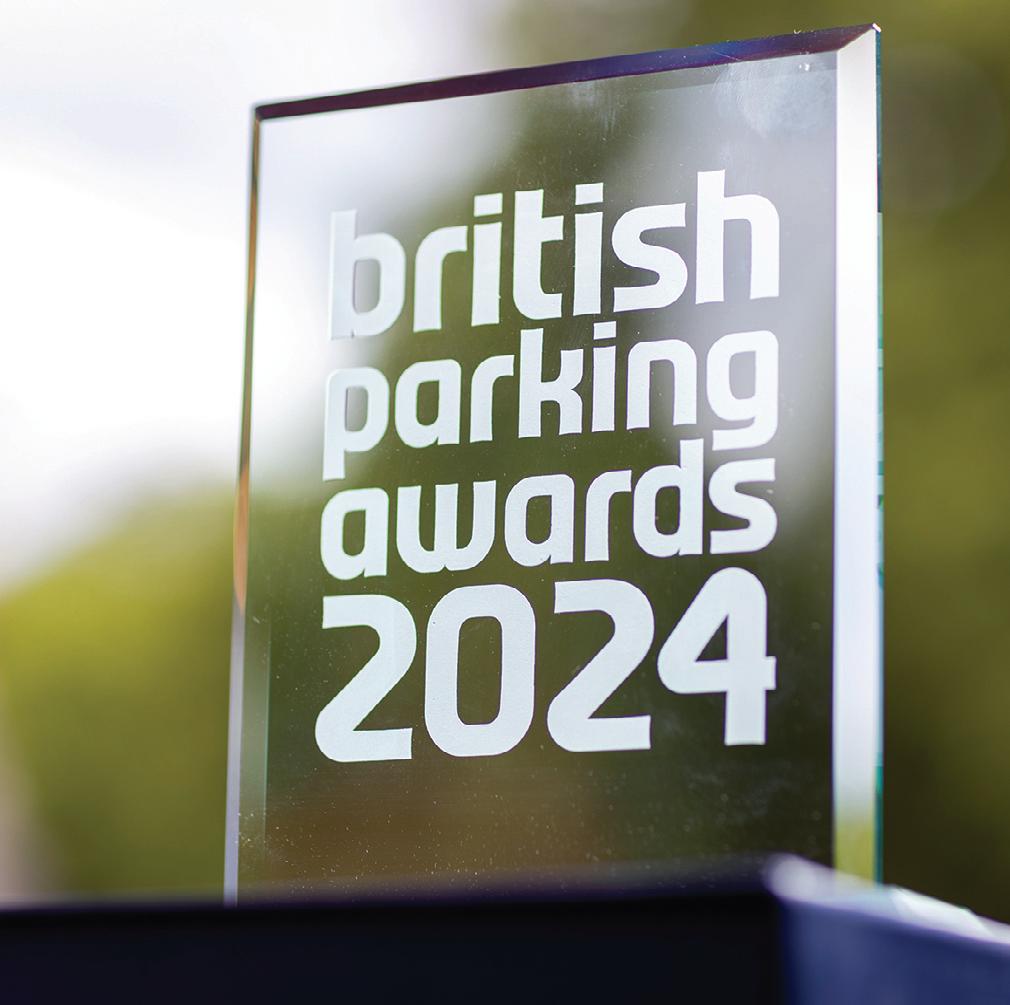
Which entrant will be taking this home?






















































































































































TRACE Group’s John Mason led a discussion on partnership working with NPED’s Alan Wood, Lambeth’s Tom Gallagher, the IPC’s Chris
the
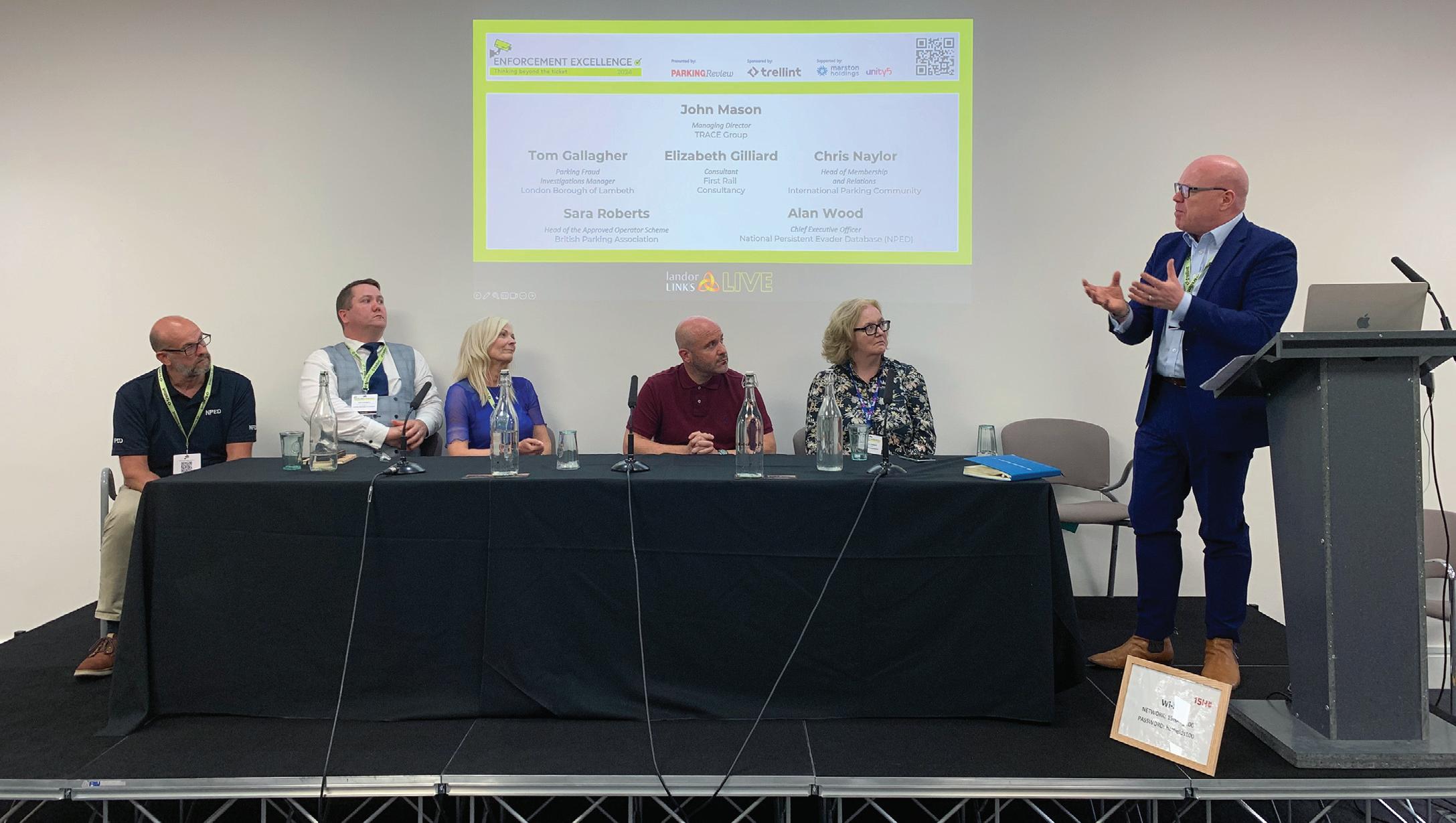
Elizabeth Gilliard of First Rail Consultancy
development at Trellint, provided an enlightening insight into how to harness the immense power of Artificial Intelligence (AI).
Jason Barbour, founder of Barbour Logic, described Voice Master, which isan AI-driven system that enables drivers to obtain automated advice o n penalty appeals over the phone.
Keith Kelly, GovTech business development manager at AppyWay, set out how traffic and parking teams can harness data on vehicles, drivers and patterns of behaviour to identify trends and optimise the deployment of enforcement resources.
Sharing good ideas
Enforcement of the regulations that govern how we use the public realm is essential to ensuring a civil society works. This was a key theme at Enforcement Excellence 2024, which explored how public authorities and their private sector partners can encourage the motoring public to comply with regulations in an effective, ethical and transparent manner.
The conference opened with an address by Russell HamblinBoone, chief executive of CIVEA, in which he explored how civil debt recovery helps ensure local authorities raises essential revenues for public services (see page 30).
Carole Kenney, director of welfare, road traffic and road user charging at CDER Group, discussed what can be done to keep front line enforcement staff safe and how the debt recovery sector is working to safeguard vulnerable people.
An operational perspective from the public sector was provided by Michael Wiktorko, service area manager for parking enforcement at Hackney Council, who set out how his team is delivering positive initiatives to improve road safety and air quality such as School Streets and Low Traffic Neighbourhoods.
Smarter enforcement
An exploration of innovative solutions being used by local authorities, parking operators and enforcement agencies was led by Sharon Silcock, head of sales for enforcement at Yunex Traffic.
Hannah Fuller, head of strategic relationships at Unity5, explored how partnership working and planning enables enforcement teams to leverage the best from new technologies.
Suzanne Varney, director of technology and product
Partnership working was the focus of the afternoon’s sessions. Glen Manley, business development director at Marston Holdings, and Trevor Taylor, operations director at Trellint, were joined by Hackney’s Michael Wiktorko for an engrossing conversation about the procurement and provision of parking services.
Tom Gallagher, parking fraud investigations manager at the London Borough of Lambeth discussed fighting Blue Badge fraud via a national day of action and the launch of a new service called the National Blue Badge Administration Centre (see page 32).
Chris Naylor, head of membership and relations at the International Parking Community, and Sara Roberts, head of the British Parking Association’s Approved Operator Scheme, set out how the trade bodies have cooperated to create a new code of practice for regulating parking on private land.
Alan Wood, chief executive officer of the National Persistent Evader Database (NPED) set out how the initiative is building connections to combat anti-social motorists.
Elizabeth Gilliard, a consultant at First Rail Consultancy, shared insights into how passenger transport operators have been tackling fare evasion and deter anti-social behaviour.
The day concluded with John Mason, managing director at TRACE Group, leading a panel exploring the challenges facing highways authorities, car park operators, property owners, enforcement agencies and transport operators. The panel agreed there is much good practice and expertise to be shared.
To find out more email Jason Conboy on jason@landor.co.uk www.enforcementexcellence.uk
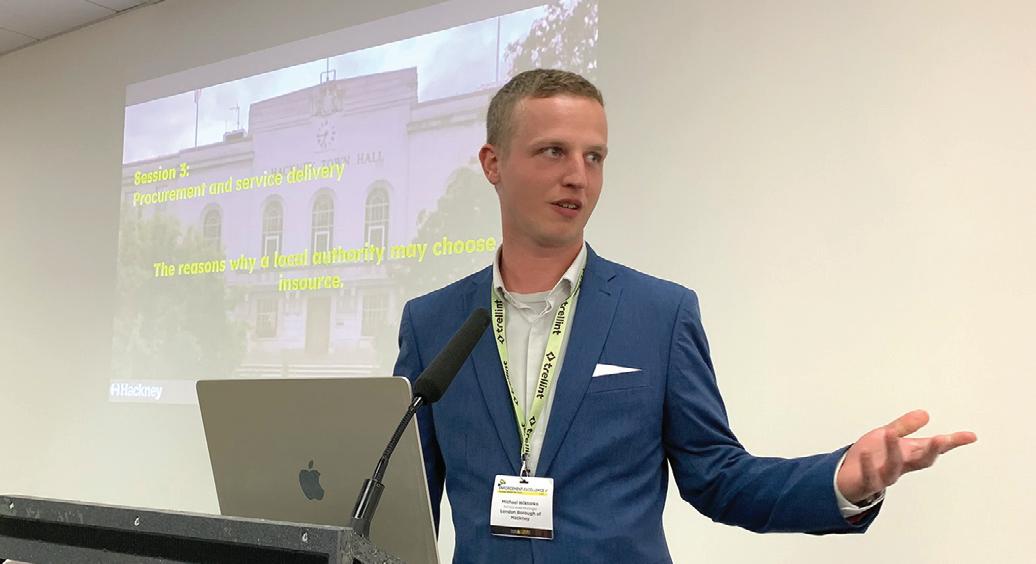
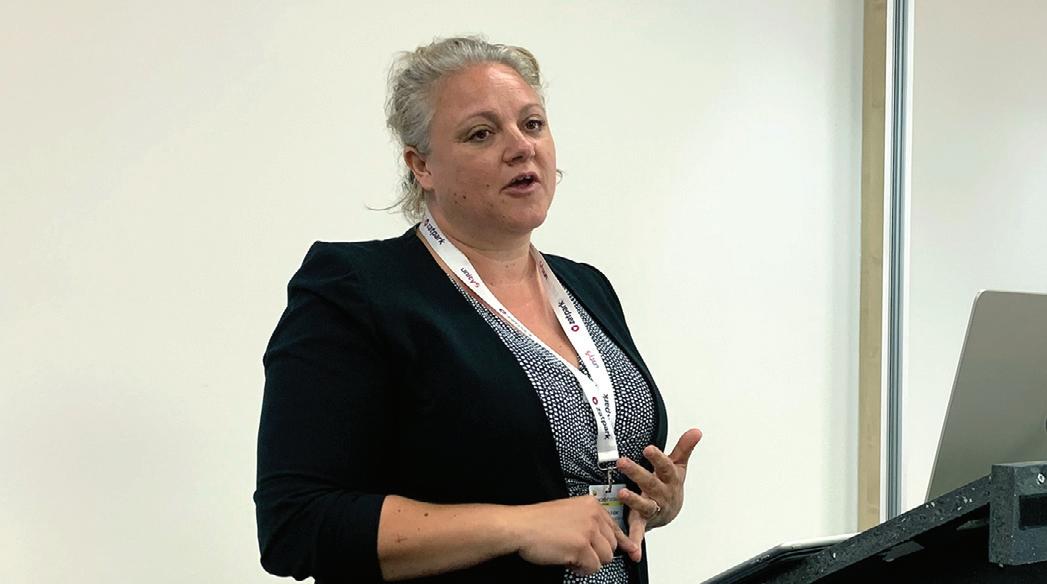

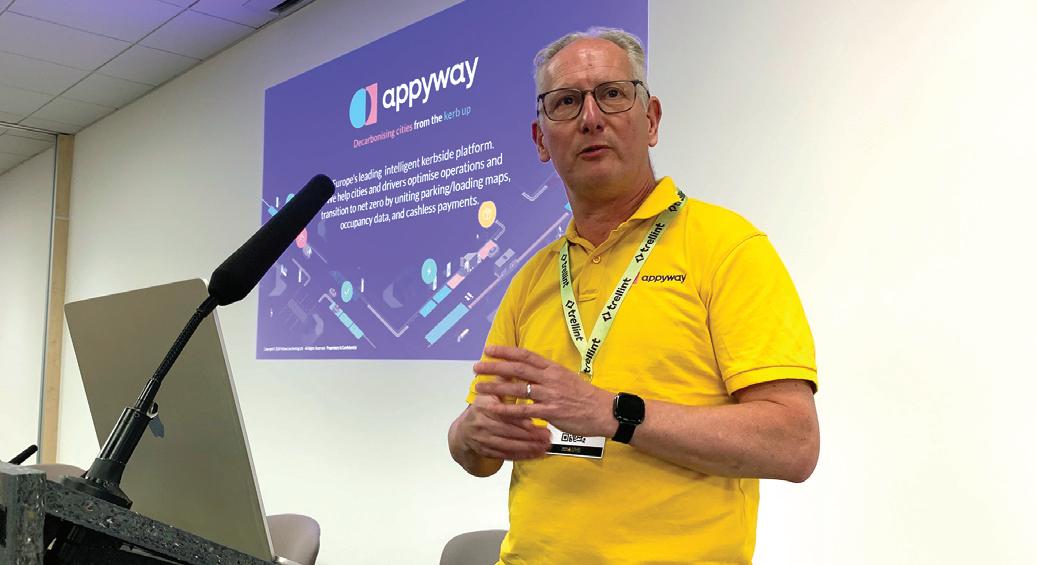
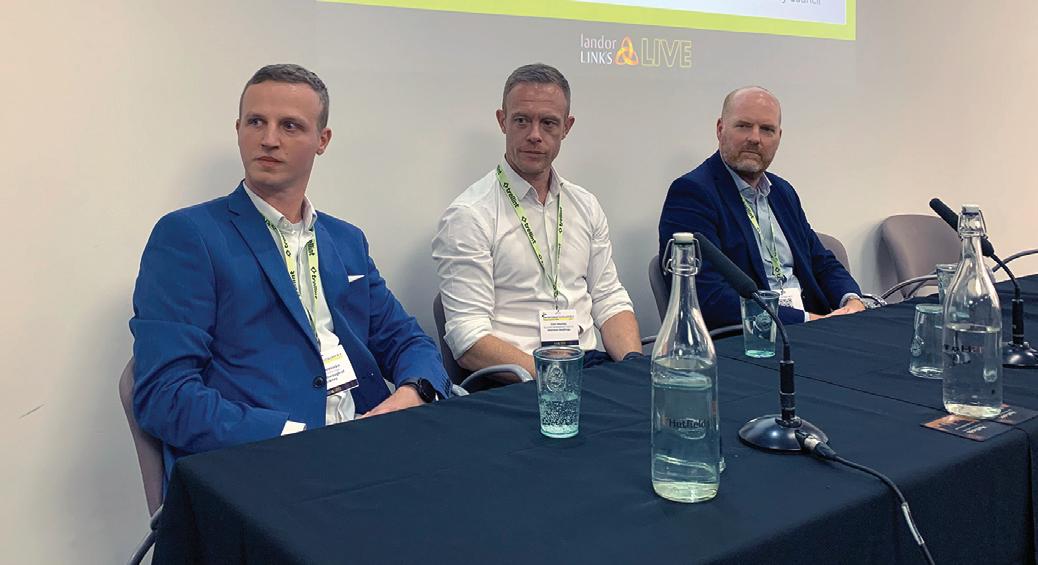
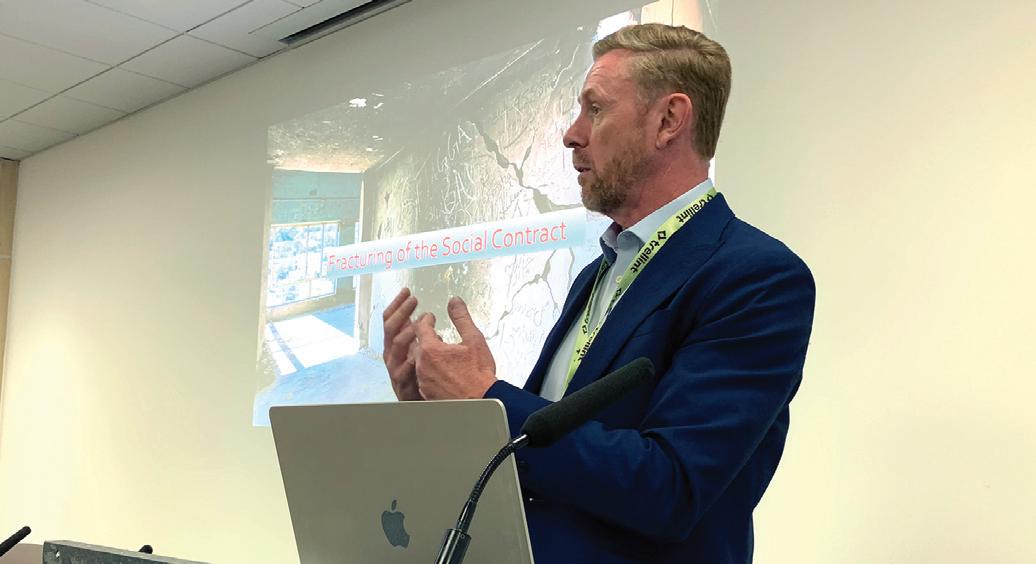
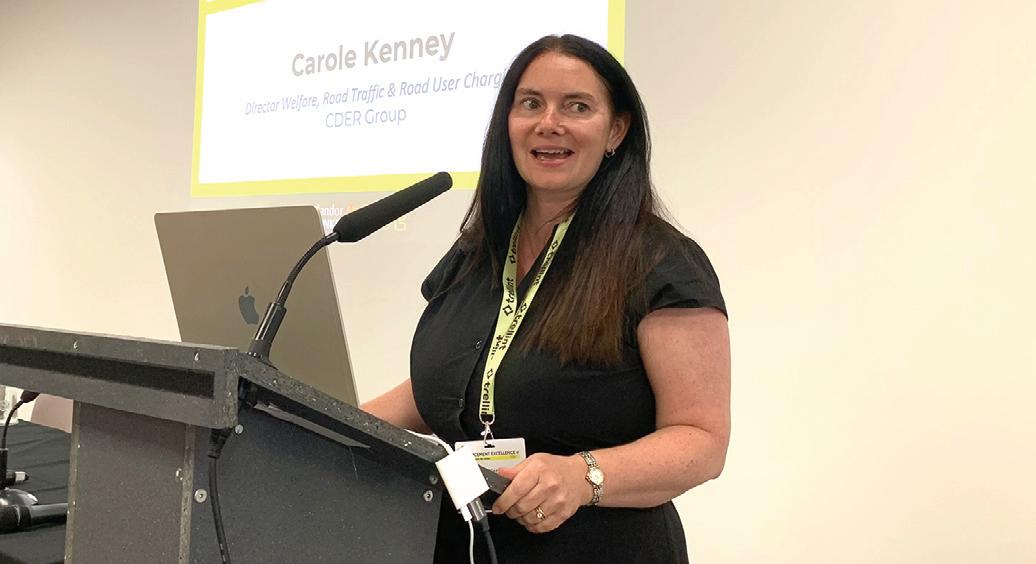

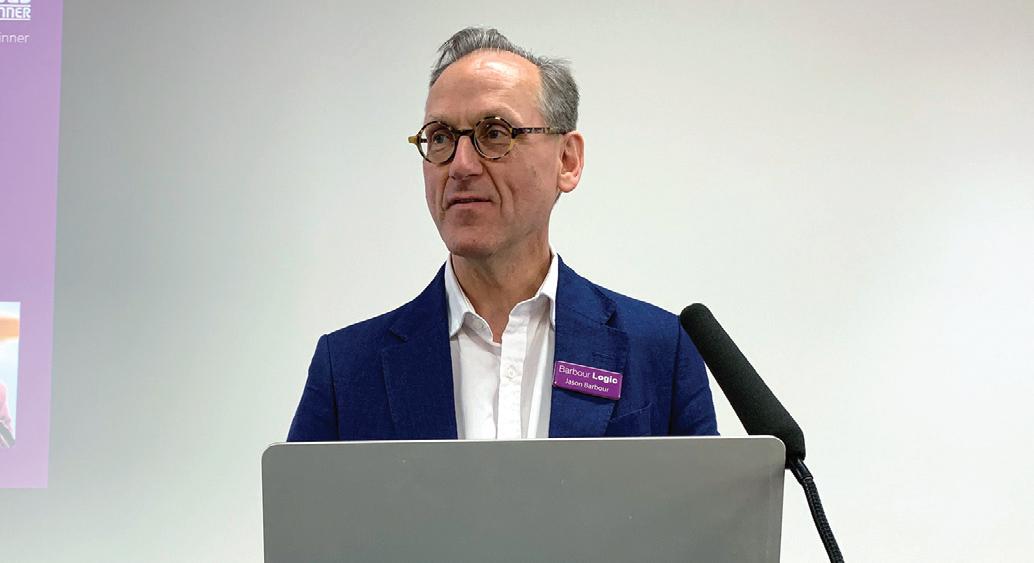

The enforcement sector needs to be more vocal about our work, our values and how essential it is to repair the social contract

CIVEA’s Russell Hamblin-Boone says the enforcement sector is working to become more transparent and accountable as it provides an essential service collecting debts owed to local authorities and their communities
“Our society depends on citizens respecting one another and following the protocols that define how we use roads, streets and public spaces.”
This was the theme set for the keynote session at the Enforcement Excellence conference, held in London in June. The statement was prompted by the experience of civil enforcement officers and certificated enforcement agents who have identified a distinct change in society’s attitude. It’s what I call the ‘fracturing of the social contract’.
Something switched in the public psyche during the pandemic. It may have been the frustration and isolation of the lockdown. It may have been Boris Johnson and Dominic Cummings’ flagrant disregard for government-imposed rules of conduct. It may be the widening wealth gap or the withdrawal of furlough payments and other benefits. Whatever happened has given a significant proportion of the population licence to ignore government and act to their own rules.
Many people are no longer buying into the social contract that says we will forgo some freedoms and act in accordance with the law in order to enjoy the protection of the state. They don’t feel protected and no longer believe in their obligation to behave for the good of society. On social media they call it ‘living their own truth’. As a result of this disfunction, people have given themselves permission to act with impunity.
Anti-social behaviour is being normalised and you see selfish actions daily. Motorists not respecting rules, parking where they want and ignoring traffic regulations – with the challenge presented by persistent evaders being how we try to stop them.
We know that enforcement officers are experiencing the fracturing of our society on the streets and enforcement agents are experiencing on the doorstep. It cannot be tolerated or go unchallenged.
There has been an increase in violence and abuse against public-facing staff across a range of sectors. Enforcement is not the only industry having to work harder to protect frontline staff. It’s a problem for those working in retail, transport and hospitality.
Possibly the difference our sector faces is that facing aggression is considered to be an occupational hazard and assaults on enforcement officers and agents, so it is not treated with the same degree of importance or concern.
The irony of this emerging situation is that while society has gone in one direction since the pandemic, leading to irresponsible and selfish actions, the enforcement sector has moved in the opposite direction, leading to more protection being offered the public. For example, in the realm of debt recovery, there are positive moves to:
• identify vulnerability and supporting people to manage their debts
• invest in technology to improve how we deliver services
• place greater social responsibility on civil enforcement agencies
• mandate the use of body-worn video to protect our staff and the public.
We have also voluntarily established independent oversight of our industry via the Enforcement Conduct Board (ECB) to ensure the highest standards of conduct are maintained, and we are funding it.
So how should we respond to the ‘fracturing of the social contract’?
We need to educate the public about our work, but not just the public. The media and politicians perpetuate the stereotypes in the way they speak about ‘traffic wardens and bailiffs’. We need to move the public image from one of ‘rogue bailiffs’ to one of considerate professionals working in an accountable fashion.
CIVEA has worked tirelessly through social media blogs, media briefings and meetings with MPs to try to evolve the narrative. But it takes a huge effort and time to turn the tide of public opinion, especially when it’s being reinforced by those with an agenda but no accountability for their messages.
For example, there’s a noisy and effective campaign group called Taking Control made up of a dozen or so debt advice groups and interested charities that use the stereotype to provoke an emotional response in order to achieve policy changes. Most of these people rarely interact with civil enforcement officers –and have never even seen a certificated enforcement agent!
These groups would support the abolition of civil enforcement, especially for Council Tax arrears. It seems to me that there is a disproportionate focus on Council Tax collection at the expense of other good work undertaken by certificated enforcement agents. Our critics don’t seem to understand that Council Tax cases accounted for just 28% of all enforcement work in 2022. Almost 60% of civil enforcement in that year was for the collection of parking and traffic penalty charge notices.
Indeed, when you consider that most of our work is enforcement of warrants for traffic offences it is surprising how much criticism is aimed at enforcement agents about Council Tax collection.
I often say that there are small number of people who experience civil enforcement first-hand, but a huge number of people who hear about it second-hand and have a strong opinion about it.
But as well as educating people, we have to engender trust
The voluntary establishment of the Enforcement Conduct Board gives us an opportunity to present facts, and the ECB must speak to the truth. It should not be influenced by politics and perceptions. But present the facts as evidence of conduct and behaviour – and where necessary challenge the stereotypes and speak up for us. But as an industry we need to be prepared for more negativity, even where our work is for the public good.
In the realm of traffic and parking regulation, as the world has started working again since the pandemic, we have seen an increase in the number of penalty charge notices (PCNs) passed to enforcement agents – rising from 2.4m in 2022 to 4m in 2023/4.
There has been an expansion of London’s Ultra Low Emission Zone (ULEZ) and replication of Clean Air Zones around cities in England and Wales. There will be more road charging and tolls and environmental measures like ‘2-plus lanes’ that will be attractive to an incoming Labour government. All of those things will require more enforcement action.
The new government will need to maximise revenue options and that will put the spotlight on civil enforcement and the social justice system. As an industry we can choose to respond to these socio-economic challenges in two ways. We can ramp up enforcement actions and call for tougher penalties, or we can work with central and local government on prevention and education.
But, in a cost of living crisis is a stronger punitive response an effective deterrent and what are the chances of politicians supporting us if that was our call for action?
No. The better option is to be more vocal about our work, it’s value and how essential it is to repair the social contract. How we enforced 4 million penalty charge notices (PCNs) last year and how we are tackling persistent evaders and keeping illegal vehicles off the roads.
However, we have to accept that, as in any sector with a large field force, there will be bad apples. The good news is that we have measures in place to root them out. If you read any of the



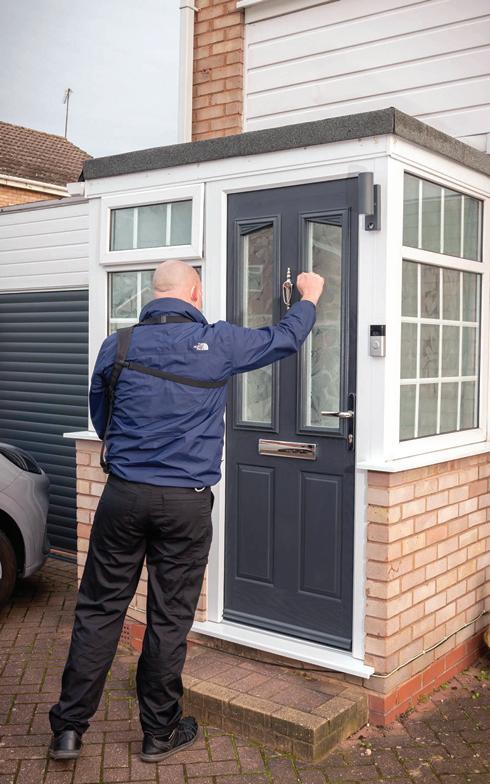
Many debt campaigners promote stereotypical images of aggressive bailiffs to provoke an emotional response – when the reality is that civil enforcement agents work in an ethical and law-abiding manner
Ministry of Justice (MOJ) reports that have reviewed our industry you will always read that in the majority of cases firms are performing well and meeting conduct requirements. But the minority cases, which we acknowledge must exist are used to define the majority.
We also need to be less apologetic about what we do. By definition, enforcement means entering property and seizing goods. How this can be legally executed is set out in detail in the Taking Control of Goods Regulations 2013. In fact, the complexity and extensive regulations may mean that people may not be aware of the enforcement agent’s rights.
It’s likely that those making allegations of misconduct by agents are expressing their dislike of the rules, rather than any genuine knowledge that agents were breaking any rules. People sometimes misinterpret agents when they claim that they were ‘threatened’ that their vehicle may be clamped or an agent may enter their property. These are not threats, they are statements of fact in which agents are explaining their powers to undertake a legal process and the consequences of non-compliance.
But it is these mis-reported actions that are used to demonise our industry and leads to the deviant behaviour that is being reported by frontline staff. We have a positive story to tell, which is evidenced by the high levels of hard to collect debt that is recovered and the low level of complaints. The ECB is collating industry data to back this up.
In opposition it has been easy for some MPs to criticise how the government recovers debt from those who for one reason or another have not responded to extensive attempts to make contact and resolve their situation at an early stage. In government we hope that new ministers – including new chancellor Rachel Reeves – recognise how essential enforcement is to ensure that social justice is maintained and local revenue is collected.
Russell Hamblin-Boone is chief executive of CIVEA
CIVEA is the principal trade association representing civil enforcement agencies employing around 1,500 certificated enforcement agents in England and Wales. CIVEA represents approximately 40 companies that make up more than 95% of the entire enforcement industry. CIVEA’s members work to enforce civil debt on behalf of local authorities and His Majesty’s Courts and Tribunals Service (HMCTS) including Council Tax, business rates, road traffic and parking penalties, magistrates’ court fines, employment tribunal awards, child support payments, B2B and commercial rent arrears. This amounts to over £550m of unpaid taxes and fines recovered each year at no cost to the public purse.
www.civea.co.uk
Effective Blue Badge enforcement protects the rights of disabled individuals, ensures the efficient use of resources and the integrity of our transportation systems
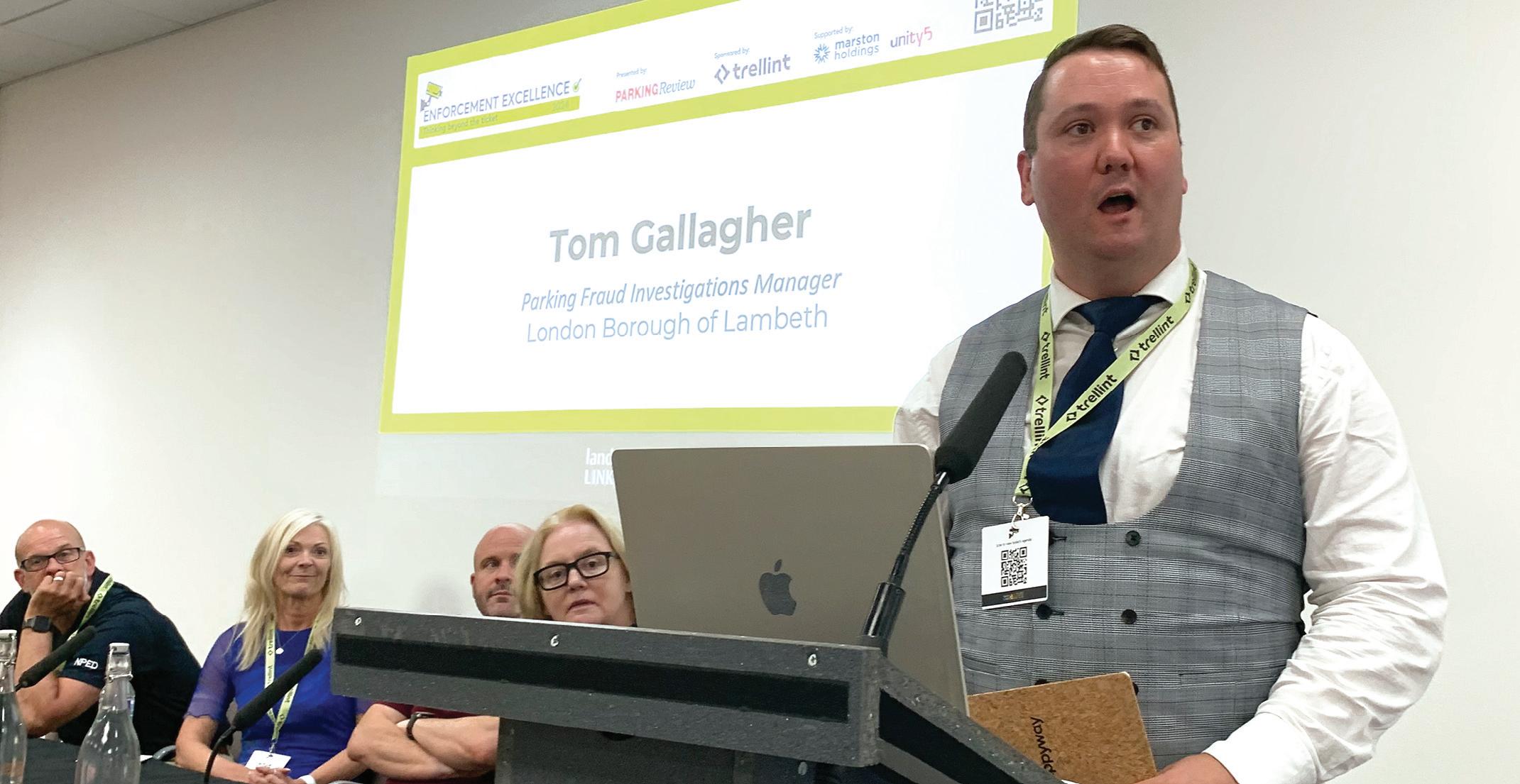
The National Blue Badge Day of Action sees local authorities across Britain work as one, says its champion Tom Gallagher
The misuse of Blue Badges by dishonest drivers prevents people with disabilities from being able to park where they need to. When Blue Badges are used fraudulently, it also undermines the scheme. Sometimes, for example, people with non-visible disabilities who are legitimate badge holders could be accused of fraud. This causes distress and damages the reputation of the Blue Badge system.
In a bid to focus public sector resources on detecting and deterring the abuse of Blue Badges, local authorities across Britain have started to coordinate their enforcement actions.
The Blue Badge Day of Action unites all councils in the UK in increasing public awareness about the misuse of Blue Badges and enforcing against people abusing the scheme.
The national initiative is championed and coordinated by Tom Gallagher, fraud investigations manager at Lambeth Council, who says: “Statistics show that enforcement of Blue Badges is often concentrated in larger cities and dense urban areas. This happens for a variety of reasons, including resource allocation, specific local issues, and higher population densities. However, every disabled person, regardless of their location, deserves assurance that the critical provisions provided for them are protected and enforced. I am eager to highlight the many societal, financial and highways benefits of a robust Blue Badge enforcement scheme to local authorities from outside of London. Effective enforcement not only protects the rights of disabled individuals but also ensures the efficient use of resources and the integrity of our transportation systems.”
The third Blue Badge Day of Action took place on 24 May and saw over 140 local authorities across the country coordinate activities to tackle fraudulent use of the Blue Badge.
The idea of coordinating resources to tackle Blue Badge abuse originated in London when Lambeth Council launched the London Parking Fraud Forum and a Blue Badge Day of Action in 2021 as two interactive days geared towards disseminating knowl-
edge and empowering investigators through meaningful networking opportunities. Via the forum, Lambeth was able to encourage greater collaboration between the capital’s boroughs when it comes to tackling parking fraud and has fostered new relationships which make sharing intelligence easier.
In early 2023, supported by London Councils, Lambeth invited all UK parking authorities and relevant organisations to the National Parking Fraud Forum and a nationwide day of action attracted the participation of 82 local authorities. The success of this event was recognised with a British Parking Award in 2023.
This year’s Blue Badge Day of Action was the biggest yet, with 142 local authorities taking part. The day saw over 200,000 vehicles inspected by almost 500 patrol officers across the country. Some 10,000 Blue Badges were inspected, leading to over 420 offences being detected, the seizure of over 180 badges, some 390 penalty charge notices being issued and 29 vehicles impounded.
Tom Gallagher says: “In the end a remarkable 142 councils from across the UK took part, surpassing our expectations. This overwhelming participation highlights our collective commitment
to making a difference. The growth and impact of this initiative are truly inspiring, and each of you should feel proud to be part of a movement that is positively transforming the lives of disabled individuals across the UK. As the statistics show, we face a significant challenge in managing the misuse of Blue Badges. This misuse remains a prevalent issue on our roads and highways that requires consistent and dedicated management.”
Gallagher hopes that the success of the Day of Action encourages local authorities to maintain a focus on Blue Badge abuse all year round. To this end he has spoken on the initiative at events such as Parkex, Traffic + Parking, Enforcement Excellence and a seminar run by PATROL.
“As a counter-fraud professional and an expert in enforcement, I believe that identifying these offences is just the beginning,” Gallagher says. “Meaningful actions and sanctions are necessary to deter future misuse effectively. I understand that resources and priorities vary across councils, but I urge you to take decisive action against those who abuse the Blue Badge scheme. Real sanctions are the ultimate deterrent. Without a real desire to protect the Blue Badge scheme, with a concerted effort to enforce, then we run the real risk creating a two-tier Blue Badge system. In such a system, disabled motorists in less urbanised areas may find themselves at a disadvantage, with reduced access to the benefits they are entitled to. This disparity is unacceptable and undermines the principle of equal rights and access for all.”
Gallagher’s desire to shine a spotlight on issue of Blue Badge fraud all year round has seen him launch a new venture called the National Blue Badge Administration Centre.
“I’m really looking forward to some constructive conversations and meaningful dialogue with councils, and how the National Blue Badge Administration Centre can support them,” he says. “Our innovative zero-cost enforcement model is specifically designed to help councils achieve high standards of enforcement without additional financial burdens. I believe that the newly elected government provides us all with a unique opportunity to re-evaluate and improve our current practices, making them more inclusive and effective.
“I look forward to a positive and productive discussion, sharing insights and exploring collaborative solutions that will benefit our communities. Together, we can ensure that Blue Badge provisions are consistently and fairly enforced, providing equal access and support to all disabled motorists.”
https://cpduk.co.uk/providers/nbbac
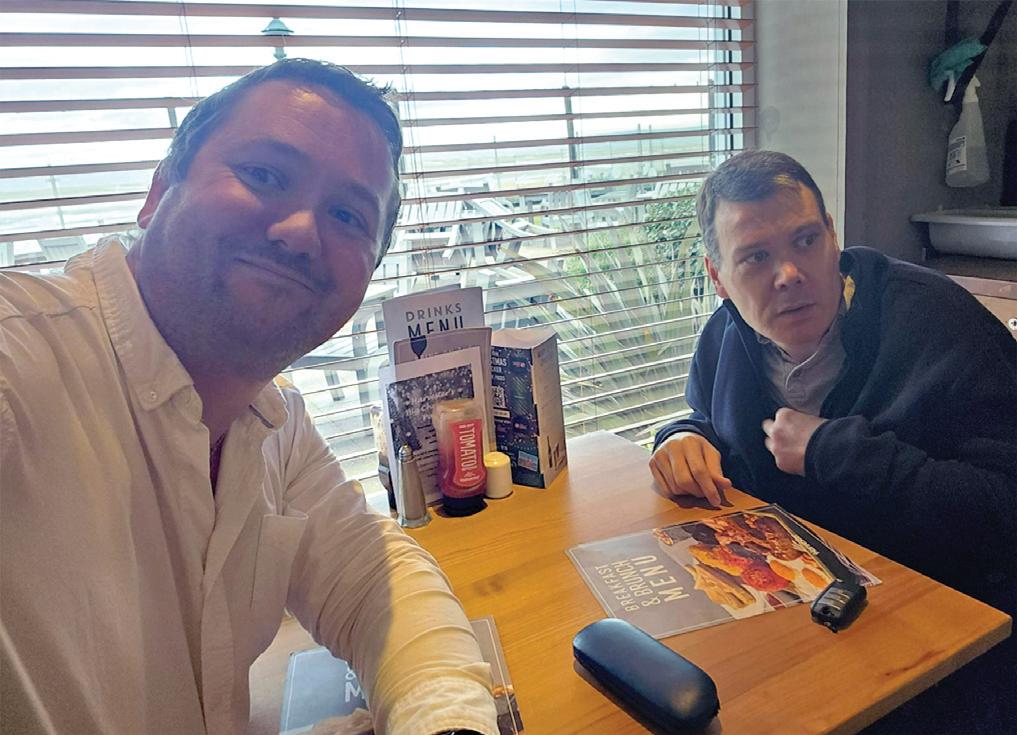

Detecting and deterring abuse of the Blue Badge scheme has a lot of meaning for Tom Gallagher as an individual.
“The Blue Badge Day of Action initiative holds a special place in my heart, and it is profoundly personal to me,” he says. “After the day of action, I had the pleasure of spending a wonderful weekend with my brother Joseph, who is autistic and profoundly deaf. Joseph is my inspiration for advocating for the effective enforcement and promotion of the Blue Badge scheme. His challenges and triumphs drive me to ensure that everyone who needs support and accessibility can receive it.”


The Blue Badge Day of Action is a national initiative organised by Lambeth Council. Now in its third year, the campaign has drawn the participation of over 140 local authorities and a range of parking and disability organisations.
The views of many local authorities were summed up by Angela Page, executive councillor for public protection and enforcement at the London Borough of Bromley, who said: “Motorists should be in no doubt that the council will prosecute where evidence of Blue Badge misuse is found. Our work to protect the integrity of the Blue Badge scheme is very much ongoing and those tempted to misuse a Blue Badge are warned that we are checking badges on a daily basis. We need everyone to understand that it is genuine badge holders who are impacted, who sometimes even have their travel plans compromised because a space is not available to park in. This is why we need Blue Badge misuse to stop and we will keeping working towards this ultimate aim.”
Paul Slowey, founder of fraud investigator BBFI, said: “The Blue Badge Day of Action critical initiative aims to unite UK councils in rigorously enforcing the Blue Badge scheme, and as the national agency for Blue Badge Fraud, BBFI wholeheartedly endorse this. The day is instrumental in protecting accessibility and independence for disabled motorists. This year’s day of action saw participating councils intensify enforcement and educate communities on the correct usage of Blue Badges and the BBFI team were out in force on 24 May, with investigators out covering 10 local authorities, nine in London and one in Dudley, West Midlands. We’re thrilled to support this brilliant initiative each year, but our work doesn’t stop here, every day we continue the fight against Blue Badge crime.”
The Blue Badge Day of Action was welcomed by Graham Footer, chief Executive, Disabled Motoring UK (DMUK), who said: “Many congratulations to Tom Gallagher and his team at Lambeth Council for organising the hugely successful National Blue Badge Day of Action. I think it is remarkable that you managed to persuade so many councils to take part and the results speak for themselves. What a fantastic achievement and well done to everyone who took part. It feels uplifting to see so many councils committing to the day of action.
“I know I speak for all DMUK members when I say how delighted we are to see real action being taken to tackle Blue Badge abuse and misuse. Genuine Blue Badge holders who respect the scheme and follow the rules and regulations welcome this and would certainly like it to continue on its current trajectory. Let’s hope in 2025, even more councils will join in.”
Alan Wood is the founder of the National Persistent Evader Database (NPED), an initiative tackling anti-social drivers. He endorses the Blue Badge Day of Action, saying: “Well done Tom on a great effort! But as you say, this is the tip of the iceberg and totally highlights the fact that local authorities simply don’t have the tools they need to deliver a genuine deterrent or the ability to enforcement in a manner that is likely to change a drivers behaviour. Which is why we need the Vehicle Compliance Management Act. Watch this space.”
The British Parking Association urged its local authority members to get involved with the Day of Action. Isaac Occhipinti, head of external affairs, says: “The BPA is keen to support all the work being done by stakeholders to try to tackle Blue Badge fraud in the UK. It’s unacceptable that people are trying to abuse the system, a system designed to assist those most in need of priority parking. We will be asking the government to do more to recognise the scale and impact of this issue.”


Local authorities have been pitching ideas for campaigns to help the public better understand the role of parking regulation and so reduce incidents of abuse and aggression against civil enforcement officers and back office staff. Brighton & Hove City Council and North Essex Parking Partnership (NEPP) were named as joint winners in the first year of the new Driving Improvement Awards. PATROL has developed a new awards programme to inspire and recognise local authority public awareness activities that drive positive change in the delivery of enforcement services and engagement with communities.
The Driving Improvement Awards offer authorities the chance to submit a bid for funding of up to £25,000 with which to carry out a campaign or activity to effect change, both in the local area and replicable nationally.
Local authorities are asked to focus on a specific theme each year, based on current or pressing events, issues and trends in the parking and traffic enforcement landscape. This year the focus was on abuse experienced by civil enforcement officers and other enforcement staff.
The winning authorities were announced at PATROL’s Annual Reception held in London on 9 July.
The 2024 shortlist
• Arun District Council
• Brighton & Hove City Council
• Halton Borough Council
• North Essex Parking Partnership
• Telford & Wrekin Council.
Both Brighton and NEPP proposed creative and thoughtprovoking campaign concepts to educate the public on the true nature of enforcement and the staff involved, in order to dispel common myths that may lie behind abuse, as well as to foster respect and empathy.
It was also the combination of Brighton’s multi-stakeholder approach with NEPP’s proposal to develop a suite of interactive resources that PATROL felt would deliver a further compelling edge, also making any eventual campaign materials adaptable for use by other authorities.
Laura Padden, director of PATROL, said: “Brighton and NEPP are very worthy winners of this first year of the Driving Improvement Awards and we are looking forward to working with both authorities to bring together and shape the two campaigns and their respective tactics together.
“The awards offer a fantastic opportunity for local authority teams to showcase their creativity in and commitment to addressing local challenges, helping to drive change nationally. Participating in the awards will not only highlight an authority’s dedication to improving community engagement, but also position their team as a leader in innovative problem solving.”
PATROL says that details of the theme for next year’s awards and the entry process will be announced in October. A report on the learnings of Brighton and NEPP’s joint campaign, together with any associated materials that are produced, will be published in early 2025
Over 300 local authorities in England (outside London) and Wales are members of the PATROL (Parking and Traffic Regulations Outside London) Adjudication Joint Committee. The Joint Committee provides resources to support the independent adjudicators and their staff who comprise the Traffic Penalty Tribunal. www.patrol-uk.info

Brighton & Hove City Council
No Targets, No Bonuses: The truth about civil enforcement officers
The team plans a multi-channel and stakeholder advertising campaign to educate the public about the true nature and importance of enforcement staff. By dispelling misconceptions and highlighting community impact, the campaign aims to reduce negative perceptions and abuse. The strategy includes social media, local press, out-of-home advertising and community events, with success metrics to include a reduction in abuse incidents and improved staff retention
North Essex Parking Partnership
Humanising Our Heroes: Respect for parking officers
The partnership’s campaign aims to foster respect, understanding and empathy towards parking officers through an interactive-led campaign for schools and other education institutions, targeting the next generation of the public. A large proportion of the requested funding is for developing bespoke interactive resources focussed on correct parking and the challenges of enforcement, with the campaign’s impact measured through online and social engagement, reduced abuse incidents and public feedback.
Arun District Council
Safer for Communities
Arun, in partnership with West Sussex County Council and local schools, proposes a campaign to raise awareness of civil enforcement officers’ roles in ensuring safe journeys to school. The campaign will be told through the experience of the officers themselves, targeting three main towns and including presentations in schools supported by a range of marketing and communications channels, including video. Impact will be measured by a reduction in abuse incidents and improved walking and cycle journeys to the schools.
Halton Borough Council
(entered as The Mersey Gateway Crossings Board)
Vulnerable Customer Communication Project
The council proposes establishing a welfare team to support vulnerable customers and frontline staff facing hostility. The team will handle cases involving customers in financial, medical or emotional crises and provide support to staff. Funding is also sought for Mental Health First Aid training for staff and resources for training activities,
as well as developing a payment portal for impacted customers. The campaign’s success will be measured by reduced incidents of hostility, staff retention rates and customer feedback.
Telford & Wrekin Council
Day in the Life of the Neighbourhood Enforcement Team
The council propose a social media campaign featuring weekly updates on X, Facebook and other platforms, showcasing various enforcement duties and their importance. The campaign’s objective is to create a positive perception of the enforcement team by engaging and educating the public about their roles and value. Impact measurement will involve reviewing social media statistics and public feedback.
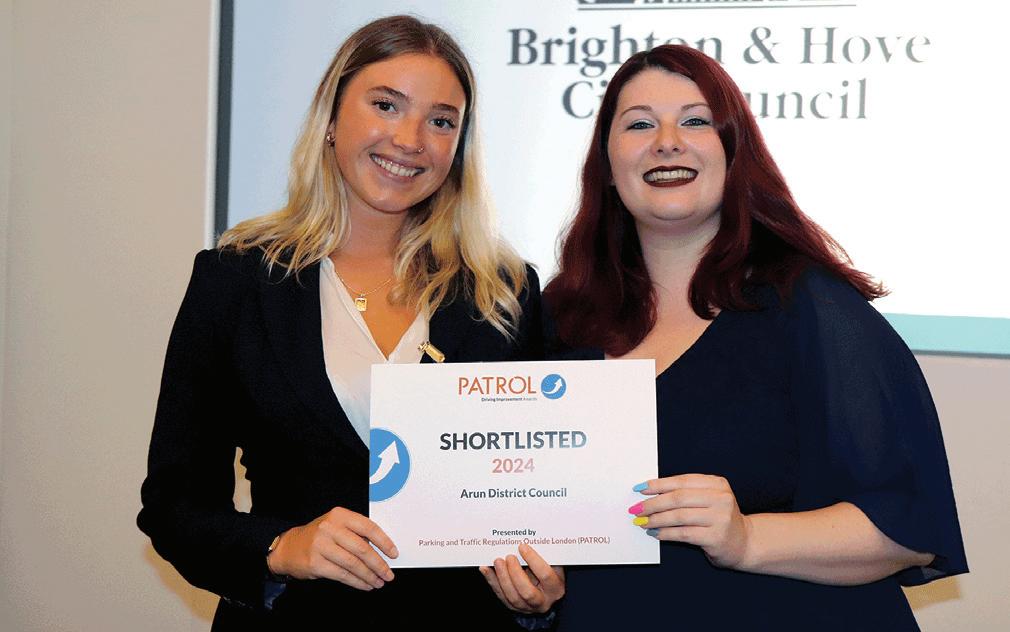
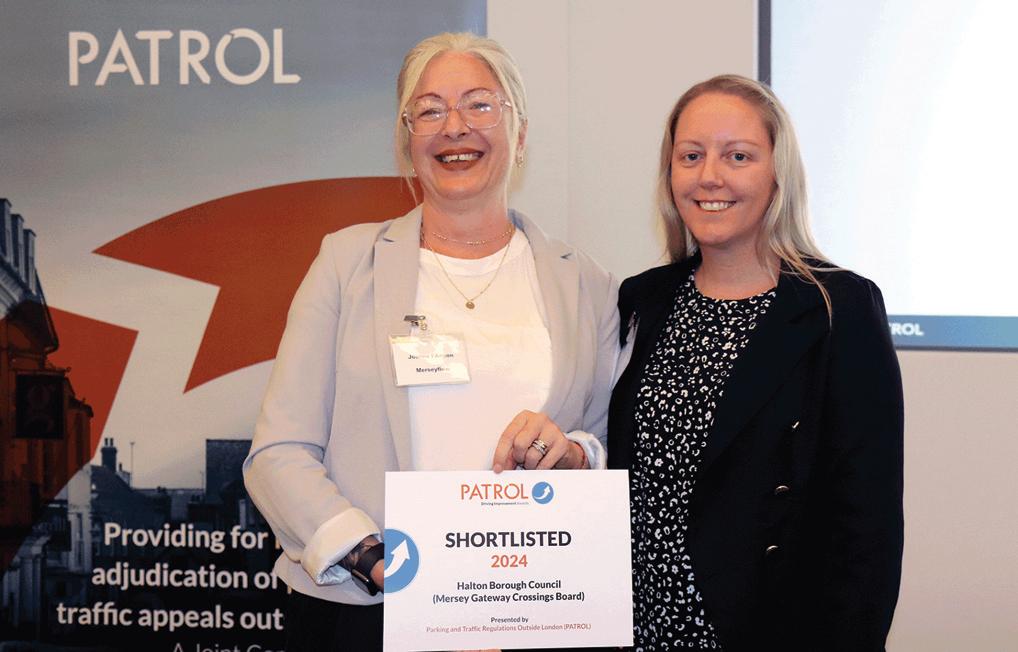
PATROL is the governing body that oversees and administers the Traffic Penalty Tribunal. We are comprised of more than 300 local authorities in England (outside London) and Wales that enforce parking and other traffic restrictions. Members appointed to PATROL represent all political parties, so we are fortunate to hear the diverse views of the politicians that represent their authorities, in addition to the feedback and issues raised by local authority officers.
We are also privy to valuable insights from the public and adjudicators through appeals to the Traffic Penalty Tribunal. This gives PATROL a unique understanding and perspective on local authority enforcement and the issues that matter the most in the sector. It is just such understanding and perspective that shapes and improves traffic management and enforcement practices, both through our members and in the form of advocacy on policy matters.
The election result signals a fresh chapter, full of opportunities for enhanced dialogue and action on issues that matter deeply to our members and their communities. PATROL is eager to collaborate with the new government and ministers at the Department for Transport (DfT) and Ministry of Housing, Communities & Local Government (MHCLG) without delay – continuing and expanding the regular engagement we have had in recent years.
One of the critical issues on which PATROL has consistently called for action is pavement parking. For many years, this organisation has advocated for clearer, more effective regulations and the tools to tackle the problem caused by vehicles obstructing pavements. The negative impact on pedestrians, particularly those with disabilities, parents with strollers and the elderly, cannot be overstated. The previous government had promised action on pavement parking and to respond to its 2020 consultation this summer.
Looking forward, not backward, however, we are hopeful the new administration and the Department for Transport will not delay any further building on the groundwork laid by the Conservatives.
The safety and accessibility of our pavements must be at the forefront of transport policy, and PATROL stands ready to support and assist in implementing the changes.
Another critical area where PATROL has been actively engaged is on the level of civil parking penalty charges outside London. Our recent research, conducted with the British Parking Association (BPA) and supported by the Local Government Association (LGA), has revealed significant financial and operational challenges faced by local authorities.
The findings are stark: over a third of the parking services covered under the research are financially unsustainable, with operating costs having risen massively over the near decade and a half since 2008,
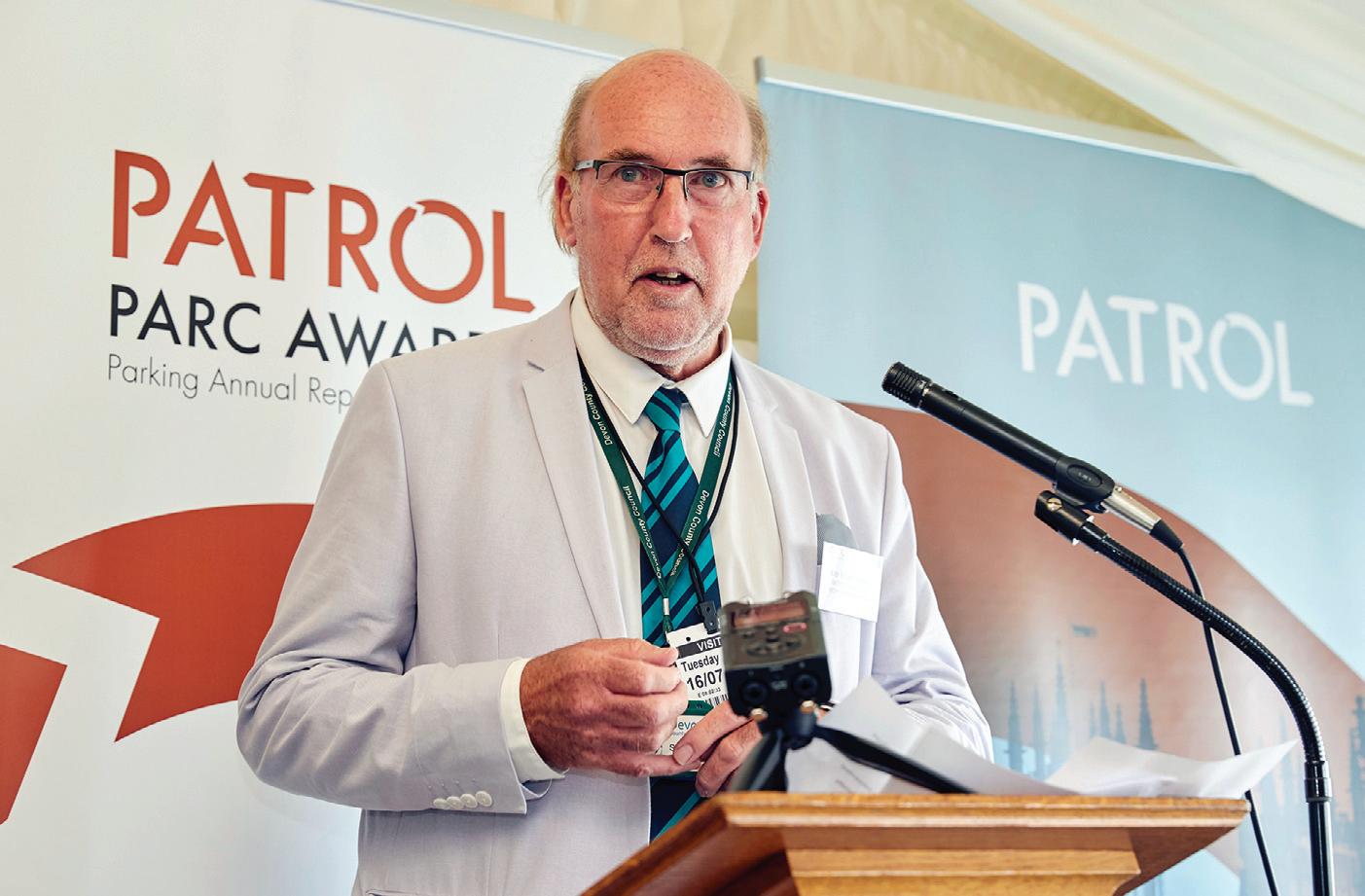
enforcement, and for the ability to issue most enforcement documents digitally, as standard.
PATROL has a unique understanding and perspective on local
when the levels were last set.
The passage of time has also had a diminishing impact on the deterrent impact of the penalty due to rising inflation, with more than half of our member authorities believing the current levels are ineffective and over two-thirds reporting frequent repeat offenders that ignore restrictions altogether. This situation not only undermines the effectiveness of enforcement, impacting the public and law-abiding motorists, but also places additional financial strain on councils already stretched to the limit.
In response to the research findings, PATROL has put forward several recommendations to the DfT and MHCLG.
We are advocating for an increase in civil penalty levels for restrictions enforced under the Traffic Management Act 2004, and for PATROL to have the statutory ability to review and adjust these levels periodically, much like the system in London. Furthermore, we are calling for the introduction of automatic number plate recognition (ANPR) powers for civil
Our discussions with the former government received a positive initial response, so we look forward to advancing these recommendations with the new administration. The aim is to ensure that parking enforcement is fair, effective and financially viable, now and in the future, thereby improving compliance and enhancing the transport environment for all road users.
I’d like to highlight PATROL’s engagement with the DfT’s consultation on restricting the generation of surplus funds from traffic contraventions. Particularly considering our research findings, PATROL has stressed to the department that any policy changes should consider the broader impact on local authorities’ abilities to manage traffic effectively.
Authorities that do generate a surplus are likely to rely on it to cover operational costs and fund essential transport services. Restricting their ability to generate these funds could undermine the financial viability of enforcement services and force cuts on activities, again leading to decreased compliance, reduced safety and less fairness for motorists who follow the rules.
It should go without saying that PATROL and its members firmly believe the aim of traffic enforcement should be to ensure compliance and safety, not generate revenue. Nevertheless, any surpluses generated are still beneficial to local transport projects, benefitting the community at large.
Cllr Stuart Hughes is chair of PATROL
PATROL is committed to sharing best practice and raising standards, says Laura Padden
The general election result has ushered in a new era and we look forward to engaging with the departments and incoming ministers on new and emerging policies – with the hope that they are supportive of our ideas for industry wide improvements. I work closely with the Traffic Penalty Tribunal’s chief adjudicator, Caroline Hamilton, to identify ways that we can improve public information about the issues that most affect motorists and councils within our sphere of work.
Earlier this year, the Traffic Penalty Tribunal and PATROL launched the Traff-iCase website, which brings together key cases from the different UK traffic tribunals into one place for the first time as a ‘go-to’ resource, providing clear and accessible information to motorists and other stakeholders.
The site has already seen significant user traffic since its launch, demonstrating the keen interest in civil enforcement, judicial outcomes and information on traffic law.
We are now looking at how we can expand the platform and our approach to include learnings from the private sector, which is something we will work with the British Parking Association (BPA) on in due course.
Using findings from judicial decisions to educate motorists and councils is at the heart of what we do, which brings me neatly on to something I am particularly excited to introduce – PATROL’s new authority awards programme, the Driving Improvement Awards. As an evolution from our longstanding PACER Awards, which focussed on improving local authority annual reports, the Driving Improvement Awards have been developed to inspire and promote public engagement on the issues that matter the most to the teams delivering civil parking enforcement.
Through the new awards programme, our member authorities are offered the chance to submit a bid for funding to develop a public awareness campaign or activity to effect real change, with bids encouraged around a specific theme each year, based on current or pressing events, issues and trends in our industry. Our ethos in awarding the funding is that the winning campaign should produce a model or materials that can subsequently be used for free by other councils. In this way, these councils can replicate the success in their own communities, reducing the burden on their individual finances and drawing widespread attention to important issues.
To this end, the PATROL team will support winning authorities to implement their campaigns and activities, ensuring that the outcomes, learnings and best practice are shared across the cohort. This collaborative approach elevates successful initiatives to a national level, amplifying their impact further.
In the awards’ first year, PATROL’s Advisory Board has chosen the
Iain Worrall discusses judging the Driving Improvement Awards
The response to our call for submissions has been overwhelmingly positive, with some fantastic, impactful proposals put forward for campaigns and activities to address this year’s theme. The authorities’ efforts exemplify the spirit of creativity and dedication that the Driving Improvement Awards seek to celebrate.
Each of the authority bids was judged against the criteria from the original brief. This involved a discussion around

theme of abuse experienced by civil enforcement officers and other enforcement staff. This focus was chosen in response to the consistent and high-profile negative public sentiment towards parking and traffic enforcement across authorities, a problem that has been systemic for many years.
Recent research from the BPA highlights the alarming frequency of such incidents, with 84% of parking managers reporting monthly verbal abuse and 20% reporting physical abuse occurring just as frequently. The severity of these attacks is deeply troubling, with some incidents involving vehicles being driven at officers and other physical attacks leading to serious injuries.
Back office staff also experience verbal and sometimes face-to-face abuse from the public, whether over the phone, via email or within council walk-in centres. This behaviour not only compromises the safety of staff and hampers the effectiveness of enforcement efforts, but it also presents a barrier to recruitment to public-facing teams.
PATROL hopes that by focussing on this topic for the first year of the awards, we will play a part in changing the public perception of the role of enforcement in our communities, and improve the working lives of those involved in its delivery.
PATROL’s overarching aim for the Driving Improvement Awards is to tackle key issues by helping to create engaging content that drives improvement in either the delivery of services, engagement with the public, or public perception and understanding.
It is also my intention that over the coming years we will be able to grow the pot of funding available through partnerships or sponsorship, in order to deliver long-lasting change and improvements to civil enforcement and raise public awareness of its many benefits.
Laura Padden is director of PATROL
feasibility, innovation and potential impact. Crucially underpinning this discussion was an assessment of the bids with regards how replicable the proposed campaign or activity is for activation by all PATROL authorities.
PATROL has chosen two winners this year and, in the spirit of sharing best practice through the organisation and across authorities, we are proposing they collaborate on a shared campaign to maximise the reach and impact of their ideas. Both authorities proposed creative and thought-provoking campaign concepts, the involvement of education and community outreach, and a thorough assessment of how they would measure the success of their campaign – all factors that played a part in the decision making.
It was also, however, the combination of one authority’s multi-stakeholder approach with the other’s proposal to develop a suite of interactive resources, which we feel would deliver a further compelling edge when combined. PATROL also feels the nature of the interactive assets would be a natural fit for wider distribution and reuse by other PATROL authorities in the form of a materials toolkit to rebadge and repurpose. We are looking forward to working with both authorities to bring together and shape the two campaigns and their respective tactics into a form that offers most value, both for external distribution and across the authority cohort.
Iain Worrall is PATROL’s stakeholder
Training centre creates course addressing electric vehicle fires
The International Fire Training Centre (IFTC) is offering an electric vehicle fire course at its facility at Teesside International Airport in Darlington.
The course aims to provide emergency responders with practical training in managing EVinvolved fires and raising critical safety awareness. The course addresses the challenges first responders face in keeping up with the rapid advancements in EV technology and the associated risks of lithium-ion batteries.
Managed and operated by Serco, the ITFC course features an ‘EV fire simulator’ designed to facilitate multiple scenarios for effective and repeatable training.
The simulator includes electric vehicle thermal runaway and fire simulation, enabling fire personnel to practice fire suppression techniques, such as

to develop the simulator. Lown, who has 30 years in the UK fire and rescue service, specialises in vehicle fire investigation and alternative-fuelled vehicles (AFVs) and EVs.
Working with Bridgehill Fire Blankets, he has developed a new training tool.

vehicle fire blanket application and under chassis cooling.
Non-fire first responders will also participate in precautionary measures like vehicle fire blanket application and observe live fire exercises, experiencing the simulated conditions of an EV fire.
Ryan Flaherty, Serco training and resilience director, said: “With almost one in four – that’s 14 million – electric vehicles already in operation around the globe, it’s never been more
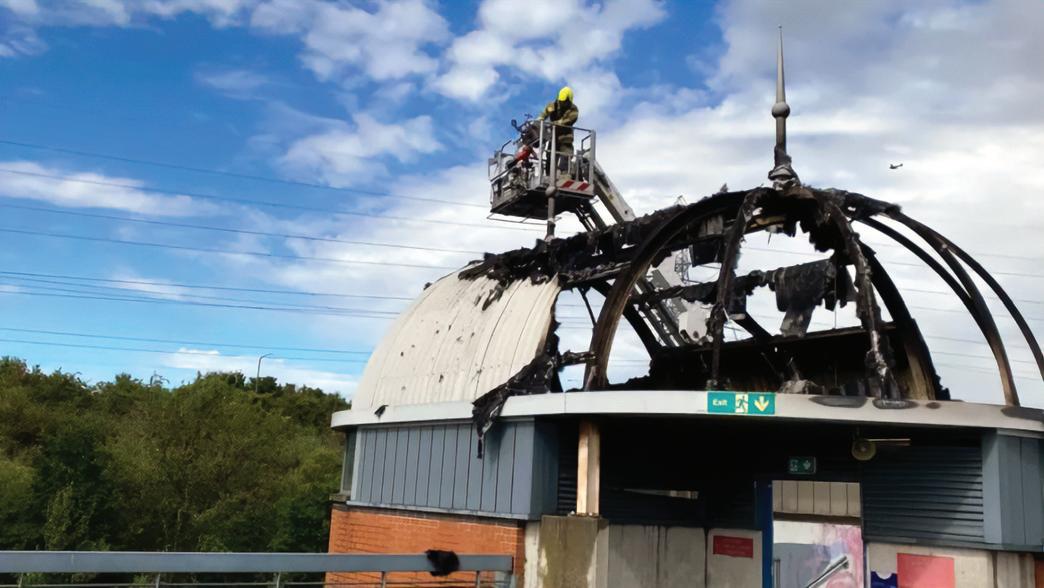

A teenager was arrested on suspicion of arson after a fire at the Lakeside shopping centre in Essex. The blaze broke out in a car park stairwell at Lakeside before 3pm on Sunday 7 July.
Essex Police said it was notified after an investigation revealed suspicious circumstances.
A 17-year-old boy from Grays has been questioned and released on bail while inquiries continue.
Two floors of a Surrey multistorey car park were closed to the public following a fire.
Levels four and five of the Main Square car park in Camberley were closed to allow a structural investigation to assess the extent of the damage. Surrey Fire and Rescue Service sent three
engines to the scene at 12.45pm on 11 June.
The first three floors of the Surrey Heath Borough Council car park were reopened later on Tuesday and those who parked their car on a higher level were able to leave. The fire service said there were no reports of any injuries.
important to know how to safely contain and suppress electric vehicle fires.”
The new course aligns with the IMI National Occupational Standards EV02a and EV02b for Electric Vehicle Response, providing awareness and knowledge of EV thermal events and fires under realistic training conditions.
The IFTC has partnered with Martin Lown BEM from FireWiseUK Learning Academy
Lown said: “With the worldwide green agenda dictating the transition to zero emission vehicles, and the subsequent rise in AFVs on our roads, vehicle risk is changing rapidly, as numbers of AFVs increase, dramatically.”
The IFTC has offered its expertise and infrastructure since 1981, training thousands of delegates annually, with clients ranging from NATO to various international nations, utilising its multiple fire simulators for real-time emergency exercises.
The 9-acre site at Teesside International Airport features appliances for training exercises and an on-site water treatment facility that processes runoff, allowing for the use of diverse fire extinguishing media, including foam and powder.
A shopping centre in Cheltenham was evacuated after a vehicle fire in the car park.
Emergency crews responded to the incident at Regent Arcade following a fire in the attached multi-storey car park.
The incident was reported at about 2.45pm on Monday 1 July.
The Regent Arcade confirmed that the building’s evacuation procedure was rolled out.
A spokesperson for Gloucestershire Fire and Rescue Service said: “We were called at 14:45 to a fire in the car park of the Regent Arcade in Cheltenham.
“Three fire engines from Cheltenham attended the scene and used four breathing apparatus, a hose reel and a dry powder fire extinguisher to put out the fire. The stop message was received at 16:32.”


Steeton and Silsden station gets new multi-storey car park
Rail passengers can now make use of 245 parking spaces at Steeton and Silsden station in West Yorkshire after work on the upgrade was completed.
The £7m scheme is part of the West Yorkshire Combined Authority’s multi-million-pound Rail Park & Ride Programme, which is designed to increase access to train services by providing more station parking, as well as helping to reduce congestion and carbon emissions.
The combined authority has worked with rail operator Northern and Bradford Council to deliver the new car park, which is free to use, supports future electric vehicle charging infrastructure and has an accessible lift to all levels.
Tracy Brabin, Mayor of West Yorkshire, said: “This new car park is a fantastic addition to
Bournemouth Airport terminal

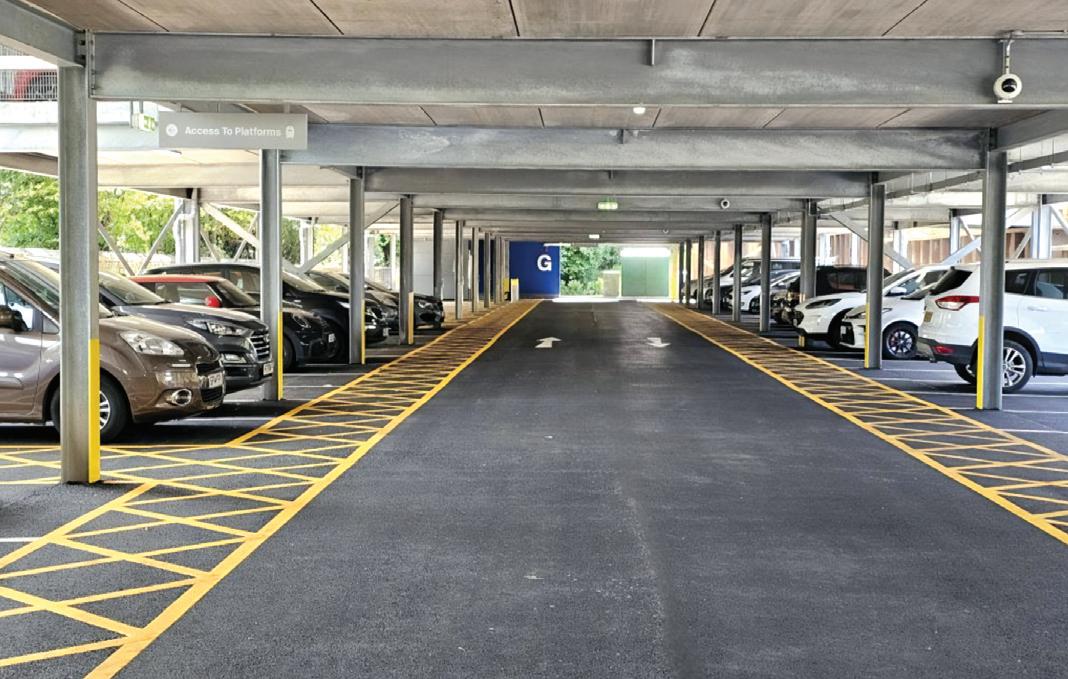
the railway station and the wider area. It will encourage more people to use the train and leave their cars at the station, reducing congestion and pollution in the area and helping us towards our ambition of becoming a net zero carbon region by 2038.”
Kerry Peters, regional director for Northern, said: “We’re really pleased to see this car park has opened as it will allow more people to leave their vehicles at the station and enjoy a fast and
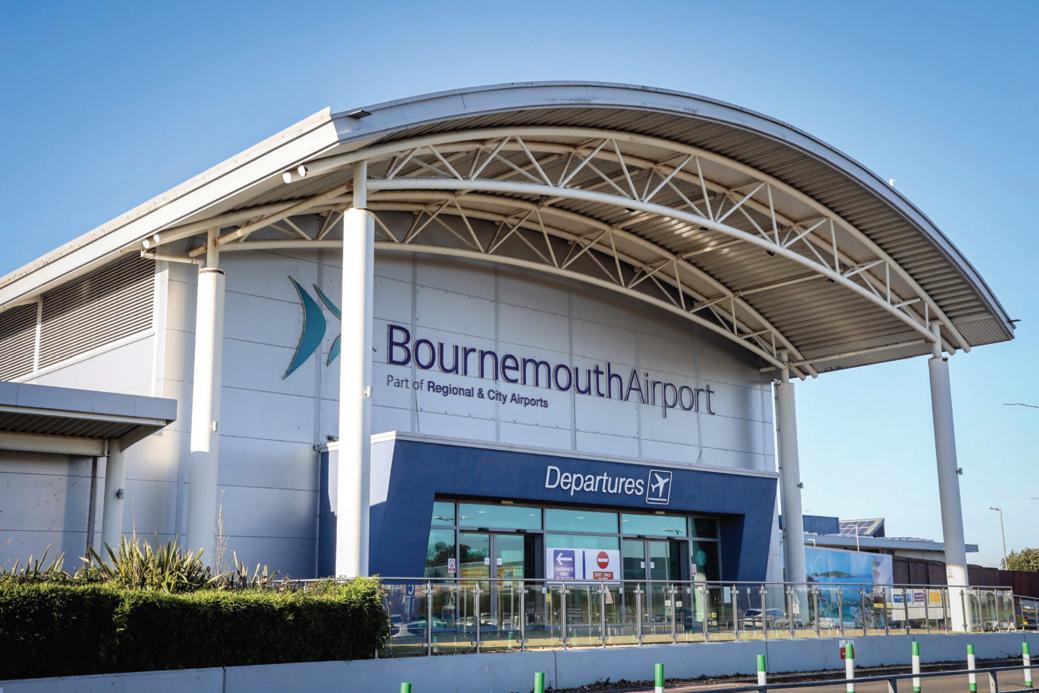
Bournemouth Airport wants to expand its parking provision to cope with growing passenger numbers. The airport expects its current total of 2,600 spaces will approach capacity during the summer season, so has submitted plans for 900 parking spaces.
The proposals would see car parking provided on the site to the south of the runway.
Access would remain via Hurn Court Lane.
The planning application maintained that there would “not be any likely effects which would be deemed significant”
on the local road network and traffic flows.
Earlier this year
Bournemouth Airport announced it was investing more than £5m in facilities, equipment and staff to cater for the expected growth.
The airport is projected to handle more than one million passengers in the year to March 2025, the highest figure since 2008. In March airline and tour operator Jet2 announced it would offer flights and package holidays from the Dorset airport from next year.

Steeton & Silsden station’s car park
affordable journey to the likes of Leeds, Bradford and Skipton on one of our services.
“The £7m investment from the Combined Authority has provided our customers with a fantastic new facility that is free to use, safe and accessible.”
Cllr Alex Ross-Shaw, Bradford Council’s executive member for regeneration, planning and transport, said: “The new multi-storey car park makes it much easier and more appealing for com-
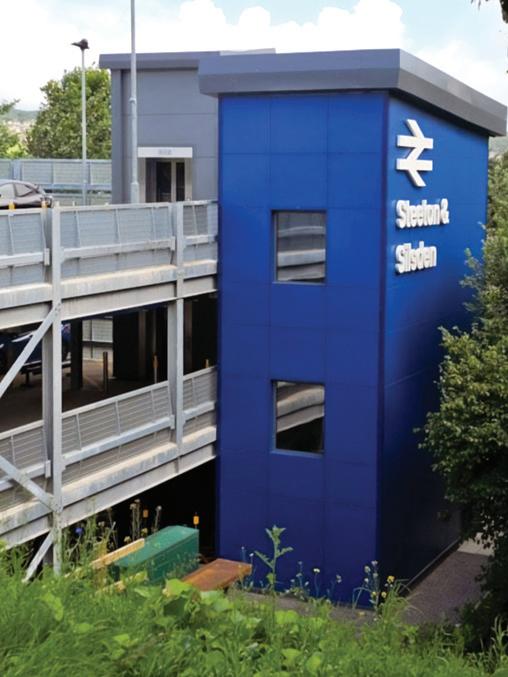
muters to take the train from Steeton and Silsden and the nearby surrounding areas.”
The scheme experienced some delays and increase in costs due to factors like working next to a live railway line and the discovery of casings from a World War II munitions factory on the site.
The completed parking facility features lighting on all levels and a new footpath linking it safely to the nearby Station Road.
Real estate investor and developer Sixpenny Group plans to create an electric vehicle super charging hub at the Manor Royal business park in Crawley, West Sussex.
The project will see a redundant 19,000 square foot office block demolished and replaced with a 28 charging bay hub and two prime retail and restaurant units, which the developer is letting to a national supermarket and food-on-the-go operator.
Acquired off market, the one-acre site is on Gatwick road in the heart of the Manor Royal Business District, home to over 600 businesses employing over 30,000 people.
Planning permission for the charging hub is currently being
sought and it’s anticipated the facility will be open to customers in early-to-mid 2025. It will provide 28 charging bays with a mixture of 22, 180, 240 and 400 kilowatt chargers, with eight dedicated stations for long wheelbase commercial vans.
The hub will also feature a high specification BESS (Battery Energy Storage System) capable of providing one megawatt output for 2 hours (2 MVA). In addition to 5,500 square feet of retail and restaurant units, the site will also feature a ‘pocket park’ providing a space for customers and the public.
Sixpenny Group is developing the new facility with joint partners Arcus-PCD.

Source: Notes
Description: Number of recommendations
Climate Change Committee says UK government must take bold action decarbonise transport, buildings, industry and agriculture
The UK is off-track on its journey to achieve net zero, says the Climate Change Committee, whose latest pessimistic assessment is that only a third of the emissions reductions required to achieve the country’s 2030 target are currently covered by credible plans. There is a positive story in that the country’s emissions are now less than half the levels they were in 1990, but the committee points out this is largely due to the phase out of coal and the ramping up of renewables.
Unveiling its 2024 UK Progress Report, the committee warns that the plans put in place from the previous government will not deliver enough action. The committee says there is now a need for an ambitious action not just in the energy sector, but also across transport, buildings, industry and agriculture.
The Climate Change Committee is an independent non-departmental public body, formed under the Climate Change Act to advise the United Kingdom and devolved governments and Parliaments on tackling and preparing for climate change.
The Climate Change Committee, drew attention to what was an ambivalent position on decarbonising the economy held by the Conservative government, and calls on the new Labour administration to provide clarity.
The committee states: “The committee has drawn attention to the damage done by the previous government’s policy rollbacks. These have increased the gap between the UK’s plans and its targets, leaving us further off track. The broader messaging, both domestically and internationally, also caused significant uncertainty about the country’s commitment to net zero. The committee urges the new government to address this, with a clear commitment to the net zero transition, backed with rapid policy action and a
sharp-eyed focus on removing barriers.
“Polling shows that the UK public has no appetite for climate division. Until last year, as well as showing domestic leadership, successive UK governments had played a leading role in international climate diplomacy and could fairly claim to have accelerated action worldwide. The committee hopes the new government will take the opportunity of COP29 in November to re-establish UK leadership on the global climate stage.”
Now is the time for ambitious action
Professor Piers Forster, interim chair of the committee, said: “The country’s 2030 emissions reduction target is at risk. The new government has an opportunity to course-correct, but it will need to be done as a matter of urgency to make up for lost time. They are off to a good start. Action needs to extend beyond electricity, with rapid progress needed on electric cars, heat pumps and tree planting. The transition to net zero can deliver investment, lower bills, and energy security. It will help the UK keep its place on the world stage. It is a way for this government to serve both the people of today and the people of tomorrow.”
Much of the low carbon technology needed is already available, says the committee. Yet almost all its indicators for the scale-up and roll-out of that technology are off-track, with rates needing to significantly ramp up. By 2030:
• Annual offshore wind installations must increase by at least three times, onshore wind installations will need to double and solar installations must increase by five times.
• Approximately 10% of existing homes in the UK will need to be heated by a heat pump, compared to only 1% today.
• The market share of new electric cars needs to increase from 16.5% in 2023 to nearly 100%.
The Climate Change Committee has produced a list of actions including making electricity cheaper, reversing recent policy rollbacks, and ramping up tree planting and peatland restoration.
The committee will publish its advice on the Seventh Carbon Budget and an updated Path to Net Zero early in 2025.
The Climate Change Committee’s recommendations
• Make electricity cheaper. Removing policy costs from electricity prices will support industrial electrification and ensure the lower running costs of heat pumps compared to fossil-fuel boilers are reflected in household bills.
• Reverse recent policy rollbacks. Remove the exemption of 20% of households from the 2035 fossil-fuel boiler installation phase-out, address the gap left by removing obligations on landlords to improve the energy efficiency of rented homes and reinstate the 2030 phase-out of new fossil-fuel car and van sales. The damage of these rollbacks can be limited by quickly reinstating these policies.
• Remove planning barriers for heat pumps, electric vehicle chargepoints and onshore wind.
• Introduce a comprehensive programme for decarbonisation of public sector buildings.
• Effectively design and implement the upcoming renewable energy CfD auctions. Ensure funding and auction design for the Sixth and Seventh Allocation Rounds are appropriate to deliver at least 50GW of offshore wind by 2030.
• Accelerate electrification of industrial heat. Strengthen the UK Emissions Trading Scheme to ensure that its price is sufficient to incentivise decarbonisation and that support is available for a rapid transition to electric heat across much of industry.
• Ramp up tree planting and peatland restoration. Tree planting must be scaled up in the 2020s for abatement to be sufficient for later carbon budgets and net zero. There must be no more delays to addressing the barriers to delivery.
• Finalise business models for large-scale deployment of engineered removals. Finalise and open to the market the business models for engineered removals.
• Publish a strategy to support skills. Support workers in sectors which need to grow or transition and in communities that may be adversely impacted.
• Strengthen National Adaptation Programme 3 (NAP3) with a vision that sets clear objectives and targets and reorganise government adaptation policy.
The Zero Emission Vehicle (ZEV) mandate came into effect in October 2023. This sets minimum EV sales targets for each manufacturer, rising from 22% in 2024 to 80% in 2030 for cars (10% to 70% for vans). The mandate was co-developed by the Department for Transport, the Scottish Government, the Welsh Government and the Northern Irish Department for Infrastructure. It came into force in Great Britain at the start of 2024, while Northern Ireland has signalled its intention to join.
The mandate imposes strong financial incentives for delivery, which should help build on market progress to date to give confidence to delivery of a large share of the abatement required from the surface transport sector.
The number of EVs being sold continues to grow, but their share of the overall new car and van market has not sped up as expected and many manufacturers will require substantial growth in their monthly EV sales totals to reach their mandated targets this year. The mandate does include some provision for manufacturers to borrow against future overperformance or against overperformance on the accompanying nonZEV emissions standards. There is therefore a risk that the mandate’s targets may not be met in the early years.
In September 2023, the UK government announced that the 2030 end-ofsales date for new internal combustion engine vehicles was being pushed back to 2035. While the direct impact of this on emissions is relatively small, given that the original plan would still have allowed emitting hybrid vehicles to be sold during this period, the mixed signals it sends to consumers and investors could be more impactful. The risk is that the public and automotive companies perceive a weakening of government commitment to the EV transition, which could undermine consumer confidence and/or jeopardise some inward investment relating to EV manufacturing or charging infrastructure.
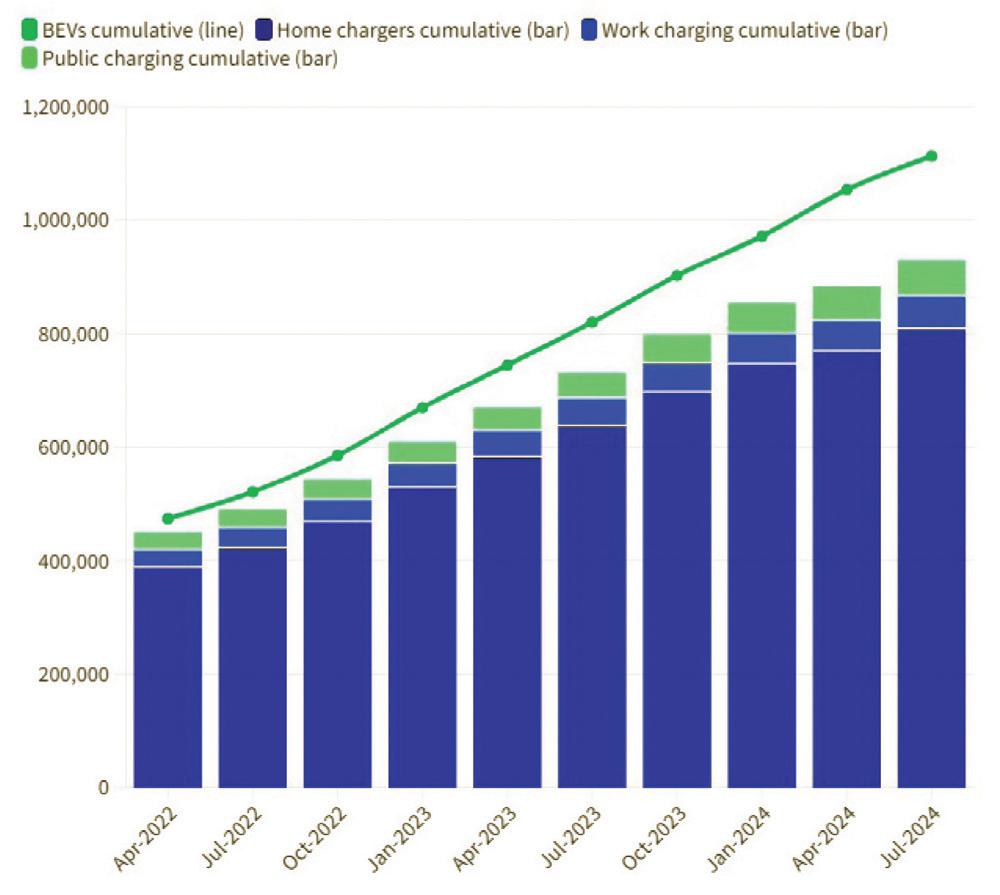
Nearly a million charging points have been installed, almost one for every fully electric vehicle in the UK, says the body representing the chargepoint operator sector. Working with transport research organisation New AutoMotive, ChargeUK’s report Powering Ahead to 2030 shows that there are over 930,000 public, home and work chargers supporting 1.1 million fully electric vehicles (EVs). The whiter pape suggests, if current growth continues, the roll-out of public chargers will track ahead of EV adoption meaning there will be over 300,000 public chargepoints in the UK by 2030.
However, to enable the charging sector to stay on track for 2030, Powering Ahead to 2030 argues that the new government must take steps to remove grid, planning and permitting barriers; make owning and charging an EV easy and affordable; and clarify and speed up existing public subsidy schemes.
Labour promised in its general election manifesto to “accelerate the roll-out of chargepoints”, but it has not detailed how it will do this or whether it will stick to the 300,000 target. ChargeUK is calling on the new government to:
• remove grid, planning and permitting delays
• include renewable electricity in the Renewable Transport Fuel Obligation (RTFO)
• make charging and owning an EV as easy and affordable as possible by equalising VAT on charging, encouraging lower cost electricity, improving signage and supporting drivers to access EVs, whether through the new, second-hand or fleet market
• maximise private investment, by clarifying the Rapid Charging Fund, speeding up the Local EV Infrastructure Fund
• address increases in standing charge
• develop HGV charging provision.
Vicky Read, chief executive of ChargeUK said: “In little more than a decade, the UK’s charging sector has grown to become a major player in the green economy, providing the infrastructure that more than a million EV drivers rely on today and scaling fast to deliver the charging needed through to 2030 and beyond.
“Convenient and affordable charging for all is key to the UK’s switch to EVs. This new analysis will give current and future EV drivers confidence that the charging infrastructure will be there for them. While the outlook is positive, there is still work to be done. Delivering what the UK needs by 2030 means continuing to grow at pace, ensuring that deployment ramps up in locations that have been hampered by delays, and ensuring the UK has a thriving EV market, so that investment in infrastructure continues at scale.
“ChargeUK’s members are committed to this, but we cannot do this without the backing of the new government, who we call on take the steps needed to remove delivery barriers, help us offer affordable charging and support our investment, as set out in our manifesto.”
Paythru reveals impact of complicated vehicle charging experiences
Electric vehicle drivers face many issues when it comes to booking and paying for chargers, according to a survey by payment specialist Paythru.
The survey of 200 EV drivers found many frustrations, which will need to be addressed to support faster EV uptake. The findings include:
• 87% of EV drivers use multiple payment options at different chargepoints, despite a preference for universal solutions
• 87% have had to download a brand new app in order to pay
• 61% have left the chargepoint because of unacceptable payment options
• 80% have experienced app payment problems due to mobile connectivity
• 49% have waited more than a day for a pre-authorisation fee to be refunded.
Users still use multiple payment methods, despite an often-stated preference for universal solutions. The survey found that only 13% of people have a single payment option they use 100% of the time. Most have three or
more regular options that they switch between, such as contactless and a couple of different apps, each making up less than a quarter of their overall usage.
Sara Sloman, Paythru’s chief strategy officer, said: “This level of variation suggests the majority of users are being forced to use multiple payment options to navigate an overly complex charging system.”
The survey shows a surprising frequency of problems at the charger. 87% of respondents said they’ve had to download a new app at the charging point at least once, in order to pay. 80% have faced app payment problems due to mobile connectivity issues. 56% have had their card rejected. Furthermore, 45% of
drivers said they’ve had to phone up to make a payment, and 61% have left the chargepoint because of unacceptable payment options.
The survey found that pre-authorisation of payments – where money is reserved against a driver’s payment card prior to the charge, with the charge then deducted – is a major irritation.
Some 90% of respondents said they have been asked for preauthorisation when charging, and 80% have experienced at least one issue with it. These include being unclear about what they were committing to (49%), waiting more than a day for a pre-authorisation fee to be refunded (49%), and multiple pre-authorisation fees on their
Companies have been invited to take part in a trial of next-generation vehicle-to-grid (V2G) electric vehicle workplace charging technology, which offers the opportunity to lower carbon emissions and reduce energy costs.
Trial participants will be provided with a free V2G EV charger which can be kept after the end of the project. V2G technology enables EVs to be charged at times when electricity costs are low, and then put energy back into the grid, or into a building or even another EV, when electricity costs are higher.
Businesses that are looking to demonstrate leadership in sustainability are invited to apply to take part in the V2VNY project, which aims to demonstrate, test and refine V2G technology, pushing the boundaries of charging technology and paving the way for its broader adoption.
The project, which is part of the V2X Innovation Programme, is being led by Hangar 19, in partnership with DriveElectric
DriveElectric is an electric vehicle leasing company that has been helping organisations and individuals to adopt EVs to save money, lower emissions and transition to low carbon energy since 2008. CrowdCharge, an AI-powered technology with patented optimisation tools, is seeking to unlock maximum value from V2X services across individual vehicles to fleets and workplace ecosystems, enabling them to better predict and manage usage, save money and carbon.
Other project partners are Grid Beyond, Oxfordshire County Council, Electric Corby and JLR. The car maker will be providing prototype EVs for use in the trial.
This is one of the first V2G trials in the UK to use AC charging with the latest generation of EVs featuring ‘vehicle to load’ technology; most previous V2G trials used Nissan and Mitsubishi vehicles with CHAdeMO DC charging technology. Trial participants need at least two electric vehicles on their fleet which feature vehicle to load technology from the brands of Genesis, Hyundai, Kia or MG.
card for a single charge (36%).
Keith Brown, Paythru’s managing director, said: “As we move from early adopters to mainstream EV drivers, expectations will rise and intolerance will fall for the type of problems highlighted by this survey, People have little patience for complex and cumbersome EV charging transactions.
“The charging experience remains overly complicated, creating what we call ‘payment anxiety’: the feeling of going to charge and knowing there’s a very real chance – even if it’s a small one – that the chargepoint won’t work the way you want for one reason or another.
“Until now, the EV industry has understandably focussed on hardware. But the problems we see causing driver frustrations now are mostly linked to the software used in the charging process, and the experience that comes with it. The time has come to concentrate on designing software that will solve most, if not all, of the issues raised in this report, in order to make EVs accessible to all.”
The data for Overcoming Payment Anxiety in EV Charging was gathered via an online survey of 200 EV drivers over April and May 2024, in partnership with the EV Café.
Businesses will be provided with a free 7kW AC bi-directional charger with two sockets and a software package to optimise the charging, worth in total over £5,750. Participants can keep the charger after the trial but will have to pay for the installation of the charger and for continued use of the software after the end of the trial.
Mike Potter, chief executive of CrowdCharge and DriveElectric, says: “The UK has a huge and largely untapped battery storage capability in the form of over one million electric vehicles that spend most of their time parked up. Using this resource can help reduce the load on electricity networks at peak times, as well as lowering costs and carbon. This project will trial how the latest EVs can be used as mini power plants to benefit businesses, electricity operators and the country as a whole.”
The V2VNY Phase 2 project, part of the V2X Innovation Programme, is funded by the Department for Energy Security and Net Zero (DESNZ), and delivered by Innovate-UK. The V2X Innovation Programme is part of the up to £65m Flexibility Innovation Programme, funded from the £1bn Net Zero Innovation Portfolio.
Public funding designed to encourage private investment
The Scottish Government will provide over £7m funding with a focus on bringing electric vehicle charging to more rural areas.
Aberdeen City Council, Aberdeenshire Council, The Highland Council, Moray Council and Dundee City Council will all receive grants .
The new funding will enable the local authorities to work with the private sector to grow Scotland’s public EV charging network..
Transport secretary Fiona Hyslop said: “I’m pleased that the Scottish Government is providing over £7m in targeted support to attract in further private investment in our publicly accessible electric vehicle charging network. The scale of our ambition to decarbonise transport cannot be met alone and I expect that our commitment for approximately 24,000 additional public chargepoints by 2030 will largely be met by the private sector.
“This can only happen, however, if the conditions exist to support this investment – which is exactly what our Electric Vehicle Infrastructure Fund is
Transport secretary Fiona Hyslop and Aberdeen Council’s Jim Savege opening the new Myrekirk hub

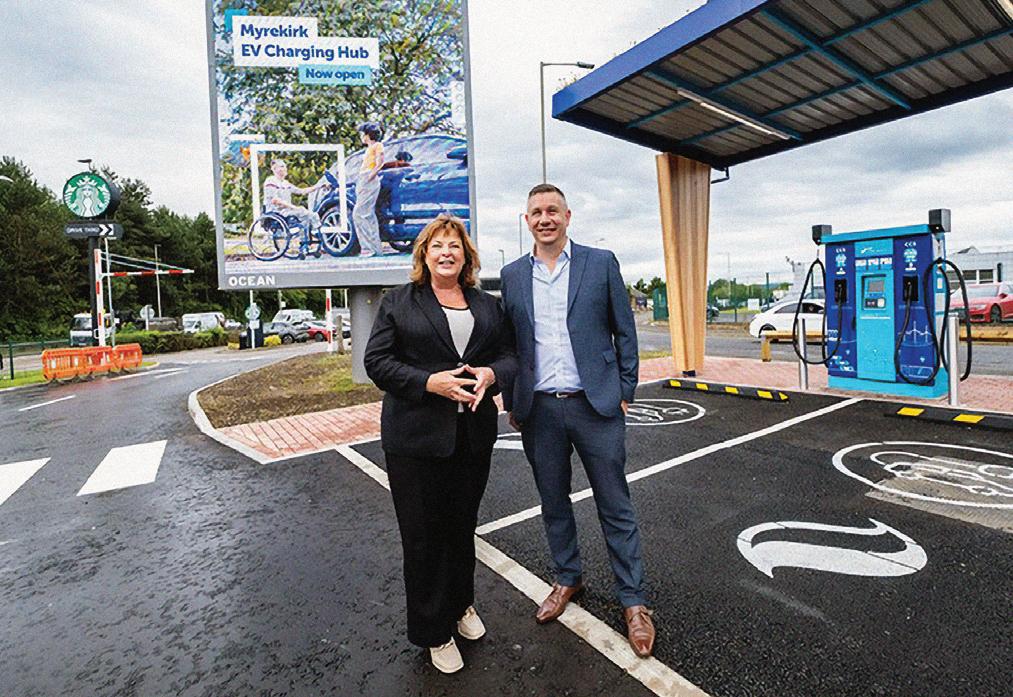
An electric vehicle charging hub, created by SSE on the Myrekirk Roundabout site in Dundee, has opened. The hub features a total of 24 ultra-rapid charging bays with a total capacity of almost two and a half megawatts.
Eight of the bays are powered by charge units of up to 360kilowatts, capable of delivering up to 60 miles of range in just three minutes. The remaining 16 bays comprise 150-kilowatt charge units, sufficient to deliver just under 8 miles of range per minute of charging to a standard family car.
Additionally, the project features a green roof populated with sedum plants to enhance the biodiversity of the site. Green roofs provide habitats for insects and birds and help to filter pollutants out of the air.
working to achieve and with a particular focus in our rural and island communities. As a direct result of previous investment, per head of population, Scotland has more public EV chargepoints
than any other part of the UK, except London. We also benefit from more rapid public EV chargepoints than any other UK region. We have over 5,600 currently and we are well on target
Octopus Energy and EDF have joined forces to launch Electrify Britain, a campaigning organisation dedicated to driving down bills and eliminating emissions from home heating, transport and local communities through widespread electrification.
The energy companies argue that dependence on gas has cost the UK £75£80bn over the past two and a half years, according to calculations undertaken by the Energy and Climate Intelligence Unit (ECIU).
Transitioning to green electricity reduces Britain’s vulnerability to fossil fuel price spikes and inflation, say EDF and Octopus.
Electrify Britain wants the UK to unlock growth and investment by removing policy bottlenecks and seize the opportunities of being at the forefront of the clean energy transition: attracting investment, reducing our carbon emissions, driving growth and creating jobs locally.
The energy suppliers argue that environmental levies should be shifted from domestic electricity to household gas bills to incentivise families to shift to cleaner technologies.
UK electricity is at present four times
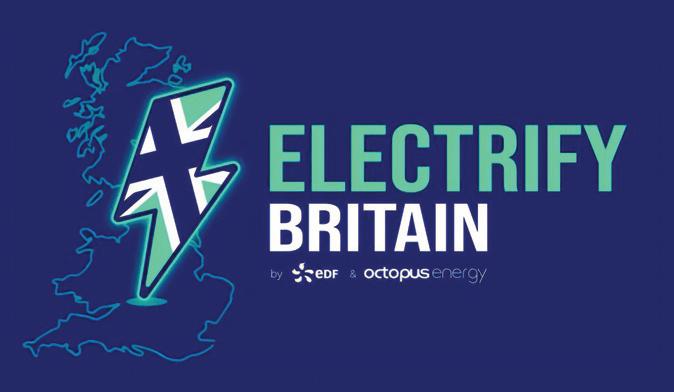
more expensive per unit than gas for households, in part because of levies added on to bills to support renewable energy such as new wind and solar farms, as well as supporting vulnerable households.
UK green taxes on electricity bills are deterring drivers from switching to electric vehicles, warn the energy suppliers.
Electrify Britain campaign also calls for new homes to be fitted with cleaner heating equipment, such as heat pumps instead of gas boilers. The energy companies argue that electrified homes that use heat pumps can save hundreds of pounds compared to gas boilers and EVs are already £1,000 cheaper to run annually compared to petrol vehicles.
Electrification is crucial to achieving net
to have 6,000 public EV chargepoints by 2026, through increasing private sector investment –with the private sector investing between £40 and £55m in public EV charging in Scotland in 2024 alone.”
Jim Savege, chief executive, Aberdeenshire Council spoke on behalf of the North of Scotland Partnership: “The commitment to and journey towards net zero is a significant challenge for us all, and one that requires leadership and activity at scale and pace. We are looking for a private sector partner to work with us and co-invest alongside us, a partner who has the same ambition and commitment to net zero, and who has the scale, reach and commitment to work with communities across the North of Scotland as we change our approach to travel and connectivity across the area.”
Vicky Read, chief executive of ChargeUK said: “ChargeUK’s members stand ready to deliver the Scottish Government’s vision of a just transition to electric vehicles, through investment in charging infrastructure at pace and scale. The first Electric Vehicle Infrastructure Fund awards are an important and welcome step in delivering the vision.”
zero emissions. Currently, transport accounts for 23% of UK emissions, and domestic heating contributes 15%.
Simone Rossi, chief executive of EDF in the UK, added: “We are launching a joint campaign because there is no time to wait. Britain’s energy market is still fragile to external shocks and, at the same time, we are seeing the impacts of climate change. We need more electricity but less CO2, we need to Electrify Britain.
“The first priority is to make electricity pricing fair by rebalancing policy costs, and the second is to ensure new homes are green and electric from day one. The future is electric, and we need to act now.”
Greg Jackson, chief executive of Octopus Energy, said: “Our businesses deal with millions of customers, and we know that when households go electric, they never look back because it’s cheaper and better.
“There’s been so much focus on electrifying generation, but not enough on electrifying end use, where customers can make significant savings. Electric cars on a smart tariff cost seven times less per mile than a petrol car. People with heat pumps usually pay less than those with gas boilers and they rate their heat pump higher. It’s time for us to seize the benefits of electrification for British customers.”
Urban Fox units provide ‘flat and flush’ footway when not in use
Urban Fox has installed its UEone retractable electric vehicle chargers in the Scottish city of Dundee. A launch event at the V&A Dundee design museum was the culmination of seven years of development and a two-and a half-year trial.
A total of 18 Mk5 UEone chargers have been installed across nine locations on behalf of Dundee City Council.
When not in use, the 7kW units auto-retract underground, leaving pavements clutter-free and so more accessible to pedestrians. By downloading the Urban Fox app, members of the public can summon the UEone to rise from the ground, power their EV and track their usage.
Oli Freeling-Wilkinson, chief executive of Urban Fox, said: “After more than seven years of
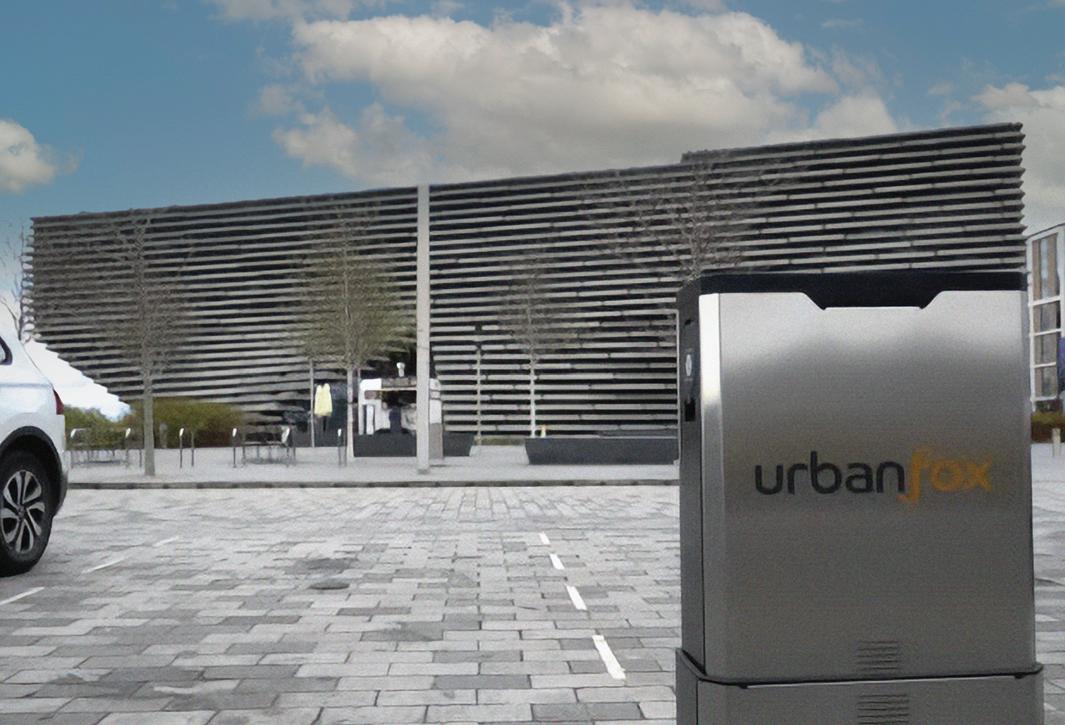
City Council fair work, economic growth and infrastructure convener, marked the launch of the UEone chargers in Dundee by saying: “Dundee City Council believes that it is important to deploy chargepoints that are as accessible as possible to deliver equitable access to EV charging solutions, and this innovation helps cater to the needs of our communities.”

intensive development and testing, we are immensely proud to unveil Europe’s only flat and flush charging solution that complies with the highest accessibility standards. At Urban Fox we are passionate about addressing the pressing need for nearhome EV charging infrastructure across the UK, to ensure that no one is left behind on the road to net zero.”
Urban Fox is a joint venture between Balfour Beatty Investments and Urban Electric Networks. Gavin Russell, chief executive officer of Balfour Beatty Investments, added: “The launch at the renowned V&A museum in Dundee highlights how innovative technology can significantly enhance, not detract from urban spaces and living.”
Cllr Steven Rome, Dundee
At the V&A Dundee launch event, Smart UK presented one of its new compact electric SUVs, the Smart #1. Smart UK is a joint venture between Germany’s Mercedes-Benz Group and China’s Geely Holding Group.
Jason Allbutt, chief executive officer of Smart UK, added: “Development of innovative yet practical near-home charging solutions is vital to ensuring that as many people as possible can benefit from the cheap, clean and convenient transport provided by electric vehicles.”


Software and supply chain specialist ByBox has partnered with electric vehicle charging provider, ZevHub to roll out smart lockers to a charging hub in London.
With the installation of 35 lockers at Southwark in central London, ByBox has partnered with EV charging supplier, ZevHub, to provide reliable fast charging for its field service customers collecting parts. Plans are already in motion to expand the number of lockers to 120 by the end of Q3.
ByBox has more than 45,000 smart lockers across more than 1,500 sites throughout the UK that enable field service engineers to securely collect and return equipment and parts from places of maximum convenience near their points of service.
ZevHub provides charging solutions for commercial vehicles, located in urban areas to ensure EV commercial vehicles have convenient access to charging stations wherever they go.
Andy Crees, chief operations officer at ByBox said: “We are delighted to partner with ZevHub, through our ‘locations partner’ LockerQuest and to bring our smart lockers to this EV charging station in central London. Our smart lockers are perfectly placed to allow users to pick up the essential parts they need for the day. This ultimately reduces unnecessary vehicle weight and increases electric vehicle range for customers looking to transition to an electric fleet.”
Evolt Charging has launched a new dynamic load management (DLM) system to optimise the distribution of energy between its EV chargers. The DLM system will enable chargepoint operators (CPOs) to install additional rapid and ultra-rapid charging units at existing sites without the need to secure additional energy capacity.
Evolt Charging currently has over 15,000 Evolve AC and Raption (rapid or ultra-rapid DC) chargers installed across seven of UK networks including Osprey, MFG, Be.EV and SSE Energy Solutions.
Anne Buckingham, managing director of Evolt Charging said: “With more than one million fully electric cars, vans and taxis on UK roads, and the increasing demand and greater availability of electric models, CPOs want to follow a new strategy of reviewing and expanding existing charging facilities.
“It was rare early on for there to be more than three or four at each location but with more EVs on the road there is now greater demand, and CPOs want to avoid drivers having to wait – or worse,
going somewhere else. Our new DLM system gives them the key to unlock the potential of existing sites without the pain and cost of securing additional power from the grid.”
When it comes to simultaneous EV charging, the DLM system is designed to optimise the power distribution from all of the chargers on the local network based on vehicle demand. This demand can vary depending on each vehicle’s maximum charge rate and battery percentage when charging. The DLM system recognises unused capacity at one charger and distributes it to another, allowing other vehicles to charge at an optimal rate.
The DLM system manages the energy load of Evolt’s chargers dynamically, prioritising the DC over AC products to ensure efficient charging for drivers.
Evolt’s DLM system can also be integrated with building energy management systems so that surplus energy – from across the wider site – can be shared with the EV charging infrastructure when it is not required.
KfW IPEX-Bank and NatWest join Octopus in funding operator
Electric vehicle charging network
Be.EV has announced a debt raise of £55m from NatWest and Germany’s KfW IPEX-Bank.
Octopus Energy Generation also continues its commitment to Be.EV, with further funding allocated as part of a £110m cash injection announced in 2022. Octopus’ investment was made on behalf of the Sky fund (ORI SCSp) it manages, which has a majority stake in Be.EV.
The new funds will be used to drive the expansion of Be.EV’s charging network, which it says is on track to operate more than 1,000 publicly accessible rapid and ultra-rapid chargepoints nationwide by the end of 2024.
The expansion aims to serve communities across the UK who do not have access to rapid and ultra-rapid charging. The majority of chargers the new money will support will be ultra-rapid.
The funds will also help Be.EV

nity and helps the government’s zero-emission vehicles by 2035 mandate. It proves that investors, both domestic and international, are confident in the UK’s transition to EVs and its importance in transitioning to a net zero economy.”

to cement its foothold in Manchester and the North West, where they’ve already installed more than 600 chargepoints for the 1 million registered plug-in vehicles in the region.
These chargers are accessible to all members of the public, with the 35,000 Be.EV members able to charge their EVs at discounted rates.
The chargers will be powered by renewable energy from Octopus Energy.
Asif Ghafoor, chief executive
Electric vehicle charging company Char.gy has secured an increase in commitment to boost the roll-out of its onstreet charging infrastructure across the UK.
The investment comes from the UK government-backed Charging Infrastructure Investment Fund (CIIF), a £420m public-private fund established by the UK government in 2019. The fund, managed by Zouk Capital, aims to accelerate the deployment of EV charging infrastructure across the UK.
CIIF’s initial £6.4m investment in 2021 in Char.gy was followed by a second round in 2022 bringing the total to £65m, and has now culminated in a third round commitment of over £25m, bringing the total investment to £100m.
The new investment will be used by Char.gy to grow its network from over 3,000 chargepoints to 100,000 by 2030, supporting the transition for up to 1 million drivers.
Char.gy’s chargepoint solutions, are designed and manufactured in the UK and
of Be.EV, said: “The financing from NatWest and KfW IPEXBank serves as a huge vote of confidence in our mission to provide reliable ultra-rapid charging to communities that have been left behind by the transition to electric vehicles.
“This sizeable commitment from NatWest and KfW and the continued support from Octopus Energy Generation paves the way for future investments in
Bruce Riley, managing director and head of energy transition at NatWest, said: “We are determined to play an active role in the UK’s transition to a low carbon economy and accelerating the take-up of electric vehicles is a crucial part of the transition. We are delighted to have supported Be.EV with this financing which will drive the growth of its UK public charging network.”
Andreas Ufer, member of the management board of KfW IPEX-Bank said: “We are glad to have won Be.EV as a new customer and thus help advance the e-mobility infrastructure in the UK. It is our mission to support the mobility transition with our financings in Europe and worldwide and drive the change


were first installed in the Buckinghamshire town of Marlow during 2018.
The company is now capable of deploying over 500 chargepoints monthly.
John Lewis, Char.gy chief executive, said: “We are delighted that with Zouk’s continued support, we will continue to expand our onstreet charging network, making EV ownership viable for more individuals reliant on public charging, supporting their transition to sustainable transport.”
George Ridd, partner in Zouk Capital, said: “Zouk’s increased commitment to Char.gy comes at a pivotal time as the EV charging market experiences exponential growth.”


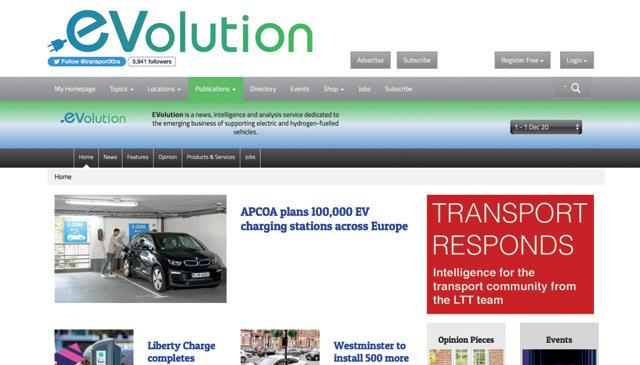



















































The Leading Independent Consultancy for all your parking solu琀ons
Established in 1991, with over 230 sa琀s昀ed customers comprising both public and private sector (including Local Authority and Health and Educa琀on establishments). Quality parking solu琀ons provided by our experienced in house specialists:
GIS mapping and surveying
• MTO site surveys and digi琀sing.
• On street TRO signs and lines: legality and condi琀on surveys (sample surveys also available).
• GIS mapping of TRO surveys, produc琀on of digital maps and TRO management for Order wri琀ng, upda琀ng and consolida琀on.
• Data extrac琀on and conversion of text based schedules to digi琀sed map based solu琀ons.
• Length of stay, usage, and occupancy parking surveys, both on and o昀 street.
• Compliance surveys and data analysis.
• Surveying and mapping of infrastructure assets.
Contact:


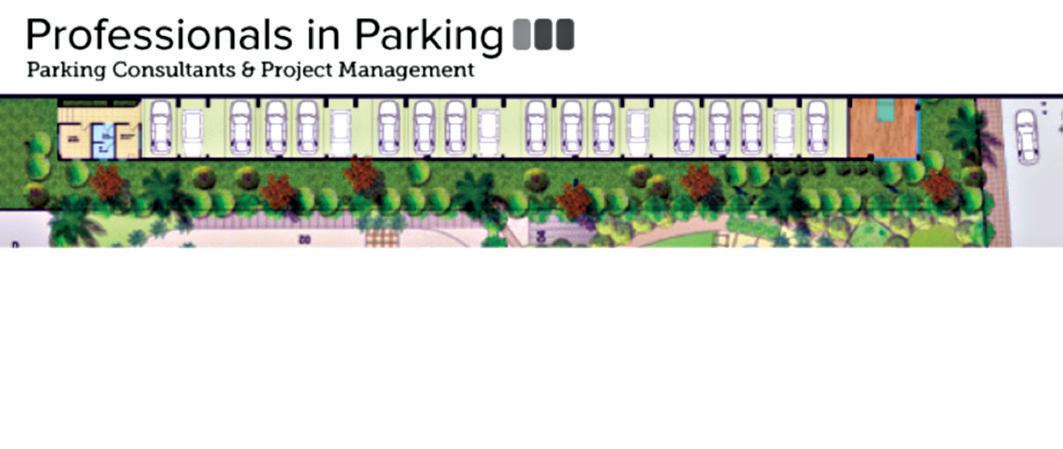
Consultancy services
• Financial appraisal and e�ciency reviews of parking service provision.
• Collabora琀ve working – joint no琀ce processing and shared enforcement.
• On and O昀 street tra�c regula琀on order wri琀ng.
• DPE and CPE feasibility studies and implementa琀on.
• Tari昀 reviews.
• DPE/CPE services speci昀ca琀on wri琀ng and tender evalua琀on. RTA
Peter Lowe B.Eng., C.Eng., M.I.C.E., FBPA
Tel: 01492585055 or 07900264137
Email: plowe@rtaassociates.co.uk
www.rtaassociates.co.uk

For more information on our services, please contact:
Lauren Appleby (North) lappleby@newlynplc.co.uk 07931 811088
Shaun Byrne (South) sbyrne@newlynplc.co.uk 07964 764099
